LOWER MAINLAND SCHOOLTEACHERS BROKE CONVENTION AND CHANGED THE SHAPE OF WHISTLER





























































































HOW A GROUP OF FIVE
FREE FROM WORRIES FAMILIAR
FACES Whistler’s new mayor
and council to be sworn in Nov. 114
SPOOKTACULAR Tapley’s Farm Halloween seeking donations
20
NATURAL TALENT Pemberton’s Martha Sturdy launches new exhibit
38 OCTOBER 20, 2022 ISSUE 29.42 WWW.PIQUENEWSMAGAZINE.COM


















DEAR CUSTOMERS,






We value your patience as we continue with a renovation project for Nesters. Open 8am to 8pm daily.












Pharmacy
Wellness






PRESCRIPTIONS


WHILE YOU SHOP 8am to 6pm. 7 days a week.

Ergogenics offers clean supplements that are free from artificial sweeteners, additives, preservatives, colours, fillers, gums, and binders. They use real food ingredients that are healthy for you and your family.Their products contain only carefully selected organic and non-gmo ingredients. Come try Ergogenics for an effortless and delicious addition to your


Ergogenics diet and lifestyle





Nesters Market 604.932.3545 nestersmarket.com 7019 Nesters Road (Just 1 km north of Whistler Village) 2021
&
Prices Effective At Whistler Nesters From: Thursday, October 20th to Wednesday, October 26th, 2022. We reserve the right to limit quantities. Sale limited to stock on hand. Some items subject to Tax, plus deposit, recycling fee where applicable.
The Witsend sisterhood
How a group of five Lower Mainland schoolteachers broke convention and changed the shape of Whistler. - By Alyssa Noel

14 RESULTS ARE IN After a mostly quiet campaign, Whistler voters went with experience and compatibility on election day, returning all five local incumbents to office.
18
EXTRA MILEAGE
Pemberton’s beloved Mile One Eating House will stay in local hands after being acquired by Whistler Cooks.
20 SPOOKTACULAR The fan-favourite Tapley’s Farm
Halloween—one of the resort’s longest-running events at 39 years— returns to Whistler Cay this month.
26
FRESH START
Pemberton’s council table will feature a mix of new and familiar faces following the Oct. 15 municipal election.
34
OCTOBER SUMMER
Squamish runner James Newby found redemption under unseasonably sunny skies at the Whistler 50 on Oct. 15.

38
NATURAL TALENT
Pemberton artist Martha Sturdy’s new exhibit at the West Vancouver Art Museum replicates the unsettling atmosphere of charred forests.
COVER Wow, those are some inspirational women! These days we think nothing of a group of single ladies living the Whistler life together, but back in the ’50s, these four woman were trailblazers. Thank you to the women that came before us to pave the way! - By Lou O’Brien // lobriencreative.com
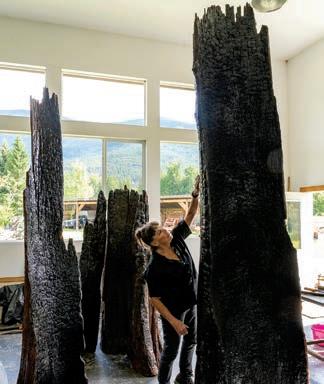
30 38 34 THIS WEEK IN PIQUE
4 OCTOBER 20 , 2022



















































































































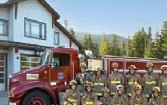
















LOCATED IN WHISTLER MARKETPLACE VILLAGE NORTH * Promotional voucher must be presented at time of purchase. Excludes applicable taxes, bottle deposits, tobacco, eco-fees & gift cards. This voucher has no cash value so we cannot give cash back. One voucher per person, per household, per purchase, per day. promotional voucher valid for in-store purchases only. This voucher is only validat Fresh St. Market in Whistler. 4330 Northlands Blvd Whistler, BC V8E 1C2 Expires october 27, 2022 PRICES IN EFFECT FRIDAY, OCTOBER 21 - THURSDAY, OCTOBER 27 399 /100g 599 lb Ocean Wise Wild Paci c Sockeye Salmon Fillets previously frozen Canadian Grain Fed Fresh Pork Back Ribs 13.21/kg Baked Fresh In-Store Mini Strudels assorted 999 each Armstrong Cheese 600 g Emmi Fondü Original 400 g 1799 each Silver Hills Sprouted Power Bread 430 g – 615 g 399 each Krinos Fillo Twisters 6's 899 each 499 ea Australia Fresh Afourer Mandarins 907 g Mexico Fresh Hass Avocados 1099 each 299 4 pack Earth's Choice Organic 100% Arabica Coffee whole bean or ground • 340 g 2 lb bag 2FOR $ 3 Stock up on kindling and support the Garibaldi Volunteer Fire Department! sat, oct 29 | 10am–3pm (in front of Fresh St. Market)
sstrother@wplpmedia.com
- bdupuis@piquenewsmagazine.com
HUTCHINSON -
SHAHRESTANI - ashahrestani@wplpmedia.com
- jparris@wplpmedia.com
Advertising

TESSA SWEENEY - tsweeney@wplpmedia.com
GEORGIA BUTLER - gbutler@wplpmedia.com
Digital/Sales Coordinator AMELA DIZDARIC - traffic@wplpmedia.com
production@piquenewsmagazine.com
Features Editor BRANDON BARRETT - bbarrett@piquenewsmagazine.com
Arts Editor ALYSSA NOEL - arts@piquenewsmagazine.com
Social Media Editor MEGAN LALONDE - mlalonde@piquenewsmagazine.com
BRANDON BARRETT - bbarrett@piquenewsmagazine.com
MEGAN LALONDE - mlalonde@piquenewsmagazine.com
ALYSSA NOEL arts@piquenewsmagazine.com
ROBERT WISLA - rwisla@piquenewsmagazine.com
Classifieds and Reception mail@piquenewsmagazine.com
and Accounts Manager HEIDI RODE hrode@wplpmedia.com
G.D. MAXWELL,
MITCHELL,
President,
TAYLOR, VINCE
SARAH STROTHER - sstrother@wplpmedia.com
Opinion & Columns
OPENING REMARKS With another municipal election in the books, the real work begins—for all of us—writes editor Braden Dupuis.
LETTERS TO THE EDITOR Letter writers this week highlight 20 years of Fungus Among Us and 25 years of Zero Ceiling, while also shining a light on skyrocketing rents and the need for online voting.
PIQUE’N YER INTEREST Columnist Brandon Barrett poses a pertinent post-election question: How do we break through Whistler’s siloes?
MAXED OUT Floating somewhere on the Colorado River, Max has yet to learn Whistler’s election results—so here’s a column about food instead.
Environment & Adventure
RANGE ROVER Asking companies to bear costs of climate change is not about blaming or denying individual responsibility, writes Leslie Anthony—it’s about acknowledging our shared responsibility.
Lifestyle & Arts
FORK IN THE ROAD No rain. No beer. No milk. No salmon. As drought persists and temperature records fall, Glenda Bartosh poses the question: where do we go from here?

MUSEUM MUSINGS With a new eight-person chair set to replace the four-person Fitzsimmons Express chairlift, the Whistler Museum looks back at how mountain access has changed over the years.
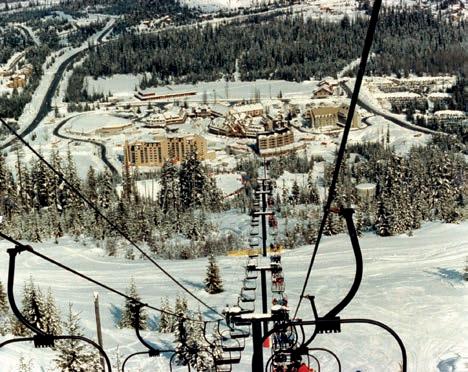
THIS WEEK IN PIQUE 40
13
08
10
29
36
58
36 40 We acknowledge the support of the Government of Canada #202 -1390 ALPHA LAKE RD., FUNCTION JUNCTION, WHISTLER, B.C. V8E 0H9. PH: (604) 938-0202 FAX: (604) 938-0201 www.piquenewsmagazine.com Pique Newsmagazine (a publication of Whistler Publishing Limited Partnership, a division of Glacier Media) distributed to over 130 locations in Whistler and to over 200 locations from Vancouver to D’Arcy. The entire contents of Pique Newsmagazine are copyright 2021 by Pique Newsmagazine (a publication of WPLP, a division of Glacier Media). No portion may be reproduced in whole or in part by any means, including electronic retrieval systems, without the express written permission of the Publisher. In no event shall unsolicited material subject this publication to any claim or fees. Copyright in letters and other (unsolicited) materials submitted and accepted for publication remains with the author but the publisher and its licensees may freely reproduce them in print, electronic or other forms. Letters to the Editor must contain the author’s name, address and daytime telephone number. Maximum length is 250 words. We reserve the right to edit, condense or reject any contribution. Letters reflect the opinion of the writer and not that of Pique Newsmagazine Pique Newsmagazine is a member of the National Newsmedia Council, which is an independent organization established to deal with acceptable journalistic practices and ethical behaviour. If you have concerns about editorial content, please contact (edit@ piquenewsmagazine.com). If you are not satisfied with the response and wish to file a formal complaint, visit the web site at mediacouncil. ca or call toll-free 1-844-877-1163 for additional information. This organization replaces the BC Press council (and any mention of it). ISSN #1206-2022 Subscriptions: $76.70/yr. within Canada, $136.60/yr. courier within Canada. $605.80/ yr. courier to USA. GST included. GST Reg. #R139517908. Canadian Publications Mail Product Sales Agreement #40016549. Founding Publishers KATHY & BOB BARNETT Publisher SARAH STROTHER -
Editor BRADEN DUPUIS
Sales Manager SUSAN
shutchinson@wplpmedia.com Production Manager AMIR
Art Director JON PARRIS
Representatives
Production
Reporters
Office
Contributors
GLENDA BARTOSH, FEET BANKS, LESLIE ANTHONY, ANDREW
ALISON
SHULEY, LISA RICHARDSON
Whistler Publishing LP
6 OCTOBER 20 , 2022 SkiIn/SkiOutCondominium SteveCartner* ManagingBroker|WhistlerBranch 604-935-2199|steve@cartner.com OneBedroom|GlacierLodge,BaseofBlackcombMountain UnlimitedOwnerUse|NoRentalRestrictions AskPrice:$1,145,000 *PersonalRealEstateCorporation WhistlerRealEstate.com Photos&fulldescriptionsatSteveCartner'swebsite: SingleFamilyHome Builtin2011&renovatedin2022|4Bedrooms+LargeMediaRoom 1087MadeleyPlace,quietcul-de-sacin CheakamusCrossing AskPrice:$2,995,000













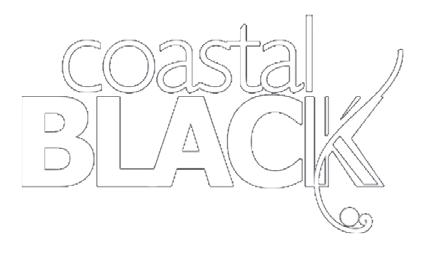
F ee di n g the Sp irit o f Whistler Si nce 198 8 100's of free dry & warm underground parking spots available. CREEKSIDE VILLAGE 604.938.9301 TRANSIT PASSES on sale instore @whistlercreeksidemarket /CreeksideMarket BEST CUSTOMER SERVICE 2020, 2021 Current Opening Hours: Daily from 9am-9pm Follow us on Facebook & Instagram for changes to our opening hours. FROZEN BLUEBERRIES From Comox Valley $15 4lb box CALIFORNIA GROWN ORGANIC BARTLETT PEARS $4 3LB BAG CREEKSIDE'S OWN NANAIMO BARS $4 6 PACK QUE PASA 'DAY OF THE DEAD' TORTILLA CHIPS $4 286G NESTLÉ FROZEN DESSERT BAR Coffee Crisp, Oreo, Caramilk, Rolo $6 5 X 80ML PRODUCE DELI BAKERY GROCERYDAIRY/FROZEN PEARLMARK WILD ARGENTINA PRAWNS $12 454G MEAT/SEAFOOD BC GROWN ORGANIC AMBROSIA APPLES $5 3LB BAG PORTOFINO BREADS Artisan Loaves 20% OFF 585-700G QUAKER INSTANT OATMEAL 6 Varieties to choose from. $4 264-344G MINUTE MAID ORANGE JUICE Calcium, Original, No Pulp $2 295ML CERTIFIED ANGUS LEAN GROUND BEEF Ground Fresh Instore Daily $7/LB 15.42/KG CREEKSIDE'S OWN ROAST CHICKENS Seasoned & Roasted Instore $1.29 /100G HABIBI'S HUMMUS Lebanese, Basil & Garlic or Siracha Jalapeno $4 240G DINNER IS ON! SPECIALS: OCTOBER 20-26
With the election over, the real work begins—for all of us
ANOTHER MUNICIPAL election is in the books, and Whistler is once again opting for familiarity, returning all five incumbents to office with a pair of young newcomers to round out the slate.
The challenges the new council faces will be familiar, too.
Housing, affordability, growth management, health-care, child-care, labour, mental health… the list goes on and
BY BRADEN DUPUIS
on, and branches off in different directions depending on who you talk to on which day.
And if we learned anything from the previous term, it’s to expect the unexpected— that new, unforeseen challenges could present themselves at any moment.
The new council will be sworn in on Nov. 1, and the annual strategic planning/ initiation retreat will follow. So we will hear more about our new council’s priorities and preferred direction in the coming weeks.
In the meantime, I hope our newly elected officials are reflecting on the campaign that just wrapped, and the concerns they heard from their fellow candidates and the electorate throughout.
I also hope those candidates who missed out on a seat don’t fade into the background. There are many ways to make your community a better place, whether that’s committee or board work, volunteering, or simply showing up to council meetings and asking questions of our officials—all of which will also serve as invaluable experience should you plan to run again in the future.
BUDGET SEASON
The first milestone in the new mayor and council’s term—and the first big opportunity for residents to engage with them—will come Dec. 1, at the Resort Municipality of Whistler’s (RMOW)
annual budget open house, which is taking place this year at the Whistler Public Library.
If you’re looking to take part in municipal planning, or just want to know more about local planning processes, this is your ideal jumping-off point.
Nearly all the work that happens at municipal hall stems from the annual budget, and the budget is built off of community members’ input.
Don’t want to see your valuable tax dollars frivolously spent? Come to the budget open house, watch the presentations, then submit your burning questions and righteous anger to mayor and council directly.
All of the budget feedback received becomes part of the public record, and council uses it to finalize the municipal budget with staff.
Have you ever seen a big old RMOW project under construction with a big old RMOW budget and thought, “why the hell did we build that expensive monstrosity?”
Well, your (likely valid) criticism is too late at that point.
So if you’ve ever looked at all the (everincreasing) numbers on your annual tax bill and gone cross-eyed, this is the best place to decipher it.
RMOW finance staff have gotten quite efficient at explaining the breakdown for residents, and general managers are also on hand for the open house should you need more detail about specific projects or expenditures.
For reference, Whistler’s past four tax increases were: 2.9 per cent in 2019; 2.8 per cent in 2020; 1.08 per cent in 2021 (reduced from the originally proposed 4.89 per cent due to COVID after significant public outcry—lest you think your input won’t be effective); and 6.72 per cent in 2022.
Whistler’s 2023 tax increase won’t be revealed until the Dec. 1 open house, but don’t expect much regression on that front— the RMOW has not minced words about the need to rebuild municipal reserves in the coming years.
After “smaller-than-necessary” tax increases in years past, the municipality is
A NOTE ABOUT VOTER TURNOUT
And on the topic of public engagement, at just 35 per cent, Whistler’s voter turnout in 2022 was, once again, pitiful (though still slightly better than the 32-per-cent turnout in 2018). But the provincial average was a mere 37 per cent, so it’s not a problem exclusive to Whistler.
For some (perhaps obvious) reason, municipal affairs don’t garner the same attention or carry the same prestige as their provincial and federal counterparts—for comparison, in last year’s federal election, B.C.’s turnout was 75 per cent; in the 2020 provincial election, it was about 55 per cent.

For many, municipal politics are an afterthought, at best. That’s because, when the average person thinks of how they can affect change, they tend to start with a baseline of big: national scale, nightly news, stump speech-type solutions.
Most don’t start by looking in their own backyard. And that’s a shame, because the best way the average person can make a




Real ones know that financially righteous outrage is best delivered at the budget open house, before the project lists and tax increases are finalized.
ABOUT THOSE TAX INCREASES
And those tax increases so many like to complain about? They are also determined through the annual budgeting process, and explained in great detail at each budget open house.
Whistler living at its
now in the midst of a “multi-year process,” to rebuild reserves, director of finance Carlee Price told council last December.
“This is not the sort of problem that can be solved in a single year—2022, however, marks an important beginning in the sense of those reserve contributions … Delaying the first step on this journey is dangerous to the long-term fiscal health of the organization,” Price said at the time.
Will the RMOW find the “true resiliency” in its budget it so desires? Come to the budget open house to find out for yourself!
difference in their life and the lives of others is to get involved at the local level, in any way they can.

You may not see the fruits of your labour immediately, but that’s OK. And, if we’re going to get philosophical about it, that’s kind of the point.
“A society grows great when old men plant trees in whose shade they shall never sit,” says the old Greek proverb.
We’ll all be better off when we start planting more trees—metaphorical or otherwise. ■
steps to slopes of Blackcomb and Upper Village. This
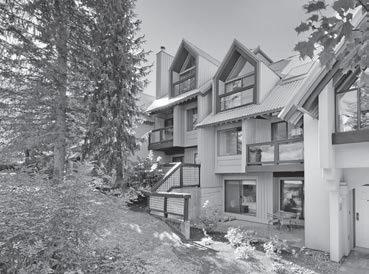
1175
ft
an open concept kitchen and living
with a wood
and two
with a
OPENING REMARKS
Real ones know that financially righteous outrage is best delivered at the budget open house, before the project lists and tax increases are finalized.
8 OCTOBER 20 , 2022
best, only
spacious
sq
two-bedroom townhome features
area,
fireplace
patios. Unlimited owner use
nightly rental option. No GST. Asking price: $1,700,000 31-4725 Spearhead Drive
Raymond Boisjoly Karin Bubaš Andrew Dadson Hannah Dubois Noah Friebel Tim Gardner Dan Graham Bracken Hanuse Corlett Christian Huizenga Mikaela Kautzky Andrew Kent Cameron Kerr Alex Morrison Michelle Pezel Samuel Roy-Bois Ron Terada Ian Wallace Amir Zaki Raphaël Zarka Presenting Sponsor Major Sponsors RAB FOUNDATION Government Partners CONSULAT GÉNÉRAL DE FRANCE À VANCOUVER Generously Supported By Hotel Partner Proudly Supported By Susan I. Roop the concrete art of skateboarding September 17, 2022 to January 8, 2023
Fungus Among Us celebrates 20 years
The Whistler Naturalists would like to thank volunteers and participants who joined our 20th annual Fungus Among Us Mushroom Festival. We started with presentations and mushroom walks to 26 classes (more than 600 students!). We were excited to include for the first time four classes from Xet ’ ólacw Community School in Mount Currie along with return visits to Spring Creek and Myrtle Philip. It was great to see so many students excited about mushrooms. Thanks to school presenters Andy MacKinnon, Kevin Trim, Paul Kroeger, David Walde, Kem Luther, Kevin Trim, Enid Martin, Bill Weir, Ben Hircock, Shayn McAskin and Daniel Winkler.
We’d also like to thank our “Talks with Gurus” presenters: Thom O’Dell for his talk on “Why mushrooms are important” and Veronica Woodruff for her talk on “Mushrooms you should know.”
Congratulations to winners of the Fantastic Fungi Foto Contest in each category: Adam Smith for Captivating Colour; Nicole McHugh for Weird and Wonderful; Magali Legault for Gorgeous Gills; Sally Dant for Tiny Toadstools; and Johanna Aldred for Fungal Fun. Thank you to our lead judge Joern Rohde for his difficult task in choosing winning photos. These and other photos from the event can be viewed on
our website: whistlernaturalists.ca.

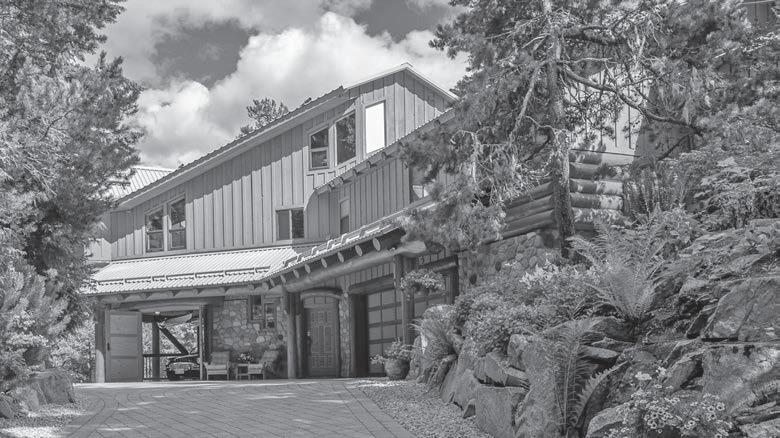
Fungus fans have no doubt noticed the historic drought has turned our forests into mushroom deserts. We were therefore delighted when our gurus brought back so many different species from the Saturday walks, enough to fill the display tables almost as much as in our usual rainy weather. We are still counting and expect at least 120 of the usual 160 plus species, even though the volume of mushrooms was certainly less than one per cent of normal. We even documented some species for the first time, maybe because of the weird weather.
Our popular Forest to Table lunch wouldn’t
have been possible without the great expertise and wonderful creativity of Chef Bruce Worden.
Finally, the Whistler Naturalists would also like to thank our key sponsors: The Whistler Community Foundation, AWARE and the Resort Municipality of Whistler. Thanks also to wonderful support from Milestones, Nesters Market, Legends Hotel, Whistler Bike Co., Avalanche Pizza, Whistler Cooks, Whistler Museum, Whistler Library, Pasta Lupino, Toad Hall Studios, Joern Rohde Photography, and the Whistler Biodiversity Project.
See you next year, as always, the weekend after Thanksgiving.

As rents skyrocket, some questions for landlords
Monthly rents are skyrocketing. There is no immediate solution or quick fix. Is it lack of supply or greed driving prices this high? For those of you not aware, here’s a quick rundown of listings and monthly rents in the Sea to Sky corridor from Craigslist. A one-bedroom/studio apartment in Squamish starts at $2,000. A two-bedroom in Whistler? $4,000 to $6,000, unless you have an unlimited budget and are looking for a “luxury rental,” in which case your rent starts at $10,000. And Pemberton? A total of three listings, with onebedroom units right on par with Squamish and the Lower Mainland at $2,000; a two-bedroom for $3,000; and a three-bedroom house for $6,500.
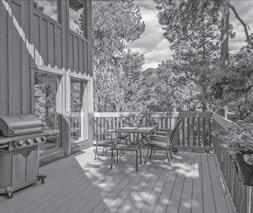


The following questions are for landlords in our region. They may be considered rhetorical if you wish, but take the time to write your own letter to the editor and let’s get this discussion out in the open:
1. Did you buy the property you’re currently renting out as an investment?
2. Does the rent you charge your tenants pay your entire mortgage, or more?
3. Has the current increase in mortgage rates caused you to increase the monthly rent on your income property?
4. Could you personally afford to pay the monthly rent you are charging?
Kristina Swerhun, Bob Brett, Sabrina Hinitz, Mel Tardif, Shawn Mason, Jamie Marconi, Julie Burrows // On behalf of the Whistler Naturalists
LETTERS TO THE EDITOR 10 OCTOBER 20 , 2022 t:604.935.2287 e: marshall@marshallviner.com marshallviner.com MARSHALLVINER PERSONALREALESTATECORPORATION Registeratmarshallviner.comtoreceiveweeklyrealestateupdates. 9580EmeraldDrive Spectacularwithbreathtakingmountainandglacier views!LookingacrossGreenLaketotheArmchair GlacierandWedgeMtn,youwillfeelyouareliving andworkingontopoftheworld!Theexpansive livingroom,diningandkitchenofferspectacular viewsofthesurroundingmountainsfrom20ft. windows,asdoesthespaciouswrap-arounddeck. Thetwouniquework-from-homespacesare quiet,private,andbrightwithasmalldecktosoak intheinspiringviews.Thisspaciousandrarehome officespaceisjustoneofthemanyfeaturesof this3350ft.²home.Fourbedroomswensuite bathroomsspreadover3floors,offer separationandprivacyforfamily/guests. Animmaculate620sfgaragewithworkshoparea, andfullyrefinishedcarportwswingdoorsis perfectforthecarenthusiast,snowmobile,kayaks etc.,andhaseasyaccesstocoveredstorage $3,749,000
The monthly rents in our region and our province are driving people out. We as renters cannot continue to pay 50 per cent of our income in rent. Landlords, we can’t wait to hear your answers.
Tania Chiasson // Pemberton


Want to increase voter turnout? Embrace online voting
Another set of municipal elections across the province has come and gone. Voter turnout was miserable in most municipalities, as usual, and just 35 per cent in Whistler. Sad.
Like many people, I work Saturdays, and don’t have time to go to an archaic polling station. I opted to vote by mail, and received my ballot on Friday, Oct. 7. Given that Monday was a stat holiday, if I had mailed it on Tuesday, it would have probably not made it to the muni in time. I drove to the village and dropped my ballot off in person.
Polling stations are hundreds of years old, and yet we still use them. Why we don’t have online voting is something I just don’t understand. I can register to vote online…
Hundreds of municipalities across Canada now have the option of e-voting, with voter turnout that has increased.
Catch up, British Columbia, and change the Local Government Act to mirror Ontario, Nova Scotia and the NWT!
Patrick Smyth // Whistler

Celebrate Canadian Library Month at the Whistler Public Library


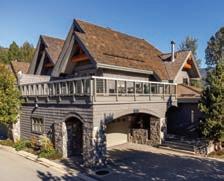


October is Canadian Library Month, when libraries across Canada celebrate the ways libraries enhance our lives. Since its 1985 start in the basement of Whistler’s municipal hall, the Whistler Public Library (WPL) has evolved from simply lending books to playing many roles in our community. Today it’s a refuge, offering comfort and safety in recent heat domes and periods of extreme cold. It’s a point of connection to critical community services. It’s a place of learning, offering educational programs and dozens of online courses. It’s a sanctuary, offering a peaceful place to curl up in one of our cosy new reading booths, or to warm up by our fireplace.
And more than ever, WPL is a place for experiment, discovery, and play. With the exciting new expansion of our “unusual items” collection, WPL now has something for pretty much everybody. For textile artists, we have sewing machines, knitting machines, and a pocket loom. For astronomers, a telescope. For birders, binoculars and spotting scopes. For gardeners, a seed library. For kids, we have three different learning robots. For families, we have a vast selection of board games. You can also borrow one of our disc golf sets and explore the awesome disc golf course at Lost Lake. Or, while this amazing weather lasts, you can borrow a croquet set, a bocce set, a giant Jenga, or a bean bag toss and have some fun with friends in Florence Petersen Park, right behind the library. It’s all free to borrow, even our new loaner laptops.
Our thanks go out to the many in our
LETTERS TO THE EDITOR
community who’ve already observed Canadian Library Month by donating to Whistler Public Library. Your generosity keeps our extraordinary library an innovative and community-serving place. We couldn’t do it without you.
Regardless of whether you’re in a position to donate, please come celebrate Canadian Library Month with us by dropping by and checking out all that Whistler Public Library has to offer.
Zero Ceiling marks a quarter century of fighting homelessness
Since 1997, Zero Ceiling has been part of the fabric of Whistler. Thanks to the compassion, vision, and dedication of this community, we’ve been fighting homelessness and providing a safety net for young
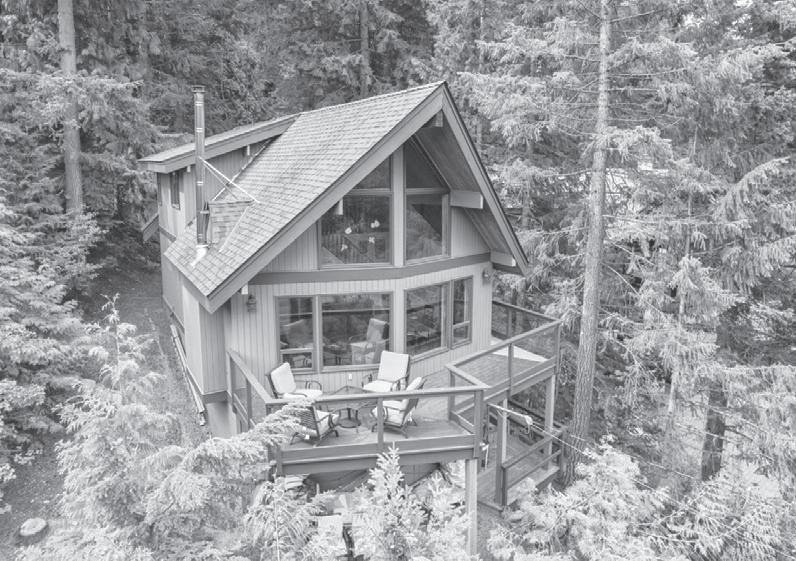
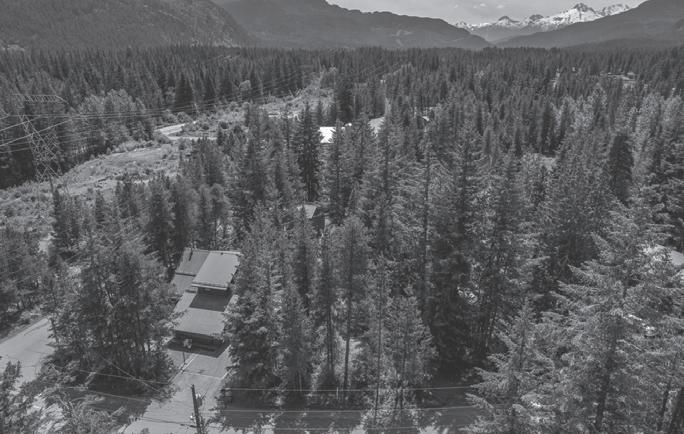
people for a quarter of a century.
Last Friday night, Oct. 14, we celebrated this incredible milestone at our 25th Birthday Family Dinner, presented by the Fairmont Chateau Whistler. More than 200 supporters from Zero Ceiling’s past, present, and future shared stories over a delicious buffet dinner and generously gave what they could to support our programs.
Thanks to them, we raised an amazing $110,000! This is in huge part thanks to generous matching donations from the Fairmont Foundation, Whistler Blackcomb Foundation, and the Szocs Foundation. This means we are a huge step closer to our goal of raising $250,000 before the end of the year.
We’re so grateful to every single person who was part of our 25th birthday celebrations! To our fundraising committee, volunteers, speakers, staff, board, partners, and everyone who donated, bought a ticket, bid on the silent auction, or took part in our raffle— thank you for believing in us. Most importantly, thank you to all our program participants, past and present, who celebrated with us and who are the heart of the Zero Ceiling community.
Zero Ceiling exists because we believe everyone deserves a home. Thanks to your support, we can continue providing a safety net for young people facing homelessness for as long as we need to. And meanwhile, we’ll keep advocating for change so that one day, no young person in our community experiences homelessness.
If you’d like to reconnect with Zero Ceiling, donate to our $250,000 campaign, or learn more about our work, don’t hesitate to reach out at info@zeroceiling.org or 604-962-5000.
Thank you once again!

Write to us! Letters to the editor must contain the writer’s name, address and a daytime telephone number. Maximum length is 450 words. Pique Newsmagazine


Mike Walsh // Chair, Whistler Public Library Board of Trustees
Lizi McLoughlin // Development Manager, Zero Ceiling n
reserves the right to edit, condense or refrain from publishing any contribution. Letters reflect the opinion of the writer and not that of Pique Newsmagazine GOT GOOD VIBES TO SHARE? Send them to goodnews@piquenewsmagazine.com
“Polling stations are hundreds of years old, and yet we still use them.”
- PATRICK SMYTH
OCTOBER 20 , 2022 11 Engel & Völkers Whistler WHISTLER’S#1RE/MAXAGENT #20CLOUDBURST, WHISTLER $1,100,000 Buildyourdreamhomeon thisflatlotinthegated communityofBlackTusk. T 604.935.2287 E marshall@marshallviner.commarshallviner.com 8271Alpine Way •3 Bedrooms +Study, 2Bedroom •Quietlotwithloadsof sunlight &fabulousmountain views •Homeandpropertyare meticulouslymaintained $3,499,990 Registeratmarshallviner.comtoreceiveweeklyrealestateupdates






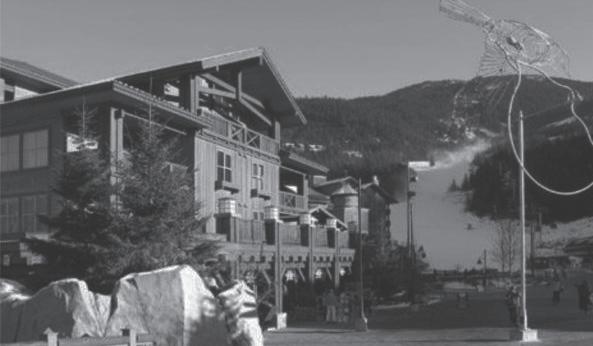

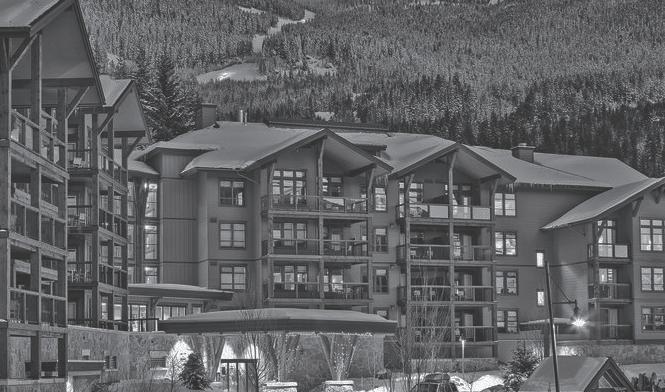





Servingseatoskyfor18years MountainPsychology andNeurofeedback Ce ntre StephenL.Milstein Ph.D.,R.Psych.BC#765 604.938.3511 DawnaDixxMilstein , OT.COTBC # AA0201 604.938.352 3 Whistler: #107-4368MainSt,Whistler,B.C.V0N1B4 Squamish: 380772ndAve,Squamish,B.C.//604.848.9273 NickDavies, Whistlerlocal and experienced family lawyer practising across BCand Yukon. Callat 604-602-9000 or visit www.macleanlaw.ca MacleanLawisheadquartered in Vancouverwithofficesacross BritishColumbia. JAMESCOLLINGRIDGE CALL JAMES,THELEGENDS& EVOLUTIONSPECIALIST Direct: 604-902-0132 TollFree: 1-888-689-0070 james@whistlerrealestate.net www.whistlerrealestate.net FULLYFURNISHED1/4OWNERSHIPCONDO/HOTELSINWHISTLERCREEKSIDE THINKINGOFBUYINGORSELLING? CALLJAMESFORMOREINFORMATION. CONTACTJAMESFORAVAILABILITY ApplybyMonday,November7,2022 Share what you know and love about Whistler Connect with visitors Do fun and meaningful work in your community Receive great rewards To apply or receive more information, visit whistler.ca/volunteer Applythiswinterifyou are a local and you want to: orcontactCathieorErinat ihost@whistler.caor604-935-8478 12 OCTOBER 20 , 2022
How do we break through Whistler’s siloes?

EVERY SO OFTEN as a reporter, you come across a particular term or buzzword that just sticks with you for one reason or another, firmly lodged in the back of your psyche until something jostles it loose. This municipal election campaign brought my own personal pet term back to the fore of my mind: siloes.


 BY BRANDON BARRETT
BY BRANDON BARRETT
In an interview about her campaign last month, Whistler council candidate and forest ecologist Rhonda Millikin mentioned wanting to “remove the siloes” in the Resort Municipality of Whistler’s (RMOW) decisionmaking, using wildfire mitigation as an example of how interconnected so many of the issues facing the resort truly are.
It’s in this context that you commonly hear about Whistler’s siloes, and this election season was no exception. Much of the talk from candidates about what is arguably the community’s longest and most complex challenge—housing—touched on how far solving this years-long puzzle would go towards soothing Whistler’s other urgent woes, be it our worsening staff shortage, mentalhealth crisis, climbing GHG emissions or steep cost of living. Knock down one domino, and
the rest will fall, or so the thinking goes.
But the push to break through Whistler’s siloes stretches back further than just this election cycle. In a 2017 interview with Pique, Paul Mathews, president and founder of internationally renowned EcoSign Mountain Resort Planners, talked about the important role then-outgoing Whistler Blackcomb (WB) COO Dave Brownlie played over the years in bringing together the resort’s various powers that be, namely the RMOW, Tourism Whistler and WB.
“They’d talk to each other occasionally, but they didn’t share any numbers, they didn’t sit down—unless it was in an argument. It was to each his own,” Mathews said.
“Dave is the first president or CEO of Whistler Blackcomb that was so fully engaged with the community, in my mind, and has created this tripartite agreement of how we guide the ship, with three hands on the tiller.”
The siloes Mathews referred to are of course political in nature, but this election season got me thinking about the other kinds of siloes that exist here as well. The general lack of youth voices at any of the all-candidates meetings is a great example of the kind of social and cultural barriers that keep Whistler’s disparate communities from talking to each other in meaningful ways. There’s no denying that the biggest issues facing the resort affect our young population the most—the seasonals, the front-line workers, the van lifers—and yet,
it’s the same grey-haired crowd that usually ends up coming out to these things, which of course ends up transferring over to the ballot box on election day.
There are few places in Canada where the chasm between the established and the emerging is more pronounced than in Whistler, and baked into the community’s very ethos is this expectation that you have to suffer through certain rites of passage just to be accepted as a true local, whatever the hell that means. As Whistler Community Services Society executive director Jackie Dickinson told me in a recent interview, paraphrasing popular Hungarian-Canadian physician and author, Dr. Gabor Maté: “We’ve normalized inequality,” she said. “We’ve just made it normal for people to struggle, to experience inequity, to not be able to live in certain places, to see all these disparities within our system.”
Although Dickinson was talking about society in general terms, the “work-hard, play-hard” mentality of Whistlerites, no matter how well intentioned it may be, only serves to further entrench this norm. Why would I ask for better from my elected officials if I’ve convinced myself suffering is a natural part of my Whistler experience? Why would I involve myself in a community that doesn’t seem to care if I succeed?
Whistler, as we all know, only functions when every spoke of the wheel is in place. And while I have no illusions that we are

going to wave our wand and magically resolve decades of growing inequality overnight, there are other ways we can break through the siloes. First and foremost, it’s about having more of the multi-generational community hubs that Whistler has for so long been known for. Whether it was the Rainbow Lodge of the 1920s or the Racket Club of the 2020s, Whistlerites need and should have these cherished “third places” to connect and commune, complain and cavort.
I think it’s part of the reason why the Racket Club lobby has come out with such force this election: they saw first-hand during the pandemic the value of having a place where locals of all stripes could get together and play. Now, do I think the Racket Club and the Northlands rezoning should have dominated this campaign as much as it did? Absolutely not, and those stubborn oneissue voters who are unwilling to accept the club’s relocation—practically a fait accompli at this point—at the expense of desperately needed health-care and daycare space at the upcoming Northlands development should shake their heads out of their own personal siloes. But I can also understand that the issue is about so much more than just pickleball; it’s about a community that has watched its social fabric fray at every corner as the few remaining public spaces not asking for your money to be there disappear with every passing year. ■
PIQUE N’ YER INTEREST
OCTOBER 20 , 2022 13 EAGLELODGE
Whistler goes with experience, compatibility on election day
VOTERS RETURN ALL FIVE INCUMBENTS TO OFFICE, ALONG WITH ELECTING FIRST-EVER WHISTLER-BORN RESIDENT TO COUNCIL
BY BRANDON BARRETT
IN SPITE OF (or because of) Whistler’s ever-changing nature—a transient tourist town that seems to make and remake itself with each passing season—local voters have, for years now, tended to favour consistency and experience at the ballot box.
In 2022, after a four-year term marked by its sheer unpredictability, history repeats itself once more, with the electorate returning all five incumbents to office— Mayor Jack Crompton, and councillors Cathy Jewett, Jen Ford, Arthur De Jong and Ralph Forsyth—along with two new faces that should be readily familiar to local politicos: Jessie Morden and Jeff Murl.
“I think the final vote tally really demonstrates the community’s confidence in these six people. They are thoughtful, hardworking and extremely connected to the community,” said Crompton after the results were announced on Oct. 15.
Whistler’s mayor gains a second term in office after running unopposed in 2018. He earned 2,153 votes, roughly 67 per cent of votes cast for mayor, compared to 712 votes for mayoral hopeful Marcus Culver and 259 for Brian Walker.
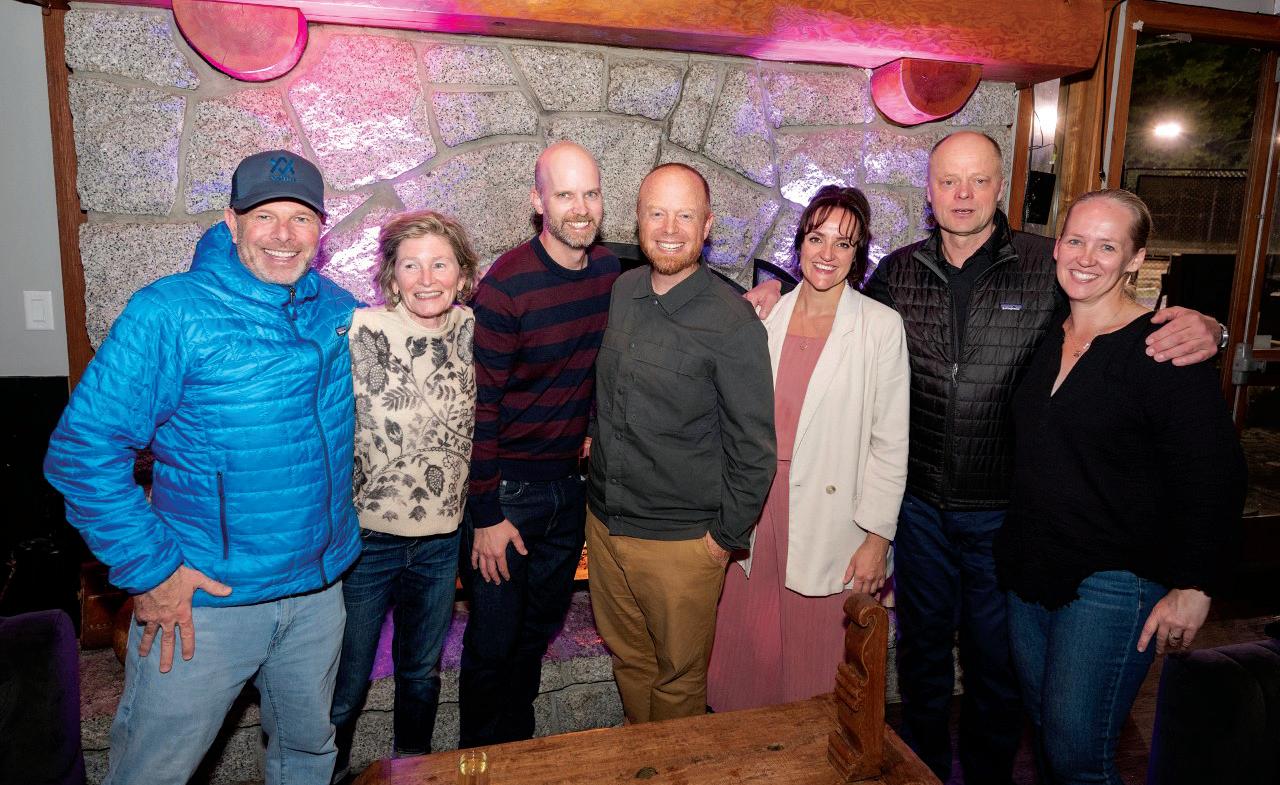
of Arts Whistler, working on the Resort Municipality of Whistler’s board of variance, becoming a library trustee, and joining the Whistler Community Foundation’s finance committee. Even still, the 42-year-old accountant recognizes there will be some learning on the job once he assumes office.
COMPATIBILITY VS. COMBATIVENESS
PHOTO BY DAVID BUZZARD / DAVIDBUZZARD.COM
A RESOUNDING VOTE
Whistlerites left little doubt of their confidence in the returning incumbents, with all five topping the list of vote-getters.
Leading all candidates for the second election in a row was Councillor Cathy Jewett, with 2,262 votes, roughly 70 per cent of votes cast, followed closely by fellow incumbents Jen Ford (2,198 votes) and Arthur De Jong (2,179 votes). Ralph Forsyth returns to council with 1,639 votes, while first-time candidate Jessie Morden, the daughter of former Mayor Nancy Wilhelm-Morden, wasn’t far behind him at 1,612 votes.
Earning the final seat on council, with 1,589 votes, was Jeff Murl, who missed out on a council seat in 2018, placing eighth. Murl brought a renewed confidence to his second campaign, bolstered by a wealth of experience he gained in the intervening four years, including serving on the board
“I think there’s definitely a learning curve no matter how much you prepare for this,” Murl said on election night. “I’ve always wanted to know what’s going on [at municipal hall] and now I get to finally see it first-hand. So I’d like to take it slow in the beginning and just try to listen and absorb as much as I can, and find my voice when the time comes.”
Notably, unlike last election when just a few dozen votes separated the sixth and final council seat from the next highest vote-getter, this year, there was a difference of nearly 600 votes.
Brendan Ladner and his climate-focused campaign topped the candidates who missed out on a seat at council, with 1,004 votes, followed by Dawn Titus (918 votes); Melinda Lopez (663 votes); Rhonda Millikin (628 votes); Curtis Lapadat (562 votes); Sarah Rush (465 votes); Tina Pashumati James (426 votes); Gordon Jeffrey (412 votes); and Gabriel Pliska (363 votes).
In a campaign that was at times light on actual policy solutions, it may have been candidates’ perceived demeanour and willingness to work with others that ultimately made the difference in voters’ minds.
“There was quite a gap between the people that were successful and those that weren’t. I feel, to a certain extent, it was the way they presented their idea of change, which was basically ‘burn the barn,’” said Jewett. “There was no conciliation or interest in working with the incumbents.”
An otherwise tame campaign took an 11th-hour turn just days before election day, when an informal candidates meetand-greet at outgoing Councillor Duane Jackson’s house with members of the local building industry raised concern for a handful of candidates, initially because they weren’t invited to the private event. That eventually led to allegations of possible vote buying from candidates Lapadat and Titus, who lodged complaints with election officials, contending that “light refreshments” promised in the invitation sent from Jackson’s email, along with written statements to the construction sector from Murl and Morden contained in the
THE RESULTS ARE IN Whistler’s new mayor and council. L to R: Ralph Forsyth, Cathy Jewett, Jeff Murl, Mayor Jack Crompton, Jessie Morden, Arthur De Jong and Jen Ford.
NEWS WHISTLER 14 OCTOBER 20 , 2022
invite, constituted potential “inducement” to electors to vote a certain way.


“The key consideration will be whether or not someone who was in attendance at the event was actually induced to vote in a particular way as a result of attending the event and having a refreshment or other benefit (gift, money etc.). What happens at the event will be important to understand whether or not there was either implied or overt inducement,” said Whistler’s Chief Election Officer Pauline Lysaght in an email the day of the meeting, Oct. 7. “The public perception of the event would not necessarily impact the analysis, as this requirement is specific to a person.”
The last-minute furor spoke to a recurring theme this election season, with some candidates taking up the mantle of Whistler’s “unheard”—the young, frontline workers that are commonly not eligible or inclined to vote—believing Whistler’s incumbents and contender candidates to not represent their interests.

In some ways, Morden is symbolic of this apparent dichotomy. A 34-year-old mother who is the first-ever Whistler-born resident elected to office, Morden has volunteer experience at several local non-

isn’t really pleasant, for the most part. And when I saw what was happening to Jessie on social media, all those feelings came flooding back.”
The tense tenor of the campaign, particularly online, was something several of the candidates noted. Asked if social media was ultimately a boon or a barrier to Whistler’s political culture, Jewett said she tried to use the platform to dispel misinformation.
“What concerned me is that people didn’t have the specifics and the correct information—and it’s all there. But there didn’t seem to be a depth of knowledge,” she said, highlighting the housing file in particular.
HOUSING REMAINS NO. 1 ISSUE

At a time when the resort is seeing several pressures bearing down on it, it was housing that dominated much of the talk on the campaign trail. While acknowledging that more work still needs to be done on that front, Crompton believes Whistlerites’ vote for consistency and experience at the polls
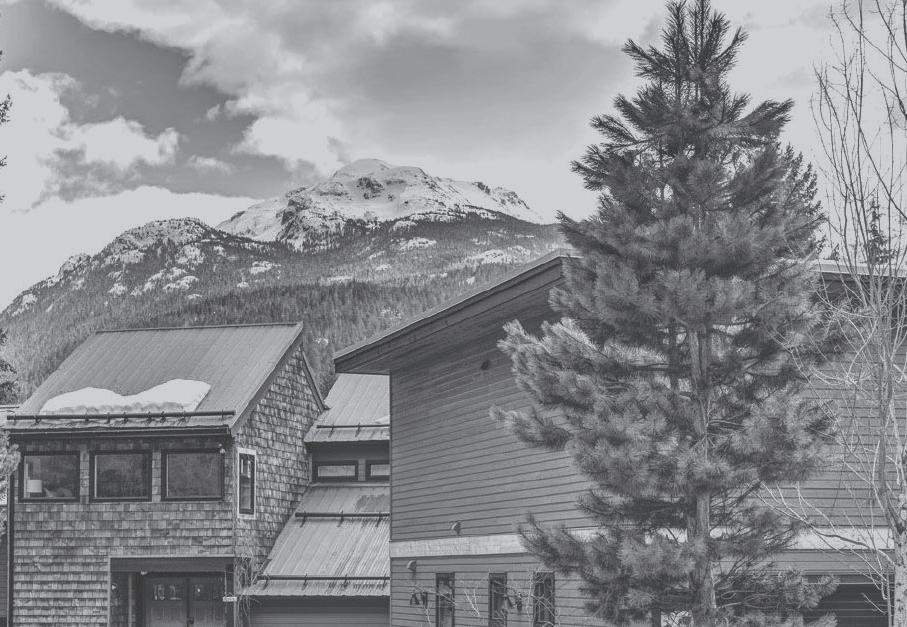

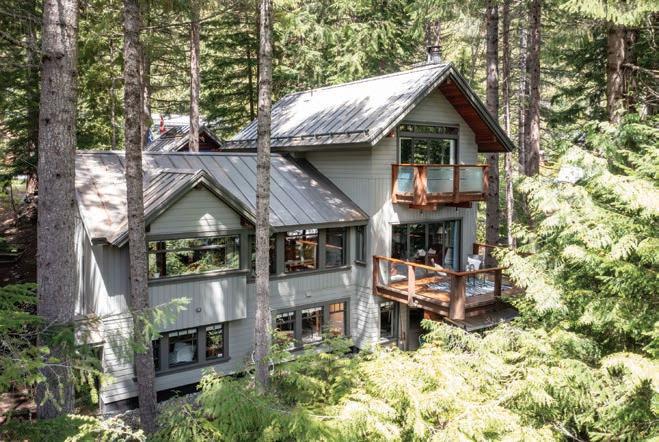
 - JACK CROMPTON
- JACK CROMPTON

profits and has positioned herself as a voice for the resort’s young demographic, a role she said she is proud to fill.
“I am just so overjoyed I made it. I’m at a loss for words and I can’t wait to just do good for this community,” she said on election night. “People need a voice right now and I really do feel like I can connect with the younger generation. And I hope that people will receive me.”
As the daughter of two-term Mayor Wilhelm-Morden, however, there is sure to be those who see her as another inside member of the so-called Whistler establishment—including several of the council hopefuls themselves, whose barbs were mostly relegated to social media in the lead-up to voting day.

It’s the kind of criticism WilhelmMorden heard first-hand herself, both as a multi-term councillor and two-term mayor. Flanking her daughter on election night at the Whistler Racket Club, where several candidates had gathered Oct. 15 to hear the results, Wilhelm-Morden said she had moments of trepidation as she watched Jessie on the campaign trail.
“I did, especially when it started to get quasi-nasty on social media,” she said. “One of the reasons I didn’t run again for mayor back in the day was social media. It was just a whole new dimension, which
was ultimately a validation of the work council has done over the past four years.
“It demonstrates that our community understands that our housing challenge is enormous, and we need people with experience to take it on,” he said.
While it manifested in various ways, there was no denying the level of passion amongst all of the political hopefuls who threw their hat in the ring this election. Jewett urged them to stay the course if they want to continue advocating for change in the community.
“I hope that we can move on from the campaign, and that the people who were so keen to be involved, stay involved—that we see them at council meetings, that we see them at open houses, that we see them joining committees and boards, so it’s not just the Whistler ‘elite,’” she said.
Voter turnout on an unseasonably warm Saturday was 34.98 per cent, up from 32 per cent in 2018 and 27 per cent in 2014, but still below Whistler’s record high of 55 per cent in the resort’s landmark 2011 election, still the only time Whistlerites cleaned slate with an entirely new mayor and council.
On the school trustee front, incumbents Cynthia Higgins and Rachael Lythe were both re-elected, with 1,527 and 1,188 votes, respectively. Deb Bordignon finished just behind Lythe with 1,118 votes. n

NEWS WHISTLER
“[The vote] demonstrates that our community understands that our housing challenge is enormous, and we need people with experience to take it on.”
OCTOBER 20 , 2022 15 FeatureListing 8274MountainviewDr ThishomeoffersabeautifulsettinginAlpineMeadowsonalargeprivatelotwithits ownbabblingcreekandmountainviews!DesignedbyawardwinningArchitectDon Stuartitoffers3.5bedroomsand3.5bathroomsanda2-bedroomsuite. $3,349,000 WHISTLER’S#1RE/MAXAGENT St uart, it o NickSwinburne PersonalRealEstateCorporation Engel&VölkersWhistler Phone:+1(604)932-8899 Email:connect@whistlerforsale.com 4EagleRidge TourbyQR WhistlerCayHeights3-bedroom townhome.Openfloorplan,private, quiet,largedeckandlotsofstorage. 2parkingstalls,on-sitetenniscourt andaneasywalkintothevillage.Scan theQRcodeforyourvirtualtouror calltobookyourownprivateshowing. DAVEHALLIWELL PersonalRealEstateCorporation 604.932.7727 dave@davehalliwell.com 9344Emerald Drive •ExcellentRevenue Producer •PanoramicMountain Views •GreatFamilyHome withSeparate CarriageHouse $3,495,000
Whistler Adventure School bringing trail-building courses to Mexico

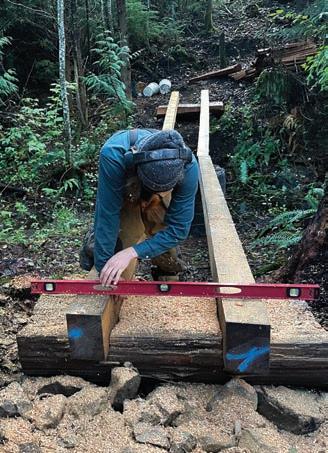
TRAIL-BUILDER DAKOTA GOULDER WILL BRING LOCAL KNOWLEDGE TO MEXICO’S MOUNTAIN BIKE COMMUNITY DURING THREE-WEEK TRIP
 BY MEGAN LALONDE
BY MEGAN LALONDE

THE WHISTLER Adventure School (WAS) has helped train the next generation of Whistler’s mountain industry professionals since opening for business in 2014. Now, it’s taking that training on the road.
Shelley Quinn, the school’s general manager and sales director, will join sustainable trail-building instructor Dakota Goulder in Mexico later this month for a three-week tour through the country in partnership with local bike shops, offering trail-building clinics, WAS information sessions and help repairing some well-loved trails.
“Recently, as biking has been getting more and more popular worldwide, we’ve realized that trail building and bike mechanics and skills like that are becoming more essential not only in Whistler, but in lots of other emerging places,” said Quinn. “One of our ex-students who owns a bike shop in Puebla, Mexico, had suggested to me a couple years ago, ‘Wouldn’t it be great, you know, to bring a trail-builder down here and help us to develop some of our trails?’ and then COVID came along.
Two years later, we’re now finally able to go down there and kind of fulfil this idea.”
Though the WAS reps will be simultaneously spreading the word about opportunities to study at the school—the private, post-secondary institution offers career-specific training in the marketing and media, mountain sport technician, design and innovation, adventure tourism and adventure-guiding disciplines from its Function Junction headquarters, with courses offered on a rolling basis throughout the year—“We also wanted to be able to give something back to where we went and leave people with some skills, and also learn about how important volunteerism is,” Quinn added.
“The trails don’t just get built and maintained; it’s a lot of volunteer work.”

From Oct. 24 to Nov. 13, the WAS team will drop by numerous locations like Oaxaca, Pachuca, Puebla, Avandaro, Mexico City and San Jose del Cabo.

Goulder—one of the names responsible for bringing Whistler’s iconic Lord of the Squirrels trail to life—will be on hand, armed with all the necessary tools to impart some of the wisdom he’s garnered as a B.C.based trail builder with the Whistler Off Road Cycling Association, Squamish Off Road Cycling Association, private groups

and ski resorts. The clinics will cover topics such as water management, basic principles of rockwork, trail maintenance, building corners and, as Quinn mentioned, volunteerism.


“This is kind of groundbreaking for us in that we’re actually going to be taking an instructor and giving some courses over there to give people a little bit of information that they can use, even if they can’t come all the way to Whistler to study—because it is an expensive undertaking to come and live in Whistler,” said Quinn. “This way, we get to spread some of that knowledge in some of the areas that they can use for their own development.”











The partner bike shops and local businesses have “already picked a spot where they want us to go to work,” Quinn added. “It’s just to either repair an existing trail, look at things that can be improved. Sustainability is a big issue and it’s something that we’re really trying to focus on. So how they will build a trail to make it last for many years and make it rideable and make it flowy.”
Quinn has noticed an explosion in mountain biking’s popularity in the five years since she’s joined WAS, particularly in Latin American countries such as Mexico, especially, but also Chile, Colombia and Argentina, she said. She estimates about 15 per cent of the school’s students are now travelling to the resort from those regions.



Find more info at whistleradventureschool.com. n



NEWS WHISTLER
UNDER CONSTRUCTION Whistler Adventure School GM Shelley Quinn will join Dakota Goulder, pictured, in Mexico this month for a three-week bike trail-building clinic.
PHOTO SUBMITTED
16 OCTOBER 20 , 2022 $3,288,000 SADIE BRUBAKER 604 907 1400 3 2 1,550sqft •StunninglyrenovatedBenchlandstownhome •OverlooksFairmontWhistlerGolfCourse •Fantasticrentalrevenueopportunity •Walktogondolas,lakes,trailsandVillage 32-4628BLACKCOMBWAY, WHISTLER $2,999,000 PETER LALOR 604 902 3309 6 4.5 2,755sqft •NexttoGreenLakewithbeach+boatlaunch •Includesa1bed/1bathincomesuite •Enjoyrecentupdatesandplentyofparking •Largerecroomwithbar+hottubroom 9372EMERALDDRIVE, WHISTLER $1,545,000 DANA FRIESEN SMITH *PREC 604 902 3878 2 2 927sqft •WakeupandlookoutatWhistlerMountain •Builtin2015,stillhasnewhomewarranty •Enjoysunalldayfromtwopatios •ClosetoeverythingCreeksidehastooffer 4-2007KARENCRESCENT, WHISTLER $6,499,000 JOSH CRANE 604 902 6106 5 5 3,618sqft •Directlyacrossfrom1stholeteebox •StepsfromGreenLakeandClubhouse •Qualitypostandbeamconstruction •Zonedfornightlyrentals 8060NICKLAUSNORTHBLVD, WHISTLER
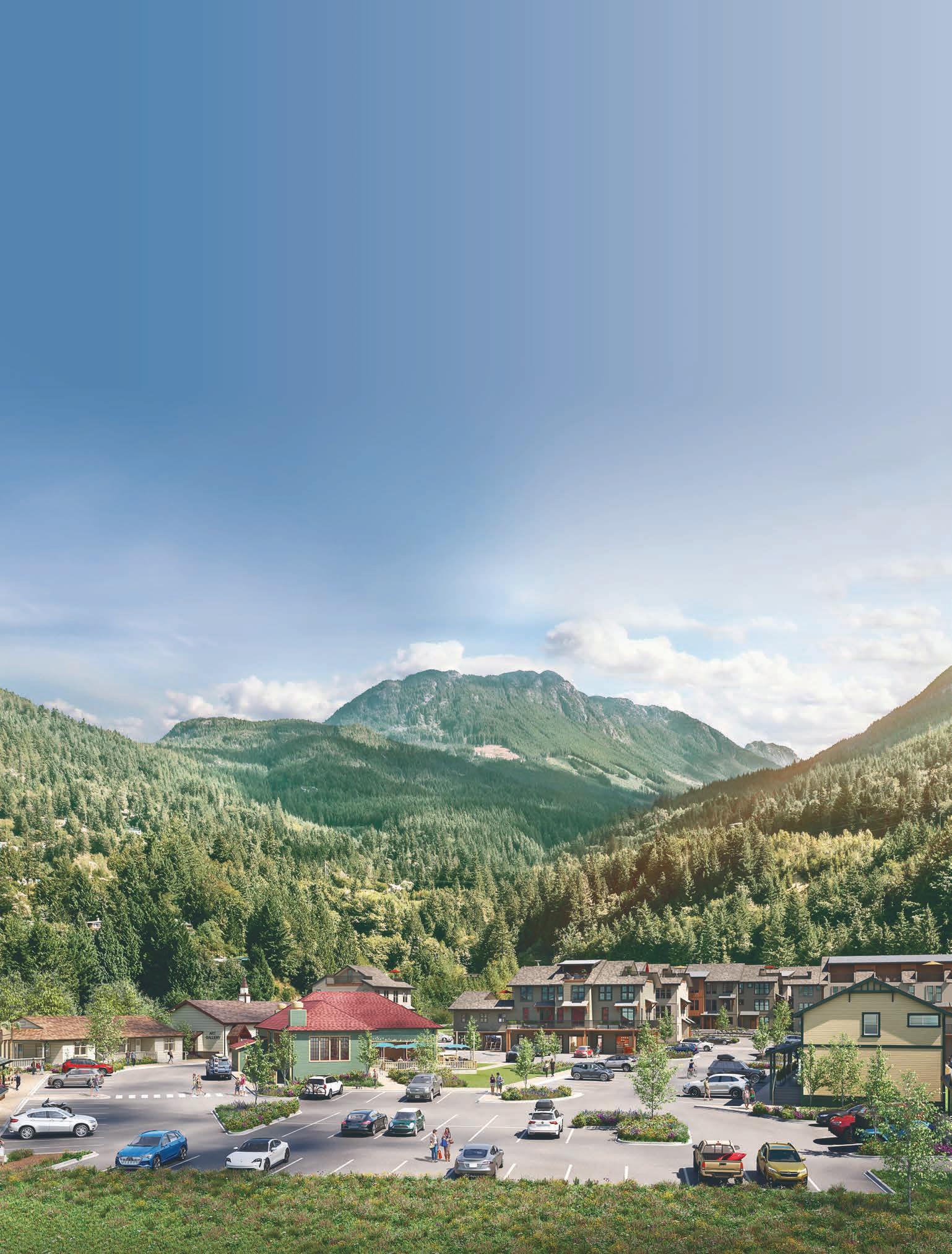
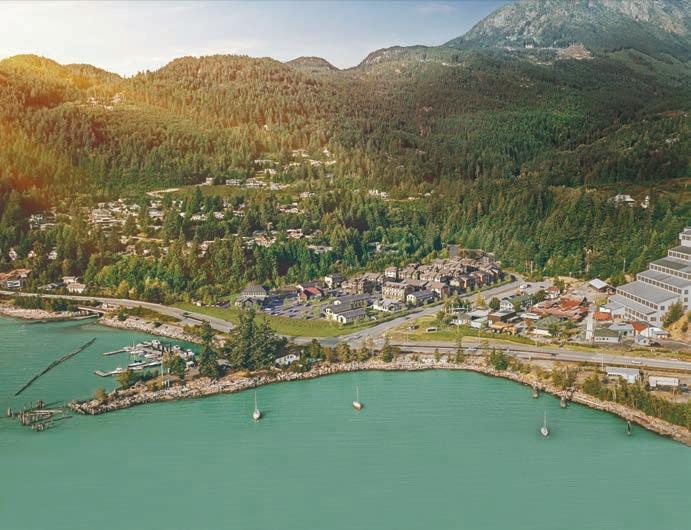




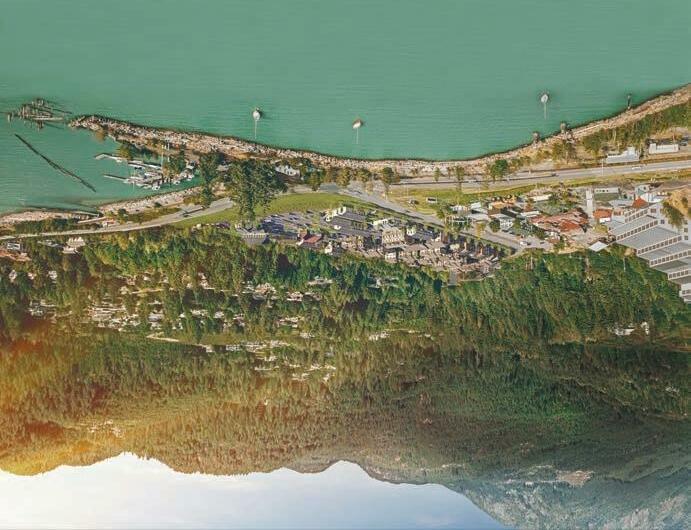
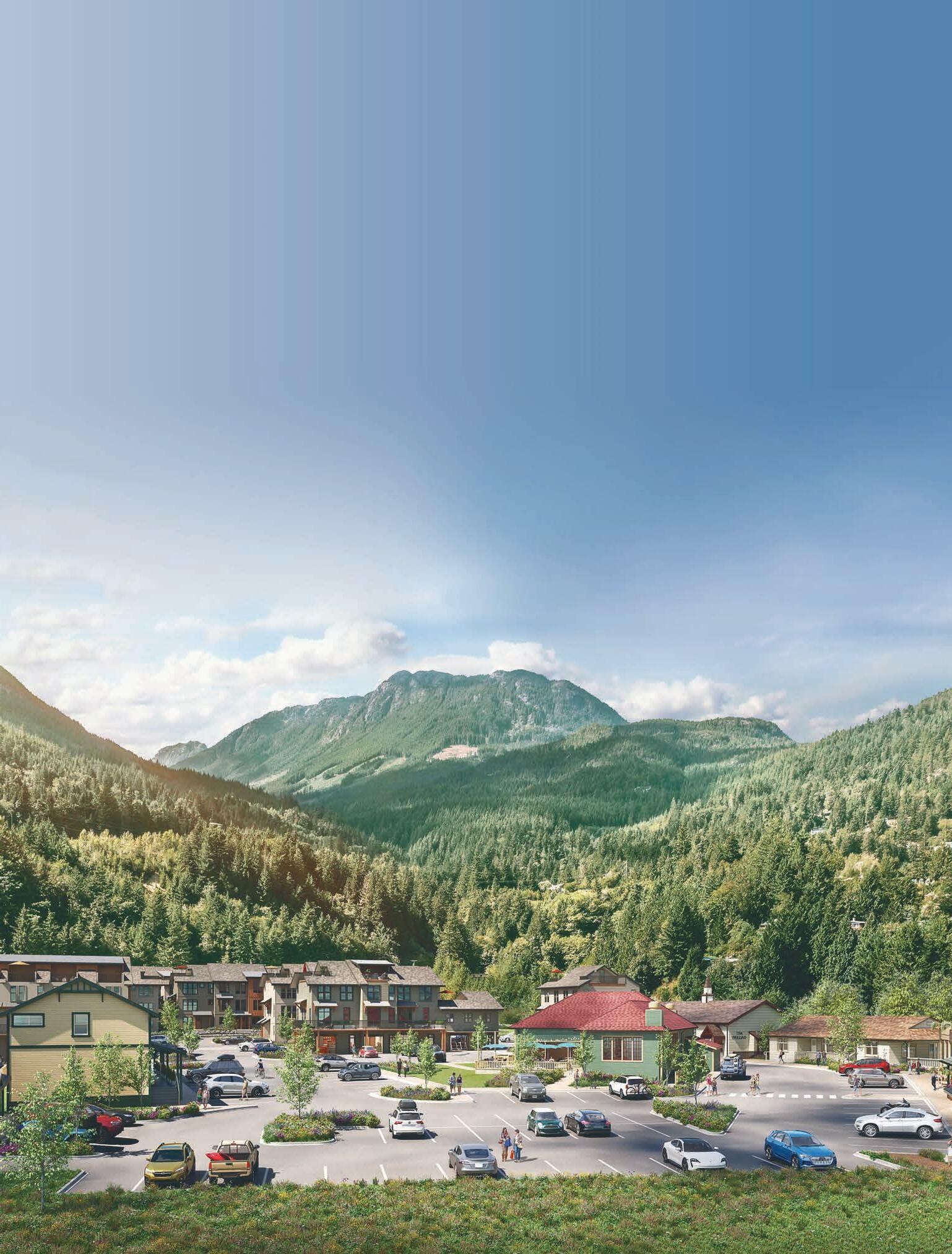
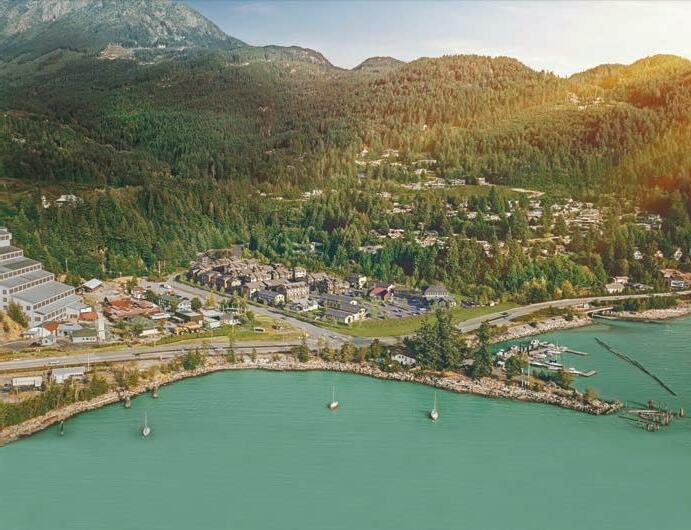



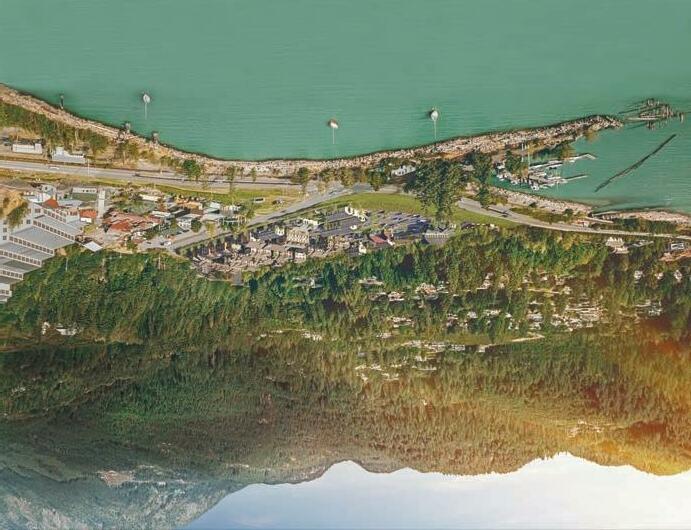
Chooseamoreintentionalpaceinthishistoric artisanvillagesurroundedbythewilderness playgroundoftheSea-to-Sky.Wheredramatic, chiseledmountainskissthesparklingHowe Soundcoastline—yetwhereyou’restillabout ahalfhourfromthecity.Onlyahandfulofthese two-andthree-bedroomhomeshavebeen releasedinPhaseIIofexclusiveBritanniaBeach. LiveBeautifully. PHASETWO NOWSELLING Registertodayat britanniabeachliving.com
Mile One owners wanted to keep things local in sale to Whistler Cooks
RANDY JONES AND CINDY YU KNEW THE BELOVED PEMBERTON RESTAURANT NEEDED MORE RESOURCES TO KEEP THRIVING
BY BRANDON BARRETT
AS HE WAS FINALIZING the sale of Pemberton’s Mile One Eating House, co-founder and co-owner Randy Jones couldn’t help but reminisce. Of course, there was no way of knowing it at the time he and partner Cindy Yu first opened the beloved Arbutus Street burger joint in early 2011, but looking back now he recognizes the past decade-plus set the stage for everything the couple is doing today, between taking over the historic Hanceville Cattle Co. in the Chilcotin range and setting up their brand-new wholesale grocery supply business, Range & Co.
“It almost feels like the last decade or so was the dress rehearsal for the next decade,” Jones said. “It really put us on a path to become who we are, Cindy and I, as operators, culinary professionals and businesspeople. That was all foundational. We’re here for the show now.”
Last week it was announced that Mile One was sold to Whistler Cooks, the company behind several successful food ventures in Whistler, continuing the locally owned legacy of what is arguably Pemberton’s favourite restaurant.
“Coming out of the way the restaurant world has gone in the last number of years, when I really looked at what the future of Mile One Eating House was going to be, I thought it would really fit well in a portfolio of a larger food and beverage company that has independent or distinct brands,” Jones explained.
Counting its long-running catering business, as well as Hunter Gather Eatery and Taphouse, Cranked Espresso Bar and Fridge Full Food Delivery to its roster of brands, Whistler Cooks was well positioned to take on another distinct operation, Jones thought, and had the resources and staff to make it happen.
“That’s what I saw as the future of Mile One from a growth perspective: more strategic support in everything from staffing, purchasing and just that vision,” Jones said. “There is only so much independent, singular businesses in the food-and-beverage world can do these days.”
For Alistair Cray, Whistler Cooks’ GM, adding Mile One to the fold made sense from both a professional and cultural perspective.
“Mile One is so beloved. That’s the sentiment we want to build on,” he said.
The award-winning Mile One has, over its 11 years, become known for its high-
quality comfort food, including a diverse selection of gourmet burgers, artisanal mac and cheese, and wide range of B.C. craft beers. Cray said maintaining the “status quo” menu-wise is the order of the day for now.
“It will still be the same burger menu. There will still be the great mac and cheese. Their offerings will be the same in terms of craft beer,” he said. “At the same time, we have some exciting visions that we see for how we can grow the business.”
In many ways, Whistler Cooks is a shining example of a local business success story. Founded in 1999 with just two employees—Grant Cousar as chef and his wife Hilarie as server—the company built off the momentum it had gained from small, private catering gigs, until its watershed moment, the 2010 Olympics, when Whistler Cooks counted more than 700 staff, operating out of five venues.
Then came the post-Olympic slump, when Whistler’s sluggish economy convinced the Cousars they needed to switch things up. “From 2012 onwards there has been a sustained reimagining of the company,” Cray said. “Part of the vision from Grant and Hilarie is [to] give them the freedom to live their lives, and that comes with the success of the
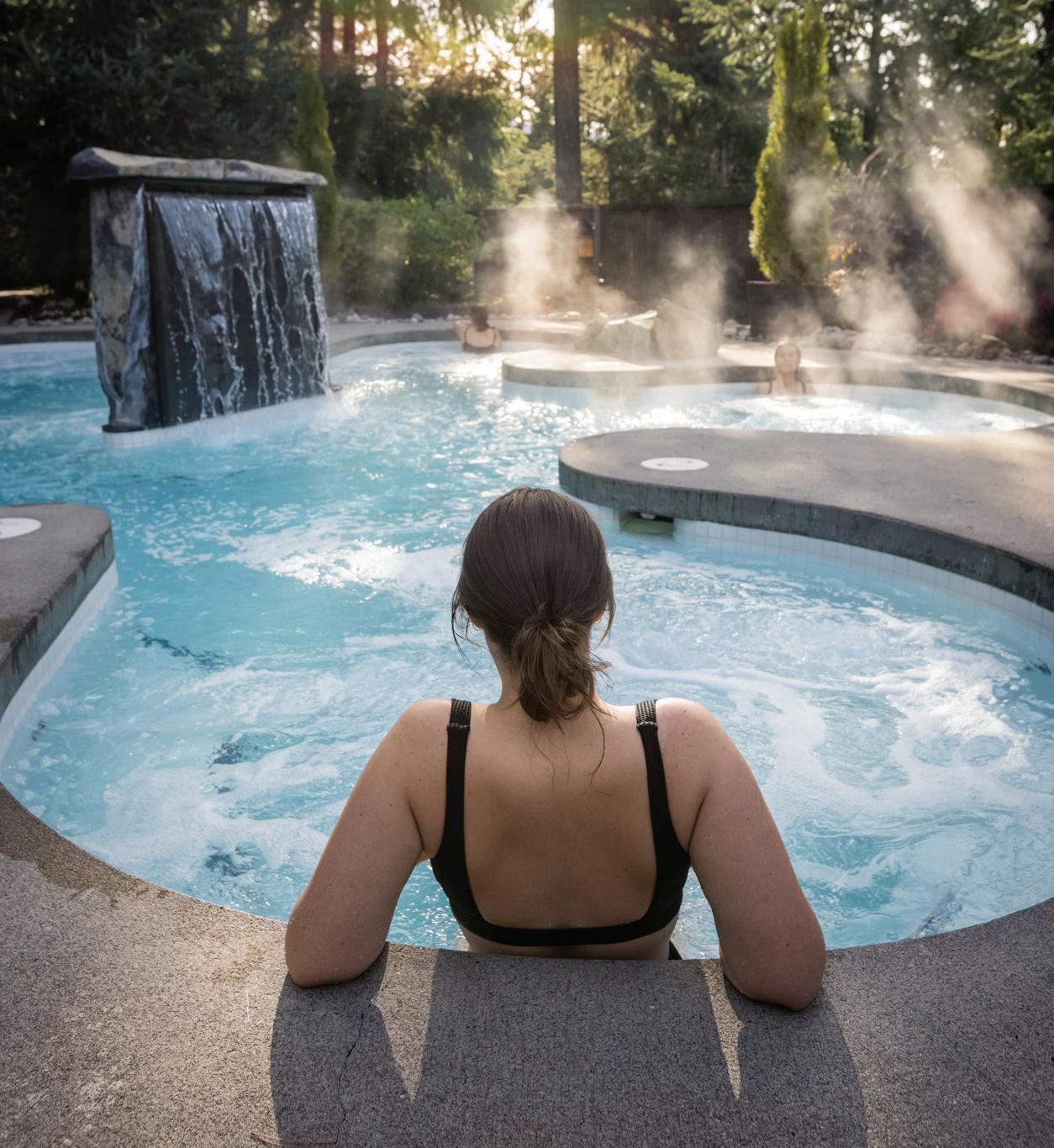
company. They’ve grown from a husbandand-wife company; they’ve not come from huge pockets. So it’s all built on that success.”
The pandemic brought with it another shift in direction, as Whistler Cooks’ payroll dwindled to just five employees (they quickly hired their staff back, thanks to COVID relief funding, and now count about 100 employees), and catering gigs dried up left and right.
“We don’t see that horizon on catering ramping up as quickly as it was before,” Cray said.
Whistler Cooks first expanded into the restaurant space with the opening of Hunter Gather in 2017, and has continued expanding in recent years, first with the launch of its food delivery service, Fridge Full, in 2019, before the company bought Cranked last year.
“We don’t invest to make these moves without seeing the route to success. And that’s in everything: that’s in capital expense, that’s in expansion and acquisition, that’s in investment in the team,” Cray said. “You have to see how it’s going to provide success, and that’s the equation that we’re always working off of.”
Learn more at mileoneeatinghouse.com n
NEWS WHISTLER
18 OCTOBER 20 , 2022 November One Month Pass $ 219 U N L I M I T E D A C C E S S M O N D AY T O F R I D AY I N N O V E M B E R Buy in person at the spa, terms and conditions apply S C A N D I N AV E . C O M








Whistler’s Halloween at Tapley’s Farm set to return for 39th year
TRICK-OR-TREATING ON EASY STREET KICKS OFF AT 5:30 P.M.
BY ROBERT WISLA
AS THE leaves turn their bright oranges, reds and browns and the evening nights begin to cool, the hallowed eve creeps nearer—along with the return of one of Whistler’s favourite Halloween traditions at Tapley’s Farm.
The annual Tapley’s Farm Halloween is one of the longest-running events in the resort, having started way back in 1983, and is now going on its 39th year (it is second only to the Whistler Children’s Festival, which held its first instalment in June 1983). The Tapley’s Farm neighbourhood in Whistler Cay will once again be closed to traffic from 4 p.m. onward on Monday, Oct. 31, with trick-or-treating starting at 5:30 p.m. and going till 8 p.m.
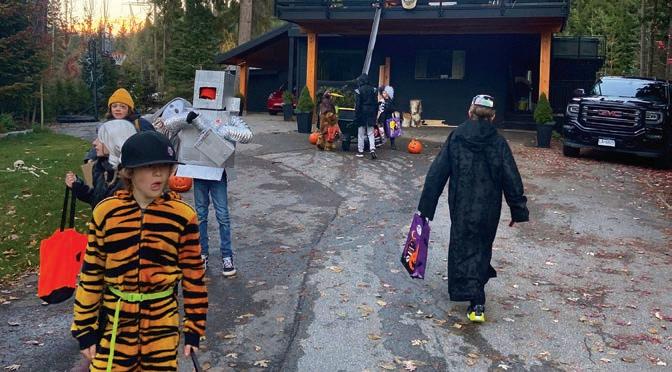
Residents in the neighbourhood pull out all the stops to create a spooky, magical and welcoming atmosphere for children and families. Festivalgoers can look forward to carved pumpkins, themed houses and great costumes.
A fireworks display will kick off at 7:30
p.m. at the lower fields of Myrtle Philip Community School. The show is sponsored by Nesters Market and presented by the Whistler Fire Rescue Service.
“It’s just a few hours of lots of fun, and we’re excited that it’s returning again because, of course, we had to close it off for just residents during the pandemic,”
said Shauna Hardy Mishaw, one of the event’s organizers.
“Every year, it just seamlessly comes together, and it’s thanks to having a very engaged and generous community ... It’s really fun to do, and we’re delighted to welcome everybody into our neighbourhood.”
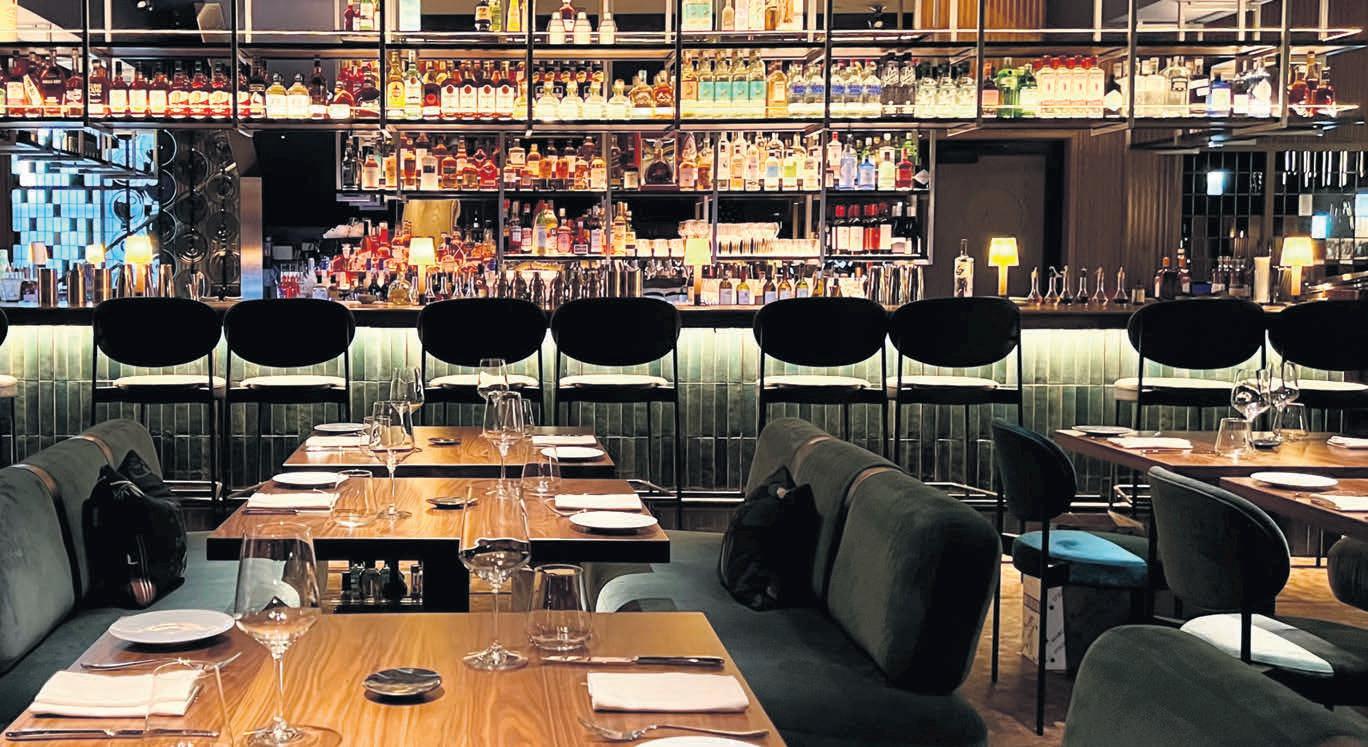
Due to limited parking in the

neighbourhood, a free Park and Spook shuttle, organized by fastPark and provided by BC Transit and the Resort Municipality of Whistler, will run from the Marketplace parking lot to Tapley’s Farm from 5:15 p.m. to 8:25 p.m.
Parking in the Marketplace parking lot will be free from 5 p.m. to 9 p.m., compliments of Marketplace merchants. Tapley’s Farm residents ask people to bring donations (cash or food) to the Whistler Food Bank for its “We Scare Hunger” campaign.
People can drop off food and cash donations at the entrance to Tapley’s Farm. Last year, more than 1,000 people attended the festival, raising more than $1,100 in cash donations and 170 kilograms of food for the food bank.
Collection boxes for candy donations will be set up at all of Whistler’s schools, daycares and supermarkets in the lead-up to Halloween. People are encouraged to donate candy to help meet the enormous demand from trick-or-treaters in Tapley’s Farm.
Additional goodies will be provided by Nesters, Fresh Street Market, the Grocery Store, Your Independent Grocer, and Creekside Market. n

NEWS WHISTLER
ON OCT. 31
SPOOKTACULAR Families from all around Whistler are invited back to the Tapley’s Farm neighbourhood to collect their fair share of spooks and sweet treats on Oct. 31.
FILE PHOTO
20 OCTOBER 20 , 2022 Restaurant+Barfrom5pm LateNightBar DJ9pm-12am 4COURSEMENU$30 @wildbluerestaurant 4005WhistlerWay WhistlerVillage CLOSEDSUNDAYS/MONDAYS "Whistler'sHottestNewRestaurant"VancouverMagazine privateunderground guestparking scanfor reservations orcall 604.962.2233 FLAVOURSOFFALL TUESDAYS/WEDNESDAYS/THURSDAYS
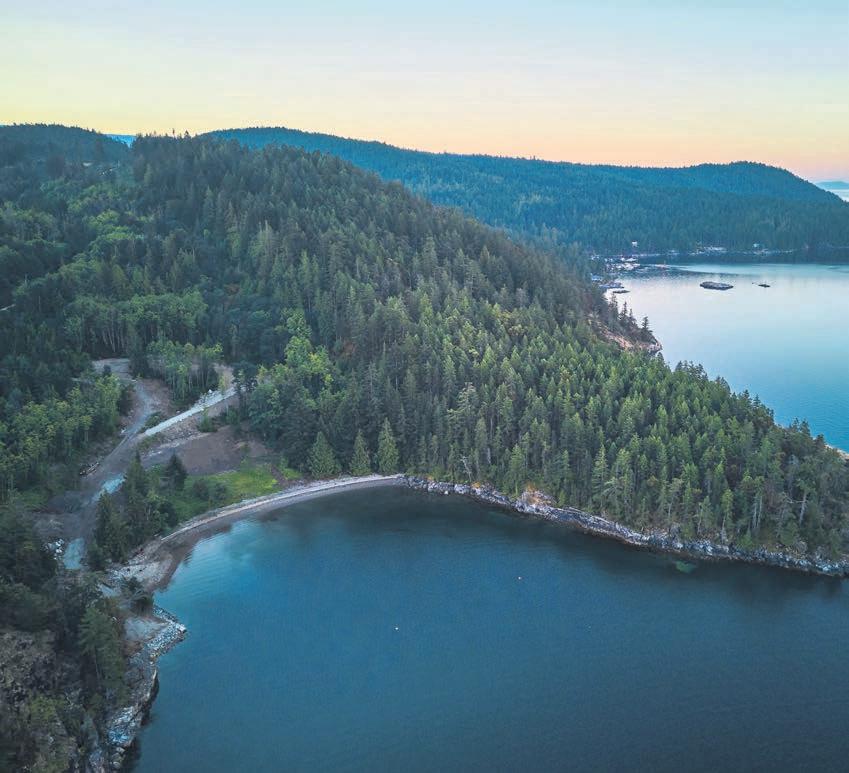


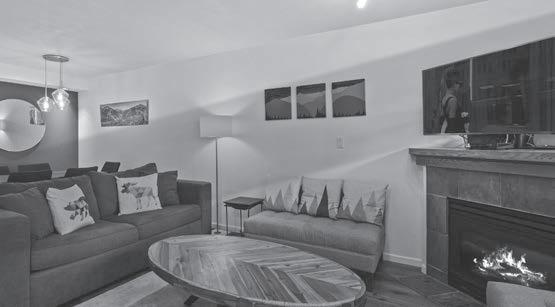
















•Stunning400-metrebeachfront •NoBuildingpermitsrequired •BCHydroconnected •WellandSepticservicing •Roadaccess E&O.E.Pricesaresubjecttochangewithoutnotice.Thedeveloperreservestherighttomakechangesandmodificationscontainedherein withoutnotice. Get Outta Town Forested3-7acreparcelsatthe entrancetoDesolationSound JasonZroback 604.414.5577 jason@landquest.com basecampds.com PRICEDFROM $349,000-$499,000 SOLD! JoshCrane WhistlerREALTOR ® 604.902.6106|josh@joshcrane.ca whistlerrealestatemarket.com Signupforaweeklysalesreportofnewandsoldlistings! 120-4090WhistlerWay Whistler,B.C.V8E1J3 Firsttimetomarket!BuiltbyDurfledConstructorsthispostandbeammountain home—includinga1.5bedsuiteabovea3-bayheatedgarage—isreadyfor youandyourfamilytoenjoy.LocatedinWhistler’sprestigiousneighbourhood ofGreenLakeEstates/NicklausNorthGolfCourse,8060NicklausNorthBlvd isforthediscerningbuyerwhoappreciatesqualitycraftsmanshipandlocation. Thisimmaculatehomesitsjustacrossthe1stholeteeboxesandonlyafewsteps awayfromtheiconicNicklausNorthClubhouse.Fromyourdoorstepyouhave accesstopicturesqueGreenLake,LostLakeBike/XCSkiTrails,ValleyTrail, WhistlerAirfloatplanedock,RiverofGoldenDreams,andanawardwinning JackNicklausdesignedgolfcourse.Zonedfornightlyrentalsthishomeoffers theflexibilitytogeneraterevenuewhennotusedpersonally. 8060NICKLAUSNORTHBLVD. GreenLakeEstates-NicklausNorth 5bed•5bath•3618sqft Provenrevenueproducer.#20Sunpathgrossed$116,000innightlyrevenue Aug2021-Aug2022.Thisrenovatedtownhomefeaturesitsownprivatehot tub,stainlesssteelappliances,gasfireplace(stratafeeincludesgas),smart homeequipmentforconvenienthosting(lock,thermostatsandlights),new flooring,newcountertops,andsomuchmore.#20Sunpathcomesfullyturnkey andreadyforyoutousepersonallyorcontinueenjoyingtherevenue.Sunpath isaquiet,exceptionallywellmanagedcomplexandlocatedintheheartof WhistlerVillage,hasitsownheatedsaltwaterpoolandcommonhottub,secure undergroundparkingwithplentyofspotsforguests.Best2bedroominvestment propertyinWhistlerVillage! 20-4325NORTHLANDSBLVD Sunpath–WhistlerVillage 2bed•2bath•851sqft $1,729,000 SOLD! $6,499,000 OCTOBER 20 , 2022 21
Whistler and Pemberton students have their say on municipal councils
STUDENT VOTE BRINGS DEMOCRACY, CIVIC EDUCATION TO THE CLASSROOM
BY ROBERT WISLA
THE DAY before B.C. voters headed to the polls to decide the future of their municipal governments, students across the province also got a chance to participate in democracy through the Student Vote program.
Student Vote is a direct learning opportunity for students across the province to learn about politics, the powers of different government levels, and the election process.
Across the province, 55,968 students from 461 schools in 99 municipalities participated in the student vote this year. While the results are still slowly trickling in, the preliminary results paint an interesting picture of who would be elected if the youngest generation could vote.
If students in Whistler got to elect the mayor, council, and school trustees, the results wouldn’t be all that different from what took place on general election day.
As of Pique’s weekly press deadline, the results had only come from Myrtle Philip Community School and Spring Creek Community School, with Whistler Secondary School still to report. Still, the preliminary results indicate that the
students of Whistler share a similar mindset to the general electorate.
According to the student election results, Mayor Jack Crompton would still win re-election, taking 172 votes—136 more than his closest competitor Marcus Culver, who gained 36 votes. Brian Walker came third with 19 votes.
The top three vote-getters on Whistler’s student-elected council consisted of Jen Ford, who came in first place with 148 votes; Ralph Forsyth (109 votes); and Jessie Morden in third with 91 votes. Cathy Jewett, Arthur De Jong, and Dawn Titus rounded out the slate with 87, 86 and 78 votes, respectively.
As for the rest of the council candidates, Melinda Lopez received 77 votes, followed by Sarah Rush (72), Brendan Ladner (71), Jeff Murl (67), Gordon Jeffrey (56), Curtis Lapadat (56), Rhonda Millikin (55), Tina James (44) and Gabriel Pliska (29).
When it comes to the school board, the elected body that arguably has the most influence on the students’ day-to-day lives, the trustee election result matched the general election result, with Cynthia Higgins coming out on top with 131 votes, followed by Rachael Lythe (99) and Deb Bordignon (97).
In Whistler, the student vote at Myrtle Philip included seven classes of students from

Grades 3 to 7, with a little more than 100 students participating in the mock election.
Myrtle Philip students received presentations in person and over Zoom from 11 of the 15 council candidates, who informed the students about what they hoped to accomplish if elected.
Afterwards, the students held a classroom discussion about what they heard, then went home to talk with their parents before finally doing a mock election, with ballot boxes and all.
“It was actually quite neat to hear all the different things, and then have the conversation after about what they thought, and why they thought they were impressed with somebody or they weren’t impressed with somebody, and whether they answered the questions, or whether they were more general,” said teacher Jeanette Unruh.
Some students even questioned how the candidates would fund their more lavish proposals, showing that, although most of the students are not yet taxpayers, they still have fiscal prudence in mind when casting a ballot.
So what were the significant issues for Whistler’s youngest demographics?
Interestingly, the key issues Myrtle Philip students brought up are similar to some of the topics raised by the general
electorate: housing, the Valley Trail, labour shortages, and stores closing early, to name just a few.
“We had a big conversation about housing, because they found that some of their friends have had to leave town, and some of their parents have to work more at their businesses because they don’t have enough staff,” said Unruh.
Speed from e-bikes on the Valley Trail was also a concern for many students, as some said they had near-misses with cyclists. According to Unruh, the idea of speed bumps or a separate bike trail came up in class discussions a few times.
Up the highway in Pemberton and Mount Currie, Signal Hill Elementary and Xet’olacw Community School also held student votes. In the race for mayor, Mike Richman came out on top with 43 votes, followed by 18 for David Mackenzie and 14 for Chadi Abouhalka.
Council-wise, students elected Katrina Nightingale (25 votes), Jennie Helmer (24), Ted Craddock (22) and Derek Graves (20), who withdrew from the running but not before his name could be removed from the ballot. Laura Ramsden and Eli Zysman received 19 and 10 votes, respectively.
View the full province-wide student vote results at studentvote.ca/bclocal2022. n
Truth be told.
NEWS WHISTLER
22 OCTOBER 20 , 2022 FoodLoversUnite! Bestpricesonlocallysourcedproduce. RainbowStore 8200BearPaw Trail Whistler 604-932-1128 Checkout WeeklyFlyers instore oronlineat: yourindependentgrocer.ca
Our communities are powered by local newspapers. Celebrate how trusted journalism sparks important conversations at nationalnewspaperweek.ca
































































Community Consultation Collaboration Thankyouvotersfor yourcontinuedsupport! Ilookforwardtoservingourcommunitywiththe newCouncilforthenextterm. Thankyoutoallthecandidates,yourparticipation madeourcommunitybetter. AuthorizedbyCathyJewett-cojewett@gmail.com FALL SPECIALS 3 for $44 Course Dinner AVAILABLE SundayToThursday Fullportionsizes Choicesfrom entiremenu ONLYIN... TheAttic ABOVE21STEPS Buy2Appetizers Get1Free AVAILABLE SundaytoThursday RESERVATIONS 604.966.2121 www.21steps.ca THANKYOU OCTOBER 20 , 2022 23
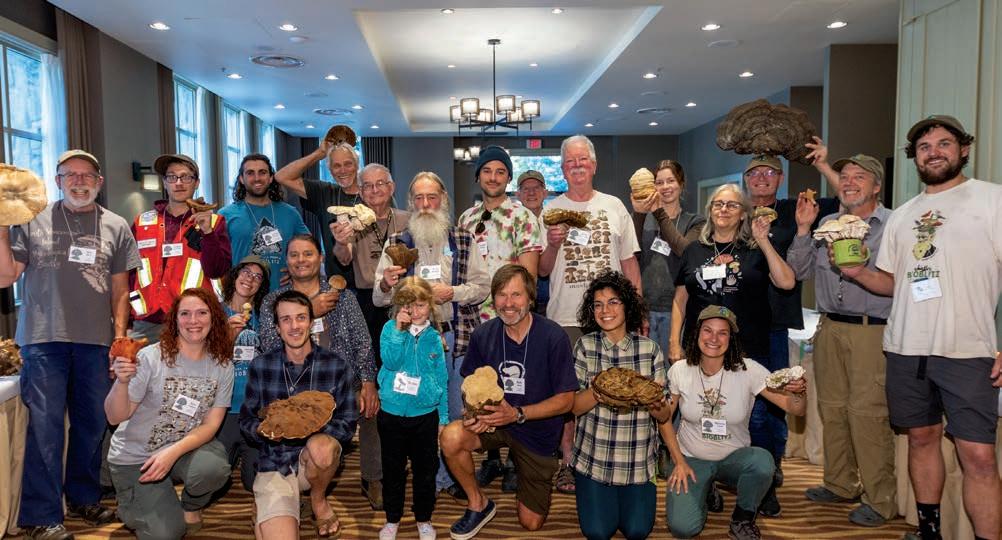
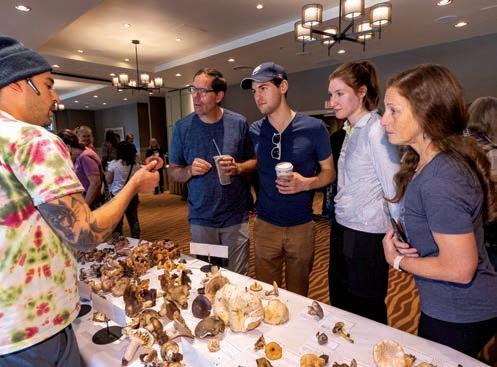

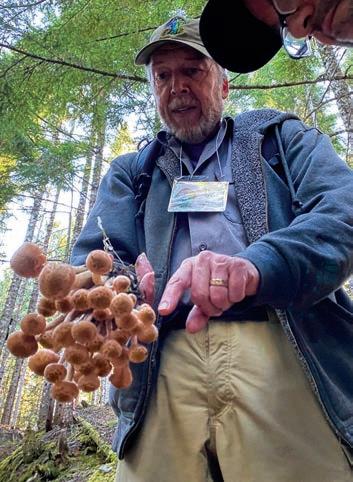






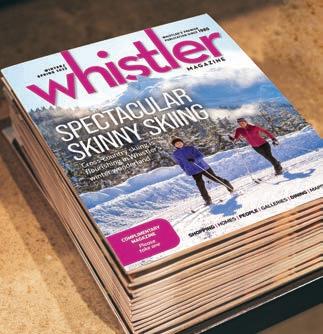

 1 20 YEARS OF FUN(GUS) There’s nothing quite like a Fungus Among Us group shot! Members of the Whistler Naturalists and festival attendees show off their finds at the 20th annual Fungus Among Us festival on Saturday, Oct. 15. PHOTO
BY JOERN ROHDE / COURTESY OF THE WHISTLER NATURALISTS 2 WEIRD AND WONDERFUL Winner of the Fantastic Fungi Foto Contest, Weird and Wonderful category. PHOTO BY NICOLE MCHUGH 3 FOREST FINDS Attendees take in the display tables at Legends Hotel in Creekside on Saturday, Oct. 15.
PHOTO BY JOERN ROHDE / COURTESY OF THE WHISTLER NATURALISTS 4 FUNGAL FUN Winner of the Fantastic Fungi Foto Contest, Fungal Fun category.
PHOTO BY JOHANNA ALDRED 5 WALK AND TALK Mushroom guru Thom O’Dell shares some of his knowledge during the Walk with Gurus event on Saturday, Oct. 15. PHOTO BY BRADEN DUPUIS
1 20 YEARS OF FUN(GUS) There’s nothing quite like a Fungus Among Us group shot! Members of the Whistler Naturalists and festival attendees show off their finds at the 20th annual Fungus Among Us festival on Saturday, Oct. 15. PHOTO
BY JOERN ROHDE / COURTESY OF THE WHISTLER NATURALISTS 2 WEIRD AND WONDERFUL Winner of the Fantastic Fungi Foto Contest, Weird and Wonderful category. PHOTO BY NICOLE MCHUGH 3 FOREST FINDS Attendees take in the display tables at Legends Hotel in Creekside on Saturday, Oct. 15.
PHOTO BY JOERN ROHDE / COURTESY OF THE WHISTLER NATURALISTS 4 FUNGAL FUN Winner of the Fantastic Fungi Foto Contest, Fungal Fun category.
PHOTO BY JOHANNA ALDRED 5 WALK AND TALK Mushroom guru Thom O’Dell shares some of his knowledge during the Walk with Gurus event on Saturday, Oct. 15. PHOTO BY BRADEN DUPUIS
1 5 2 43 NEWS WHISTLER 24 OCTOBER 20 , 2022 We’reMakingRoom ForaNewSeason 20%-50%off OpenDaily10am-6pmOR www.thebeachwhistler.com Swim.ActiveLifestyle-VotedWhistler’sFavouriteClothingStore Thankyoutotheothercandidates, GabrielPliska,TinaPashumati James,RhondaMillikin,SarahRushforWhistlerCouncil,BrendanLadner, MelindaLopez,DawnTitus,CurtisLapadat,GordonJeffrey,MarcusCulver andBrianWalker.Youeachworkedsohardduringthiscampaign.Iwant tokeepanopenlineofcommunicationwithallofyouandhearanyideas, opinionsandcriticismyoumayhavethatcanhelpthiscommunity. Thankyoutotheincumbents, JenFord,ArthurDeJong,CathyJewett, RalphForsythandJackCromptonforbeingamazingmentorsandleaders. Also,JeffMurl,forrunningagreatcampaignandgivingmetipsonpublic speaking.Ican’twaittoworkwithyou. ThankyouDuaneJacksonandJohnGrills forbeingincrediblyeffective councillorsandyourtirelesseffortsovertheyears.Iamhonouredtohave yoursupportandwillworkhardtomaintainyourlegacyofcollaboration. ThankyoutothecommunityofWhistler. Iamexcitedforthisnext chapterandtobeabletoserveyou.ItrulybelieveIcandotheworkthat needstobedonesoyoucanallflourishhere. -JessieMorden Get your new edition in hotel rooms and select locations around Whistler. NEW WINTER WHISTLER MAGAZINE IS OUT! /whistlermagazine
NOTICEOFPUBLICHEARING (ELECTRONIC)



Thursday,October27,2022,7PM




PUBLICNOTICEisherebygiveninaccordancewithSection466oftheLocalGovernment ActthataPublicHearingwillbeheldelectronicallyregardingthefollowingbylaw: Squamish-LillooetRegionalDistrictElectoralAreaCOfficialCommunityPlanBylaw No.689,1999,AmendmentBylawNo.1746-2022
Thepurposeoftheamendmentbylawistocreateageneralframeworkofbestdesign practicesaimedatensuringlivabilityandresilienceofnewmulti-familydevelopmentsin ElectoralAreaC.TheamendmentbylawisintendedtoapplytotheentiretyofElectoral AreaCasshownonthemapbelow:
WWW.WHISTLERLAWYER.CA adam@whistlerlawyer.ca | 604.905.5180




PROPOSEDCHANGES
•Defining“affordablehousing”asrentalorownershiphousingpricedsothat monthlypaymentsarelessthan30%ofgrosshouseholdgrossincome.Affordable housingtypescanincludeemergencyshelters,transitionalhousing,supportive housing,socialandco-ophousing,andbelow-marketrentalhousing,definedas pertheBCHousingglossaryofterms.

•Addingpoliciesthatencourageprovisionofaffordablehousingasapriorityin communitycontributionsmadebydevelopers.
•Addingdesignguidelinesformulti-familyhousing.Designconsiderations includecharacter,massing,solarorientation,streetsetback,minimumunitsize withafocusonfamilyfriendlyunitsize,storage,kitchenlayout,outdoorspace, stormwaterrunoff,parking,andlandscaping.
•Addingpoliciesthatsupportcollaborationwithcommunitystakeholdersandnonprofitorganizations.
INFORMATION
Acopyoftheproposedbylawsandrelevantbackgrounddocumentsmaybeinspected attheRegionalDistrictoffice,1350AsterStreet,Pemberton,BC, duringofficehours 8:00AMto4:30PMfromOctober10,2022toOctober27,2022notincludingweekends andstatutoryholidays,orelectronicallybycontactingSLRDstaff.Thepublichearingisto bechairedbyElectoralAreaCDirectorRussellMackasadelegateoftheSLRDRegional Board.











PUBLICPARTICIPATION
Allpersonswhobelievethattheirinterestinthepropertyisaffectedbytheproposedbylaw shallbeaffordedareasonableopportunitytobeheardortopresentwrittensubmissions respectingmatterscontainedinthebylawatthepublichearing.Allpersonscan1)submit writtencomments,and/or2)makeanoralpresentationLIVEviaonlinevideoorphone conferencing(yourimagewillnotbebroadcasttotheBoardorthepublic).


1.SubmitWrittenCommentstotheBoard:

Writtensubmissionsmustbeaddressedto“SLRDBoardofDirectors”andincludeyour nameandmailingaddress.Until4:00pmonOctober26,2022,writtensubmissionswill bereceivedatthefollowing:
Email: planning@slrd.bc.ca
HardCopy:Squamish-LillooetRegionalDistrict PlanningDepartment POBox219,Pemberton,BCV0N2L0
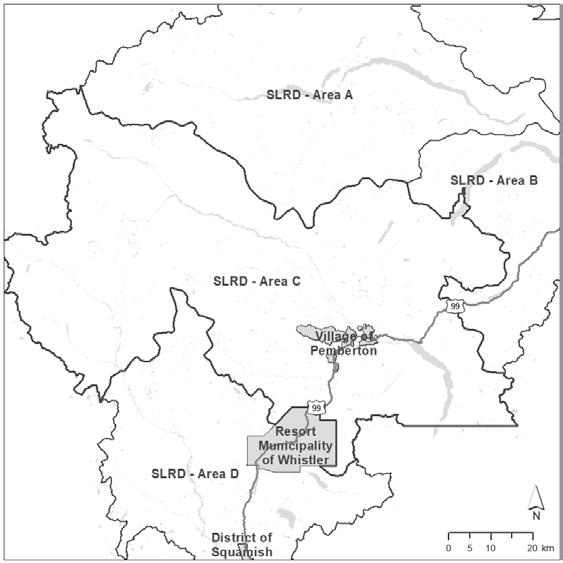




WrittensubmissionswillalsobeacceptedonOctober27,2022between8:00AMandthe timewhenthemotiontoclosethePublicHearingismade.Duringthistimeframe,written commentsmustbesubmittedbyemailto:kneedham@slrd.bc.ca


2.ParticipateviaVideoandPhoneConferencing

TheelectronicPublicHearingwilltakeplaceOctober27,2022at7:00PM.viaonline videoandphoneconferencing.ThePublicHearingwillbeconductedusingZoomvideo conferencing.Noregistrationisrequired.Log-indetailswillbepostedtothenoticepage: www.slrd.bc.ca/inside-slrd/noticesthreedayspriortothePublicHearing.Youmayalso callthePlanningDepartmentthreedayspriortothePublicHearingat604.894.6371to obtainthelog-ininformation.

OCTOBER 20 , 2022 25
Pemberton returns mayor to top spot, elects mix of new and familiar faces to council
VOTER TURNOUT UP SLIGHTLY FROM PAST YEARS
BY ALYSSA NOEL
VILLAGE OF PEMBERTON council is set to welcome two brand new faces to its table after the Oct. 15 municipal election.


Katrina Nightingale, a local teacher who won 587 votes, and lawyer Laura Ramsden, 559 votes, will join incumbent Ted Craddock, 567 votes, and Jennie Helmer, a two-term councillor who last served in 2018. Helmer garnered 748 votes.
Mayor Mike Richman, meanwhile, won his third term with 543 votes, edging out David MacKenzie’s 303 votes and Chadi Abouhalka’s 34.
“The most exciting part about local government is you bring five different people together,” Richman said. “We have the ability to change pathways to each other’s brains, bring new ideas to each other and, collectively—it might sound cheesy, but I do believe it—come to the best decision for Pemberton. I think we have that in front of us. We have five different individuals and I think it’s going to be really exciting.”
For his part, Richman said he was hopeful he would face re-election, but he didn’t take anything for granted after he was acclaimed in 2018.
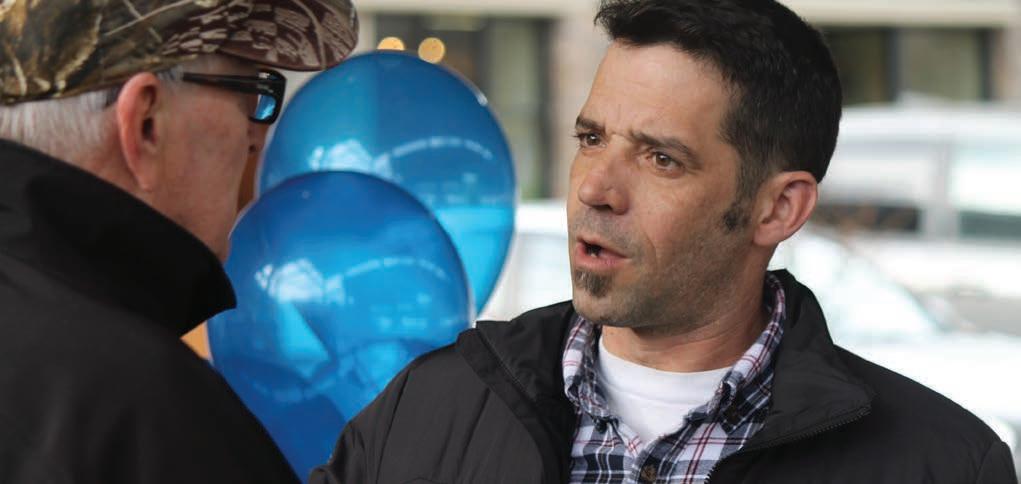
“This was a different campaign and a different time with everything that’s going on in the last year,” he said. “I’m feeling relieved, I’m feeling tired, and I’m feeling excited.”
Pemberton’s two new councillors, likewise, say they went into election night feeling hopeful—and now they’re ready to learn.
“I’ve never worked in municipal government in a political sense,” Ramsden said. “There’s definitely going to be a learning curve, but I do think, given my background, I’m in a position where I can respond to that learning curve in a pretty quick way.”
While she’s only lived in Pemberton for two and a half years, Ramsden will offer a perspective shared by a large demographic of locals.
“[I’m] someone relatively early in their career. I’m hoping to have a family sometime soon. Affordability, housing, and employment in the area, those issues have a very personal connection for me,” she said.
Nightingale, meanwhile, pointed out
“Everyone who ran is doing it because they love Pemberton.”
Nightingale had to overcome major emotional challenges during the campaign following the death of her mother. While she nearly pulled out of the race, in the end,
natural environment,” she said. “That was the overriding thing I’ve learned from people, and solidified my truth as well. I think I’ve been very clear on the lens I see decisionmaking [through]: that stewardship lens.”
Voter turnout for the election was 36.6 per cent in Pemberton, up from both 2018, when it was 30.1 per cent, and 2014, which saw 35.6 per cent of eligible voters cast ballots.
“Municipal government really affects your day-to-day life,” Richman said.
“[Municipal politicians] are most accessible to you. It does make me sad that local elections get less turnout than federal or provincial. I would like to see closer to 50 per cent at least.”
that the newly elected council represents a strong cross-section of the community, with backgrounds ranging from health-care to agriculture and the environment.
“I know for all of us, it wasn’t a reactionary thing that made people want to [run]; it was a proactive thing,” she said.
she persevered.
“I knew, truly, that she would’ve wanted me to. I know now with four years ahead, it was absolutely the right decision,” she added.
One lesson Nightingale learned through campaigning that she plans to bring to her new position? “People are drawn here for the
He added: “I did sense, out on the street, people were more engaged than in past elections … I’m really hopeful that the conversation will stay open.”
Meanwhile, for school trustee in the Squamish-Lillooet Regional District’s Electoral Area C, voters re-elected Rebecca Barley for a fifth term. n
NEWS PEMBERTON & THE VALLEY
BACK FOR MORE Pemberton Mayor Mike Richman will return to the Village’s highest office for a third term, with a council made up of familiar faces and newcomers.
FILE PHOTO
“Everyone
who ran is doing it because they love Pemberton.”
-
KATRINA
NIGHTINGALE 26 OCTOBER 20 , 2022 604.932.3211 332-4370lorimerroad s.shaw@raceandco.com RACEANDCOMPANY.COM WILLS &ESTATES BUSINESS LAW REALESTATELAW FREECONSULTATION Meetwithmevia videoconference, telephone,andemail. SHOLTOSHAW THANKYOU! ThePembertonOffRoadCyclingAssociationwouldliketothankeveryonewhocameoutand supportedourannualFundraiseronSaturday,Oct.15. AspecialthankstoTanisandthestaffattheLegionforhostingus, DJJtotheUforthetunes,andallthebusinesseswhodonatedsilentauctionitems: AlpX(BlackcombHelicopters),SweetSkills,BarnyardFitness,CanadianWildernessAdventures,The AdventureGroup,GarbonzoBike&Bean,CanSkiVillage,WhistlerBlackcomb,ChromagBikes,InLine Physiotherapy,LeaningCedarTherapy-JulieSickel,LuPrints,MyntSalon,Lil'watLands&Resources, Peaks'nSwellsSurfCamp,PembertonBagCo,PembertonDistillery,PembertonValleyBuildingCentre, VillageYoga,VanessaStarkArt,LoamCollective,WhistlerBrewing,CrystalMountainHotels,Melo Maintenance,RawPhysiotherapy,PembertonBrewingCompany,IdiotSavantArt,CathyBennsMassage, SouthsideDiner,Helmer’sOrganic,TourismPemberton SpecialthankyoutoTraceyCruz,Aime&DanFear,Emma-JaneHeatherington,Ian&SuzyKruger,Ming Sartee,JenFisher,StevePetrie,NatalieLangmann,SofiaTowersandSkylarRodierforhelpingtomake thisagreatcommunityevent.-PORCABoardofDirectors PembertonOffRoadCyclingAssociationMembershipandEventInfo: www.porcabikes.com

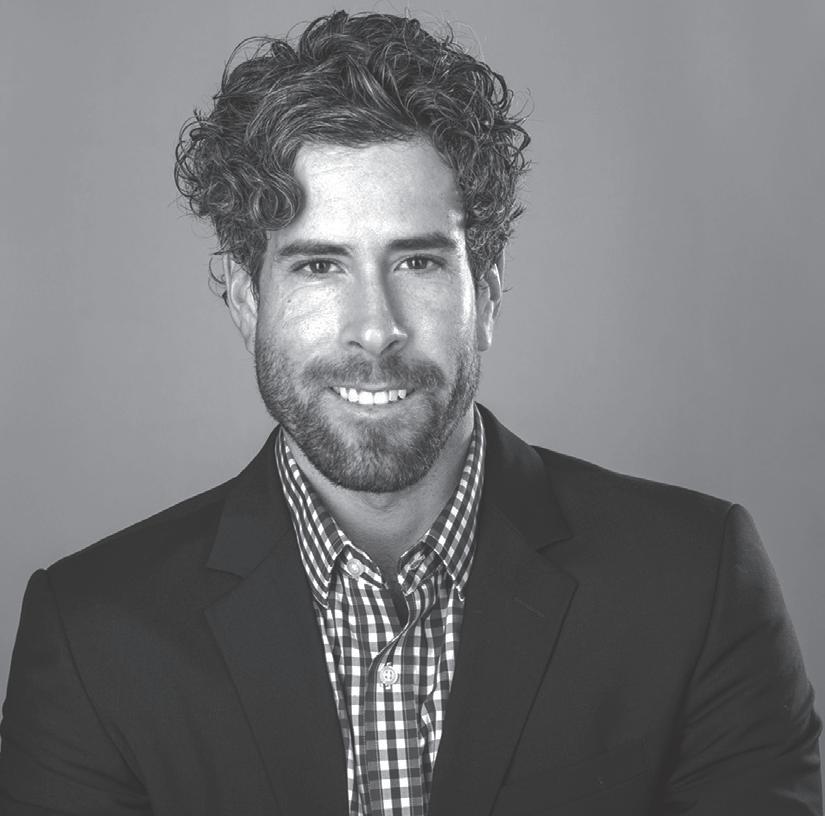
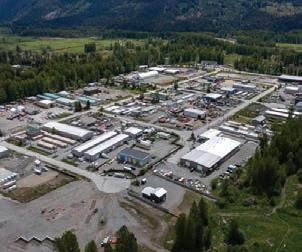



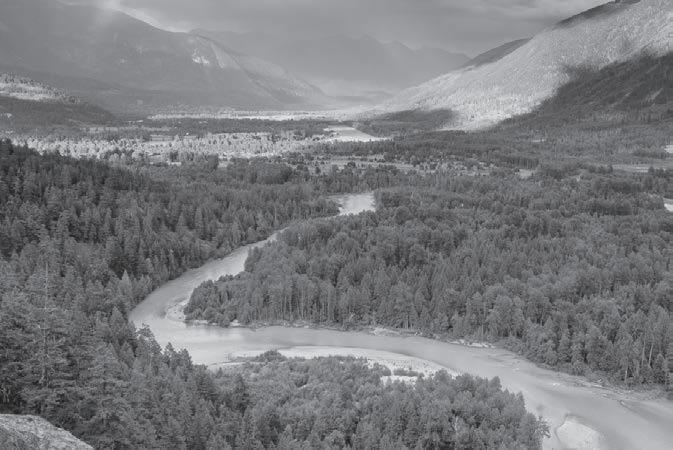
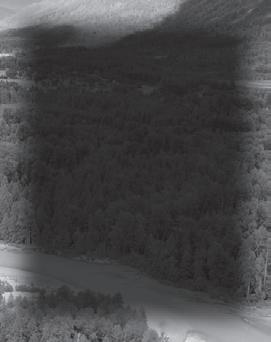
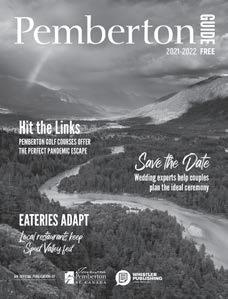

THECHEAKAMUS COMMUNITYFOREST Gotowww.cheakamuscommunityforest.com News/Updatestoregister. www.cheakamuscommunityforest.com isholdingavirtualpublicopen houseon Wednesday,October26 from4–5:30p.m. Itwillshareinformationonthe2022 and2023harvestingplans, andotherpriorities. Discussiontofollow. Registrationrequired. TimLischkoff,CPA,CA/tim@gskllp.ca/604-892-9100 www.gskllp.ca Specializinginaccounting andtaxservicesforcorporations andtheirshareholders. Pleasecontactmefor aninitialno-charge confidentialconsultation. THE 2021-2022 PEMBERTON GUIDE on stands now! OCTOBER 20 , 2022 27
Trees help cities tackle climate crisis and inequality
ENVIRONMENTAL RACISM or discrimination can take many forms. It can mean building polluting factories or mines next to Indigenous communities, or “relocating” marginalized or racialized people to make room for an industrial project or dam.
To find an urban example, look to the trees. Research shows wealthier neighbourhoods usually have better tree and shrub cover than poorer, more diverse neighbourhoods. That’s important for a number of reasons. First, most of us live in cities—80 per cent in Canada. Beyond
BY DAVID SUZUKI

the fact that they look nice and increase property values, trees and shrubs reduce pollution and noise, keep air cooler, decrease flooding and runoff, make cities more resilient, improve mental health and wellbeing, and provide shelter and habitat for numerous animals.
Trees’ ability to cool and shade is particularly critical as the planet heats up. Sadly, people in areas with fewer trees also often lack air conditioners or public buildings where they can get relief.



Giving more people better access to treed green spaces is something everyone can get behind. David Suzuki Foundation studies in Montreal, Ottawa and Toronto found residents in all three cities are willing to invest in “an urban forest with a higher density of trees, a wider diversity of tree
trees and green spaces in urban areas has already reduced heat in cities in Europe and the U.S.
But just as urban life can be difficult for residents in areas lacking green spaces and trees, it can also be difficult for trees. “Trees are not given enough room, they have poor soil quality and limited access to water,” University of British Columbia assistant forestry professor Lorien Nesbitt told the West End Journal. “They’re usually planted in an environment after all the grey infrastructure has already gone in. We need to create more space for trees in our city, and to prioritize protecting them.”

A recent study in Nature found that “more than two-thirds of tree species across cities worldwide are facing severe climate risks, undermining their roles in climate adaptation and other ecosystem services they provide.” The researchers recommend cities everywhere take immediate measures such as planting more trees and shrubs, especially climate-resilient ones, and channelling rainfall into rain gardens or tanks.
An urban forest is not, after all, the same as a wild forest, with its incredible diversity, mother trees, interconnected mycelial networks and abundance of wildlife. Urban plantings need to be planned and executed in ways that ensure resilience, including increasing tree and shrub diversity. The Foundation study found that, just as tree cover is lacking in neighbourhoods with socio-economically vulnerable populations, tree diversity was also proportionately lower, increasing “the risk of destruction of a larger part of the urban forest in these neighbourhoods following a disturbance.”
species, the presence of street shrubs.”


The studies—conducted by researchers at the University of Quebec in Outaouais and University of Montreal—point out that, in terms of resilience, social acceptance and economic viability, natural infrastructure is one of the most effective climate adaptation solutions.
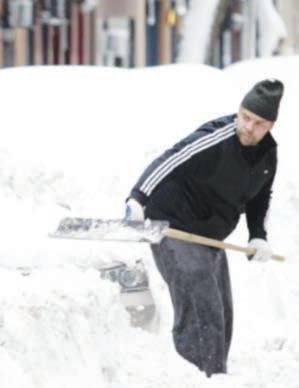


They also noted that “the distribution of vegetation over a city’s territory is generally uneven: poorer or more multicultural neighbourhoods often have a thinner canopy than their richer or white neighbours. These well-documented inequalities can be seen in cities around the world, and Canadian cities are no exception.”
It’s especially important as research shows urban areas are heating faster than rural areas—on average about 29 per cent. A study by scientists at Nanjing and Yale universities found planting trees along streets, creating rain gardens and removing pavement can create a cooling effect and reduce the rate of urban warming. Increasing
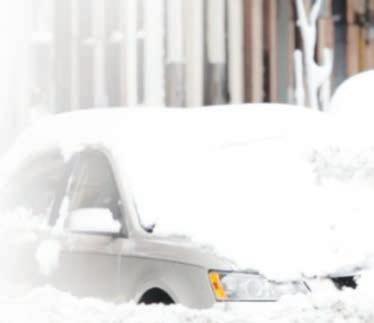
It’s no wonder that research found such widespread support for more urban greening. Not only do trees, shrubs, rain gardens, “Butterflyways” and other green spaces offer numerous benefits for everything from human health and wellbeing to the climate crisis, they can also save enormous amounts of money by reducing health-care costs, making city infrastructure more resilient to extreme weather–related events and even reducing crime.
Greening cities is a crucial part of resolving the climate crisis, but it also offers ways to address the many inequities that poor urban planning has created and climate disruption has exacerbated. It’s an affordable, practical, popular solution with numerous benefits and no real downside.
David Suzuki is a scientist, broadcaster, author and co-founder of the David Suzuki Foundation. Written with contributions from David Suzuki Foundation Senior Writer and Editor Ian Hanington. ■

Trees’ ability to cool and shade is particularly critical as the planet heats up.
SCIENCE MATTERS
28 OCTOBER 20 , 2022 Tel:604-907-8222 • Alltimemoving.ca don’tGETSTUCK BookyourWintersnowremovalnow! Contactusorsignuptoday tosecureyourspot TheFourSeasonsWhistleris lookingtoaddtoouremployee housinginventory! Wearefortunatetohaveexisting,longtermrelationshipswith manylocalhomeandpropertyownersandarecontinuing toexpandourhousinginventory. Whatcanweoffer? CommitmentfromtheFourSeasonsonensuringyourproperty iswelllookedafter,secure,longtermrental,management oftenancybydedicatedHousingTeam,withthepeaceof mindknowingyourpropertyisingoodhands. Doesthissoundlikeitcouldbeafit? PleaseemailOdeta.Bartasiute@fourseasons.com
Hey kids—let’s sue Big Oil!

NO MOVEMENT is legit until it circulates identity collateral. So, when local e-bike entrepreneur and climate advocate Dave Heighway hands me a “SueBigOil” sticker, I feel fully licensed for silently cheering the new rash of lawsuits aimed at the incalculable harm wrought by the criminal malfeasance of the oil-and-gas industry.
BY LESLIE ANTHONY
“Courts aren’t where I want to see the battle to get oil companies to pay their fair share of climate change effects fought—I don’t think anybody does—but it’s the last resort,” says Heighway, who is currently organizing to recruit local volunteers and collect signatures on a petition for Whistler council to join other B.C. municipalities (notably Vancouver) who’ve declared intentions to set aside $1/citizen for a group legal fund.
Not everyone agrees with such earmarking, but as Andrew Gage, lawyer with the group behind the project (suebigoil.ca), West Coast Environmental Law, asked on Twitter: “Do the people upset re: Vancouver spending $1 per resident on a joint class action to recover #climatecosts understand that the city needs to spend $1 BILLION for protection against rising sea levels (> $1500/resident) + more for other climate costs?”
They should. And West Coast has a
GAME A soft launch for SueBigOil Whistler takes place Oct. 22 in Alpine.
PHOTO BY LESLIE ANTHONY
de facto plan to get at least some of that cash from Big Oil. Fossil fuels have clearly benefitted modern society, “but we’re now realizing that there were enormous deferred costs to our communities,” they write. “In a society dependent on fossil fuels, we’re all responsible for climate change… Asking companies to bear some of those costs is not about blaming the industry or denying individual responsibility—it’s about acknowledging our shared responsibility.”
Personally, I’m up for more blaming, given that industry has: a) known for decades that burning fossil fuels causes the heat waves, wildfires and flooding we’re now paying billions for in B.C.; b) funded disinformation campaigns designed to mislead the public on science; and c) lobbied vigorously against laws and international agreements to fight climate change.
“Fossil fuel giants have captured governments and banks, extracting megaprofits while the world burns,” says Avi Lewis, Sea to Sky NDP candidate in the recent federal election. “It’s time to sue Big Oil.”

Given the industry’s global track record and, in this country, continued funding of misinformation campaigns while nosethumbing emissions-reduction legislation, it would seem British Columbians agree. In a recent poll, 73 per cent believed climate change was harming them or people they knew, or would do so within a decade, and 69 per cent supported local governments working together to make oil companies pay their share of increasing climate-change costs currently shouldered entirely by the taxpayer. Yes, you and I are shelling out for heat-dome deaths, catastrophic flooding on both coasts, increasing storm damage and wildfires across the country, and disastercash donations to other nations while oil companies rake in record profits—an
estimated $152 billion in Canada alone in 2022 according to the Pembina Institute— their most profitable year ever!
Let that sink in while we look at some history.
In 1896, Swedish Nobel laureate Svante August Arrhenius first estimated the extent to which increasing atmospheric CO2 is responsible for increasing surface temperatures on Earth, suggesting humans might contribute. In the 1960s, American scientist Charles David Keeling recorded steadily rising levels of CO2 at Hawaii’s Mauna Loa Observatory, confirming Arrhenius’s proposition. Science was onto the problem, but what about Big Oil? Well, they were, too.
At a 1959 petroleum conference at Columbia University, scientist Edward Teller introduced the problem of global warming to industry execs. “Whenever you burn fuel,” he explained, “you create carbon dioxide… Its presence in the atmosphere causes a greenhouse effect.” If the world kept using fossil fuels, he warned, icecaps would melt and sea levels would rise. At a 1965 meeting of the American Petroleum Institute, its president, Frank Ikard, detailed a recent report on pollution. “One of [its] most important predictions… is that carbon dioxide is being added to the Earth’s atmosphere by the burning of coal, oil, and natural gas at such a rate that by the year 2000 the heat balance will be so modified as possibly to cause marked changes in climate.”
By the 1970s, oil companies were studying atmospheric CO2 themselves. When they saw these predictions were spot on, denial, coverups and misdirection began. Fast forward to today, and 90 entities—mostly fossil-fuel companies— are responsible for 2/3 of the historical emissions that have raised atmospheric CO2 from 280 to 420 ppm in 200 years; the four
largest oil companies, fully cognizant of the consequences of their actions, accounting for 14 per cent of the total. A solid reason to sue the snot out of them.
In 2019, 28 law professors from across Canada wrote an open letter to B.C. governments encouraging them to sue fossil-fuel companies: “Such a case would be novel in the same way that the first court cases demanding recognition of Indigenous rights or gay marriage, or claiming compensation against tobacco or asbestos companies, were novel ... In our view, existing legal principles could form a solid basis for a lawsuit filed by a local government against fossil fuel companies for local climate costs.”
It’s not without precedent, as dozens of such suits—many launched by young people concerned about their futures— proceed around the world. Notably, in the Netherlands, NGO Millieudefensie recently won a lawsuit against Shell for its role in causing climate change; in the U.S., 20 local governments plus three states are suing fossil-fuel companies. And history is on the plaintiff’s side: Big Tobacco, Big Asbestos, and Big Pharma all learned that if your products cause massive harm, you’ll eventually pay the piper.
“At the moment this is a bite-sized movement, and you can expect it to grow,” says Heighway. And not just because of the stickers.
A soft launch meet-and-greet event for SueBigOil Whistler takes place on October 22 from 4:30 to 6 p.m. in Alpine. Contact Dave at daveinthe604@yahoo.com for details.
Leslie Anthony is a science/environment writer and author who holds a doctorate in connecting the dots.
RANGE ROVER
■ BLAME
OCTOBER 20 , 2022 29
BY ALYSSA NOEL
























































































































FEATURE STORY
HOW A GROUP OF FIVE LOWER MAINLAND SCHOOLTEACHERS BROKE CONVENTION AND CHANGED THE SHAPE OF WHISTLER
30 OCTOBER 20 , 2022
I t had been ordered and was on its way when they hired a woodworker from their school to winterize their Alta Lake cabin.












He came up with his wife and baby to stay onsite while he worked. The girls knew change was coming to Alta Lake; a ski resort was about to be built and they wanted to be able to stay at the cabin comfortably in the winter.
One day, the woodworker and his little family decided to go for a walk, leaving a fire burning in the stove—the only way to keep the cabin warm.
As they made their way up the trail they heard a loud “whoosh.”


When they looked back, the cabin was completely engulfed in flames. The bottom of that old stove had fallen out and the wooden structure didn’t stand a chance.







In the blink of an eye, Witsend was gone.
























‘WE NEVER HAD TIME FOR FUN’









The five Lower Mainland teachers just clicked.


June Tidball and Florence Strachan (whose married name was Petersen) met as young teachers at Burnaby North High School. Florence, today recognized as a Whistler icon, was friends with Jacquie Pope, with whom she played on the Canadian national field hockey team, and Eunice “Kelly” Forster (later Fairhurst), also teachers at the school, while June brought Betty Gray (Atkinson), originally from Armstrong, B.C., into the fold.
As June (whose married name was Collins) put it in an oral history she did for the Whistler Museum back in 2013, the group had been working hard their entire lives: first in high school, then studying to become teachers and working at their chosen profession, as well as summer jobs.


“A lot of us had been the same kind of people,” she said. “We worked hard. We had always worked hard … We all had jobs in the summer and taught in the winter and went through school and we never had time for fun.”



That changed in 1955.
Jacquie and Kelly had been up to Alta Lake (which, for the uninitiated, is what Whistler was named prior to the late ’60s) to stay at Rainbow Lodge— owned by pioneers Myrtle and Alex Philip—and Betty had worked at the lodge during summers as a student at the University of British Columbia.
So when Betty heard Mr. and Mrs. Thomas Masson had put their simple, two-bedroom summer cottage perched above the shores of Alta Lake up for sale, the group decided to meet them and check it out.


Initially, the couple was asking $2,500, but after that meeting they “thought the girls were so nice and were going to appreciate the outdoors that they reduced the price by $500,” according to Florence Petersen’s book, The History of Alta Lake Road.
“Then, when the girls offered to pay cash, they reduced it a further $500 and this included a clinker rowboat, wharf and a toolshed with all the contents besides the furnished cottage.”





The five of them pooled together their money and bought the whole thing for $1,500. (According to various inflation calculators, that would be between $15,000 and $16,000 today.)














Back then, the cabins and homes that dotted Alta Lake all had names. It was an arduous trek from Vancouver to the cabin that helped the girls come up with theirs.
“You’d take the union steamship up to Squamish then you’d have to wait,” June said. “The train was about a couple hours later that went up to Alta Lake. So that interval was taken up by everybody running up to the hotel and getting a case of beer. [The conductor] would give two toots on the train and everybody would come running with their beer … It was a full day just to get up there. The whole trip was dramatic because you never knew what would happen on the train.” (At least once, that included a man in a coconut bra with a whisky-filled spray gun.)
After getting off the train, they had to walk half a mile along the tracks— with their luggage, food, and supplies in tow—and then, to top it all off, climb up a steep, winding set of stairs.





After a particularly rainy trek, Betty “announced she was at her wit’s end and we agreed to be feeling the same way—hence the name,” Florence wrote in her book.






On the surface, Witsend might have just been a cabin owned by five women, but it was notable for the time, as they were the only group of women to own an Alta Lake property together in the ’50s. They were also in their earlyto-mid-20s at the time, when the pressure to settle down, get married, and have children must have been omnipresent. While most of them eventually married and had children, during those summers, being together and having a good time in the outdoors took priority.
In that way, they seemed ahead of their time; arguably, pioneers for present-day Whistler women, many of whom still move to the resort in their 20s to have fun and chase adventure with friends.
“I think they kind of developed their own sisterhood,” says Carol Fairhurst, Kelly’s daughter, in a recent interview with Pique. “They built some amazing memories and a very, very strong bond of friendship, with themselves, with their families. I think they probably were empowered as a group with that independence, with the ability to do something like that. There wasn’t just one of them; there were five. You’ve got that reinforcement of your independence. Those are formative years for young women—and they just had a lot of fun.”
Pat Beauregard, today in her 90s, was a friend of the Witsend girls, and confirmed they just really weren’t that worried about settling down on a timeline. Pat also played on the Canadian field hockey team with Florence and Jacquie, and travelled around the world for games.

FEATURE STORY
THE GIRLS WERE PLANNING TO GET THE OLD POT-BELLIED STOVE FIXED.
The women of Witsend Cabin
OCTOBER 20 , 2022 31
“We had no desire,” she says of marriage. “We all played our sports. It made quite a difference.”

Although, it should be noted, Pat met her husband Denis at Witsend (Denis and other male visitors stayed in a separate “rooster’s roost” suite beside the cabin, Pat recalls) and they eventually got engaged while walking the railroad tracks after a party there one evening.

Witsend brought other couples together, too (perhaps affirming that old adage that love finds you when you stop looking for it). Florence met her husband, Andy Petersen, at the nearby Rainbow Lodge. Dick Fairhurst (Carol’s father), another Alta Lake pioneer, started out as a kind neighbour who brought the girls hot water and lit their stove on their first trip up to the cabin, helping like he did with many others in the small community. Then, a few years later, he married Kelly.
The reverberations of that cabin also had a lasting impact on what would go on to become Whistler: Florence founded the Whistler Museum and Archives, became a popular marriage commissioner and earned the Freedom of the Municipality; the Fairhursts ran the Cypress Lodge, which eventually became The Point Artist-Run Centre; on a hiking trip, Kelly helped give Burnt Stew its name before it was a ski run; and Jacquie was a fixture in the community until she moved to Squamish.
“I think they had an impact on the valley, but the valley obviously had an impact on them,” says the Whistler Museum’s community and events manager, Allyn Pringle, who has written about Witsend for the museum and grew up in Whistler. “I think it went both ways.”
PRANK PULLERS
Once they made the full-day journey up to Witsend—often staying for most of the summer or during other school breaks—they could relax.
They went berry picking, bird watching, hiking, horseback riding and paddling. There wasn’t much developed beyond their side of Alta Lake, but occasionally they’d take the rowboat across the lake or canoe down the River of Golden Dreams.




When they came up in the winter, they would skate, play hockey, and have fires on the edge of the lake to warm up.
“I enjoyed it very much,” June said in the oral history. “It was a beautiful place. At dawn, you could see the mist on the water. It was a beautiful time to go for a walk along the tracks. There were no noises. In the evening, it was interesting to sit on the porch and watch the moon come up. In between we were swimming, rowing, fishing, hiking, horseback riding, berry picking. We were doing a lot of things. That little cabin we had was just so nice.”
They also instituted a 4 p.m. happy hour.
“We decided we were very elegant so we’d have a gin and tonic on the porch,” June added. “We always had maraschino cherries and had a gin and tonic every afternoon.”
Only, gin was hard to come by in the valley at that time. The Squamish liquor store—the nearest such establishment— had to special order it in for them.
When it arrived, the “train man” would pick it up for them, slip it into a shoebox and deliver it with a coy, “Here’s the shoes you ordered.”

“Very discreet,” June said. “I thought that was wonderful.”
















While they might have kept their cocktail hour low-key, the loggers who would come into town on break from their camps did not.
“The big time up here was July 1,” June remembered. “It was pretty wild. It was mostly loggers around here and they had the day off so they would drink all day and be going to work on the train … We tried to avoid that because they’d get out of hand. They were nice, but when they were drinking, they’d get out of hand. We kept a very select group around. We didn’t have [just] anybody visiting us.”
However, a Whistler Museum blog post recounts a story Florence remembered about pulling a prank on the seasonal workers at the nearby forestry cabin.


She and her visiting teacher friend, Julie, were out for a walk when Julie accidentally killed a grouse while tossing rocks down the path. Ever the biology teacher, Julie decided to skin the bird and the pair stuffed it.

They took the stuffed bird into the cabin and hung it above the door so that it would fall in the face of whoever entered next.



Not satisfied with just flying poultry, they also took the cabin’s cutlery and shoved it in a sleeping bag they found.



Unfortunately for those forestry workers, their boss had been up from Vancouver that day and, when his departure was delayed until the next morning, he wound up the recipient of both the bird-in-the-face prank and the sleeping bag full of forks.
“Of course, all the forestry kids knew who it had been, but they wouldn’t say,” Florence said in the post.



















































laughter coming from a porch.

“My mom was sitting at the barbecue, playing it like a piano and they were all gathered around it singing away,” she recalls with a laugh. “They were just goofing around. It was the funniest thing.”



THE END OF WITSEND
The party lasted for 10 years.
Witsend succumbed to the fire in November 1965, just before Whistler Mountain opened.
By that time, Kelly, who had married Dick in 1958 and was over at the Cypress Lodge, had sold her shares. Then, in 1964, Jacquie sold her shares to buy her home nearby.


And after the fire, June sold, too.
That left Florence and Betty as owners of each of the lots that made up the property.

“We were still welcomed; we weren’t abandoned,” June said with a laugh. “That was the end of the Witsend group, but we kept together. We saw each other frequently.”
They visited each other when they could and endeavoured to get together to mark milestone anniversaries of Witsend.
“I miss all of them,” said June, who passed away in 2018. “I’m the last Witsender. I do miss those girls because we used to have so much fun.”
While they left a mark on Whistler history, the valley, in turn, shaped the rest of their lives too.
Those kinds of pranks were a staple at Witsend.
The one that stuck in June’s memory came at the hands of Kelly.

Sometimes, if there were horses leftover at Rainbow Lodge that guests weren’t using, the Witsenders were allowed to ride them.


“Kelly was always such a demure and sweet little thing. There were only four horses [one day] and she said, ‘I’ll stay home,’” June recalled. “We thought that was nice of her.”


When they returned from their ride, “Kelly looked like she was going to burst. Her eyes were sparkling and she looked full of something. We said, ‘What are you up to?’ She said, ‘Oh, nothing.’”
That night, when they got ready for bed, they discovered how Kelly had spent her afternoon alone: sewing up all their pyjamas an inch so no one could get into them.
Then they tried to climb into bed.
She had “apple-pied the beds,” folding the sheets back on themselves halfway down, making it impossible to get in. Finally, the cherry on top of that apple pie: she filled the bottom of the bed with pop bottle caps.


“It’s funny because my mom was probably one of the quieter ones, but she was wickedly funny sometimes,” Carol says. “She had such a sense of humour. But it was that good old-fashioned fun. I don’t think they were beneath a good party. I think they had a good time.”
For Pat, who, along with Denis, is one of the only people still alive who experienced Witsend first-hand, her most vivid memory of those days is the music.
“The sing-alongs were the best thing going,” she remembers. “We’d sing all the old songs. Someone would have a banjo, and Jacquie was good at the ukulele … I’d play the banjo.”
Carol, who grew up in Whistler, remembers a particularly musical moment when the group got together at Jacquie’s Alta Lake Road house for Witsend’s 20th anniversary.

A teen at the time, she was walking down the road with a friend when she heard singing punctuated by gales of





















“I think they knew how lucky they were,” Carol says. “I really do. I think they always did. I know my mom certainly did and Florence certainly did. That’s why they stayed so long. From my perspective, I think they built something that they really wanted and really mattered to them. And I do feel like they also gave back a lot. I think they were a valued group that would contribute to the community.” she ones, her … play a particularly walking friend

STORY
Sometimes, the was returned
The women of Witsend borrowed local horses from time to time.
Fun, games and pranks were all part of life at Witsend cabin
32 OCTOBER 20 , 2022



























































































Results will be published in the December 29th issue. Deadline for submissions is 11:59 on Sunday, November 13th, 2022. Only online submissions will be accepted. No photocopies, faxes or mailed entries allowed. Only one entry per email address will be used. Please note we track user registration from individual IP addresses. We reserve the right to eliminate contest entrants if fraud is suspected. Pique makes every effort to create a concise list of Whistler businesses in the multiple choice drop downs. If you are a Whistler business owner we encourage you to check the details and email us with corrections and omission suggestions. Email traffic@piquenewsmagazine.com of Whistler s Best s P i que’s 20 02er2 2Vote for your favouriteWhistler people ,places,parties and more! Win a SpaScandinave Bath pass!Spa B Winners will be drawn each week. Survey must be completed in order to be eligible. w w w .pi qu e n e wsma gaz i ne .co m / vote
Squamish runner James Newby finds redemption at Whistler 50
WHISTLER ULTRAMARATHON AND RELAY RACE ATHLETES WERE TREATED TO SUNNY SKIES ON SATURDAY, OCT.
BY MEGAN LALONDE
JAMES NEWBY headed to the Whistler 50 starting line on Saturday morning, Oct. 15, with two goals in mind.
“No. 1, to finish the race. And then No. 2 was to enjoy it,” he said. “I kind of approached it from a bit of a different angle—like no pressure, just go and have fun and then see how it goes, and if it’s going well then kind of push it in the second half of the race.”
The 50-kilometre event “was the first race I’ve done in a long time where I didn’t put any pressure on myself,” he added.
The last time Newby attempted to run an ultramarathon in Whistler—the Whistler Alpine Meadows 100-mile (160-km) race—it “didn’t go very well for me,” he admitted, citing a foot issue that forced him to drop out about 100 kilometres into the course. “So it was a little bit of redemption to be able to go and run a race and put my training to good use,” he said.
Clearly, Newby’s shift in mindset worked: redemption is exactly what the Squamish runner earned when he was first to cross the finish line at Saturday’s
Whistler 50. After sitting in third for most of the race, Newby dug deep to take the lead with just about three kilometres left. “It was really exciting to have a foot race,” he said. “It was definitely a challenge.”
The first-time Whistler 50 runner completed the race in three hours, 28 minutes and 51 seconds (3:28:51), just 36 seconds faster than second-place Hong Duan of Surrey. Victoria’s Glenn Jasechko rounded out the podium in 3:33:23.

On the women’s side, Fawn Whiting from Victoria won the individual ultra in 3:53:41—she was also the only woman to finish the race in less than four hours, by a wide margin—while Coquitlam’s Alanna Hind placed second in 4:16:06. Phoebe Cseresnyes, from Kelowna, followed one minute and 22 seconds later to finish third.
Colin Hendry (4:06:38 for seventh overall) and Robyn Lucas (5:33:19, in 10th for women) were the top-finishing male and female Whistler locals, respectively.
The course follows a unique route that takes runners along five 10-km loops including sections of Whistler’s Valley Trail, past Lost Lake and through the Whistler Olympic Plaza start/finish line.
For Newby, the repetitive format worked. “Even if you’re in the lead pack, you’re running with people, because there’s all kinds of people from the relay running the same loop, and some of them are going really fast … you’re passing people, people are chatting—it’s really fun,” he said.
With energetic volunteers, solid but friendly competitors, and community support from fellow trail-users along the way, “It was good energy,” said Newby. “I think it was probably my favourite race that I’ve run.”
The sunny, clear skies and high of 22 degrees C didn’t hurt those good vibes: Saturday’s weather was a vast departure from last year’s Whistler 50, when runners battled a high of 7.9 degrees C and about 35 millimetres of precipitation. “It was a downpour,” recalled race director Dave Clark with a laugh.
“Having this sort of extended summer made for a glorious day for it,” he said. “The whole point [of the event] is to bring the running community together at the end of the running season, or near the end of the running season, and have a bit of a social, too, but historically, people have kind of come into … the après in the plaza at the start/finish line, had their pizza and maybe a drink and then they leave right away.
“Everybody stuck around this year, which was awesome, because it gave this super amazing feeling of that running community coming together,” Clark added. “It ended up being a real celebration, which is not easy to do when you’ve got an outdoor event.”
The event saw an uptick in participation from 2021, said Clark—with more than 100 runners registered, “the ultra portion of it was the biggest we’ve ever seen, probably more than twice the number that we had last year and 30-per-cent more than we had
pre-pandemic,” he explained—though relay registration was still short of the crowds the race drew pre-COVID.
The 80-km relay event, featuring teams of eight each running one 10-km loop (teams of four, each running a 20-km stint can participate, too), also drew some strong competition this year: Burnaby’s Streamline Athletics group won in a combined 5:30:13, followed by a group from Vancouver Fire in second with a time of 5:34:37, and a Vancouver-based team called Chasing Rainbows in third in 6:14:31.
“To have [teams of] eight runners where everybody’s going to run faster than a 45-minute 10K is pretty incredible,” said Clark.
Still, for the race director, some of the most inspiring racers of the day weren’t on the podium.
“There’s a group of masters athletes that are primarily walkers now, and they pair up so instead of doing eight individual legs, we send two of them out at a time,” he explained. Organizers still combine the eight times, but it allows those participants to cross the finish line with a friend rather than alone.
“It’s a great way to make sure that we can be inclusive and make sure [the race] works for everybody that wants to take part,” Clark added. “It’s so motivational seeing people that, as they age, still want to take part in these things, and still find the resilience to do it.”
SPORTS THE SCORE
15
n
PODIUM PALS From left to right: Hong Duan (second place), James Newby (first) and Glenn Jasechko (third) after finishing the Whistler 50 on Saturday, Oct. 15.
PHOTO SUBMITTED
34 OCTOBER 20 , 2022
Whistler triathlete Marla Zucht second at XTERRA Worlds

LOCAL WRAPS UP PODIUM-FILLED SEASON WITH OFF-ROAD RACE IN ITALY EARLIER THIS MONTH
BY MEGAN LALONDE
AFTER YEARS spent conquering roads— and records—around the world, Whistler triathlete Marla Zucht wrapped up her race season on the trails this year.
The veteran endurance athlete is back home after claiming a podium spot at the XTERRA World Championships off-road triathlon in Molveno, Italy on Oct. 1. She crossed the finish line in four hours, 24 minutes and 36 seconds (4:24:36) to finish second in the women’s age 50-54 age group.
“I was thinking OK, maybe I’ll do top 10 in Europe, so when I found out I was second … I was very happy with it,” she said. “I really enjoyed the whole event.”

It was Zucht’s first time racing in Europe, and only her second-ever XTERRA race. She signed up to participate in what was previously a locally-organized event dubbed the Whistler X Triathlon, held in June and re-branded this year as an XTERRA event. Zucht finished first in her age division in Whistler to qualify for the championships.
“I just went into [the championships] purely thinking this is going to be a new, fun experience,” she said. “I took it seriously, but nevertheless, I had no expectations because I hadn’t really had the opportunity to compete at that level before, with international-calibre athletes in that sort of event.”
As it turned out, conditions in Italy served up an unexpected home-field advantage for Zucht—as well as for fellow Whistlerites Angela Shoniker and Mike Meade, who also competed in the championships—thanks to some pre-race precipitation.
“The course and the terrain were so muddy, it was actually, like, heinous conditions for the bike ride and the run … you just had to laugh at it,” Zucht said.


But coming from Whistler, her mountain bike skills—and even her bike itself—were perhaps more accustomed to the rough, challenging course, Zucht explained. “I showed up with a big, kind of beefy, endurostyle mountain bike, where most of the Europeans racing had really light, hardtail bikes, so it worked out, I guess, because of the conditions being so muddy and not favourable for a light race bike—it kind of played in our favour.”
After taking place in Hawaii for the last 25 years, 2022 marked the first time the 1.5-kilometre swim, 32-km mountain bike ride and 10-km trail run XTERRA World Championships were held in the northern Italian province of Trentino.
The off-road World Championships podium was an ideal end to a banner season for Zucht, even if the racecourse was slightly shorter than she’s used to. After a two-year hiatus from competition courtesy of the COVID-19 pandemic, Zucht’s season began in Utah this spring with her fifth appearance

at an Ironman World Championships.
Zucht was the top Canadian finisher in the 226-km race, finishing 11th in her age category with her time of 12:20:04.
“When I started my racing this year in May, comically I had been skiing the weekend before, here in Whistler… then going to Utah to race in the World Championships Ironman, into, like, 35 degrees, so that was a tough race for me for sure,” she said. “But when I look back at the season, I’m happy.”
As she should be. Zucht followed up that accomplishment by winning her age group in the 2022 Ultraman Canada race in July, crushing the three-day, 550-km event in 26:35:47. Her time was quick enough to beat the previous record in Zucht’s 50-59 age category by two-and-a-half hours and earn her fourth-place overall.
Finally, she headed to the Ironman Canada event in Penticton in August, where she once again finished first in her 50-54 age division with a speedy time of 11:15:04, finishing 16th overall among women and punching herself a ticket to next year’s Ironman World Championships in Hawaii. “It’s such a nice peace of mind now for me to know that I’ve already qualified and I’ve got that goal set for October, and I don’t need to be thinking about, ‘am I going to be able to qualify at another race next year?’” said Zucht.
She added, “We’re so fortunate here to live in such an amazing place that’s filled with great opportunities for recreating and training, with so many strong and dedicated local athletes. I know we all get inspiration from one another and push each other to test our abilities, so we’re continuing to grow and develop our capabilities.

“There’s a great, great group of supportive triathletes here that are part of the Whistler Triathlon Club, and coupled with all of the strong local riders and runners and swimmers, there’s just no shortage of opportunities to find camaraderie and compassion.” n


SPORTS THE SCORE
WINNING MINDSET Whistler endurance athlete Marla Zucht ran, biked and swam her way onto several podiums this summer.
PHOTO SUBMITTED
OCTOBER 20 , 2022 35 SpecializedSports Physiotherapists Advanced Manual Therapy•IMSandDr yNeedling Concussion Treatmentand Rehabilitation •Osteopathy CustomOrthotics •CustomSplinting CertifiedHand Therapy g ‘we keepyouplaying’ 6049620555 www.backinactionphysiotherapy.com PHYSIOTHERAPY Whistler TransitSystem W T it One-monthpasses:30%off Six-monthpasses:40%off 12-monthpasses:50%off Forpurchaselocationsvisit whistler.ca/Transit PhotobyTrevorBodnar 2022Transit Loyalty Program ridemore.savemore. One-monthpasses:30%off Six-monthpasses:40%off 12-monthpasses:50%off Forpurchaselocationsvisit whistler.ca/Transit TransitLoyaltyProgrampricingendsOctober31,2022. WINCANUCKS TICKETS! Comeinforbrunchon Saturdays&Sundaysfrom 11am-2pmtoentertowin. NextgameonNov.1stvs NewJerseyDevils.
No rain. No beer. No milk. No salmon.
NOW DO WE HAVE YOUR ATTENTION ABOUT THE WEATHER?
BY THE TIME you read this, the predicted deluge of rain and wooly sweater weather will likely have walloped the Sea to Sky, and memories of our multi-month drought and hot spell will be smothered by a flood of cosy mitten memes. Mind you, people will say you can’t always predict the weather—or election results, for that matter.
While pollsters might agree on the second point after the latest municipal elections, for decades, scientists and sci-fi writers have been blaring out predictions about weirdly smoky skies and parched lands. Most people just didn’t care to believe them.
BY GLENDA BARTOSH
After one of our finest meteorologists, Johanna Wagstaffe, retweeted some of B.C.’s scarier record highs right after election day, this comment came from Torrance Coste at the Wilderness Committee (which, BTW, was co-founded by the venerable 81-yearold Paul George, Order of B.C. recipient, and partner of Adriane Carr, founding member of the Green Party of BC, my former geography instructor at journalism school, and three-term Vancouver Green councillor, who thankfully got back on city council this go-round): “I remember listening to the climate change podcast 2050: Degrees of Change from CBC and @JWagstaffe when it first came out, and thinking the forecasts of temperatures in the twenties and skies choked with wildfire smoke in November seemed hard to imagine.” Indeed.
People also thought the too-hot sun and submerged cities forcing most of humanity to huddle in the Arctic and Antarctic in J. G. Ballard’s 1962 The Drowned World were pretty out there, too.
But I remind you that the world’s largest oil and gas company, now ExxonMobil, knew about climate change and its ties to burning fossil fuels since at least 1977. That was only 15 years after Ballard’s “unbelievable” fiction. And 11 years before one of my heroes—NASA scientist James Hansen, whom I was lucky enough to meet (yes, press passes are amazing door openers, for any of you young’uns considering a career in journalism)—testified about same before Congress.

According to an article in Scientific American, which includes some great quotes from Harvard history of science professor Naomi Oreskes (another personal hero I got to meet at the World Conference for Science Journalists), the company then spent millions denying it. That included pointed misinformation campaigns to confuse the public around the late ’70s, when I remember my uncle and other Alberta farmers first puzzling over the snowpack, which is vital for moisture for seeding spring crops and was unusually low.
Fake news ain’t new, baby. But social media now amplifies it to mind-curdling levels.
The day after muni elections, 25 temperature records were broken in B.C. Pemberton hit 21.5 C, breaking the 1960 record. In Squamish, it was 25.8, topping a 20-year record, and Vancouver hit 20.2— the third time in October the mercury topped 20.
Add to that the widespread drought plaguing B.C. and beyond. Between July and mid-October, Vancouver received only 16 millimetres of rain—that’s like the depth of the dregs in your coffee cup. The average is 165 mm! Victoria received two paltry mm versus an average of 110 mm. And Whistler got only 60 mm, versus nearly 290 mm for the same period last year. (Sorry, I can’t find average monthly precip numbers for Whistler. If anyone knows where I can, let me know!)
suffering Level 5 drought conditions, so when it rains, the soil is so hydrophobic, it may just run off.
On Vancouver Island, Port Alberni was the smokin’ hot spot, busting the 1907 high of 23.3 by three degrees. In October. Autumn. Remember? When usually seasonal highs are in the low teens, and we admire coloured, not crispy burnt leaves?
Speaking of smoke, I’m sure that hasn’t been lost on you either, including the Cypress Mountain fire. According to CTV, BC Wildfire Service reports that 63 new fires were detected from Oct. 6 to 12, nearly five times the average for this time of year. Many of them are burning east of the Fraser Valley, and more of our finest farmland.
The air quality index for Hope two days after the election was over 300—the worst air quality in Canada, and more than 45 times WHO guidelines. Think of all those teeny polluting particles settling in lungs—human and otherwise—and on all the trees and plants and waterways from here to beyond the Okanagan and Lytton.
Alaska are sharply declining, too, and as they do, Indigenous communities are lamenting the loss not only in terms of an age-old food supply, but for cultural and spiritual reasons, too. These diminutions run deep.
There go the salmon. And if you think I’m kidding about the beer and milk, check out an Oct. 13 report by Fernando Valladares in The Conversation (“Droughts could leave us without milk, beer, and so much more.”) It describes how Spain, Argentina and Brazil have all been forced to import milk due to drought. (A cow needs more than 100 litres of water a day.) As for beer, lack of rain meant Sunshine Coast breweries and other commercial users were stopped from using local drinking water on Tuesday, Oct. 18.
IMAGES
The Sunshine Coast, the Island, Metro Vancouver, and northeastern B.C., which includes some fine farmland—all are
Maybe one of the saddest temperature records set Sunday was 22.6 C in Bella Bella, where researchers estimate some 65,000 salmon, mostly pinks, died earlier this month in an unusually warm, low stream. This fall, hundreds of thousands of salmon have likely died in B.C.
Salmon populations in the Yukon and
At the end of his article, Mr. Valladares also reminds us that many politicians, fearing voter backlash, find it difficult to speak out about our climate crisis. I’ll take that one step further: Way too many politicians are scared to take the necessary action to contend with it.
So how did you vote this election? And what steps are you willing for politicians to take?
Glenda Bartosh is an award-winning journalist who twice ran for office just to address the climate file. She didn’t get in. n
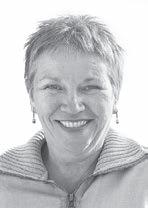
FORK IN THE ROAD
DROUGHT DAYS Between July and mid-October, Vancouver received only 16 millimetres of rain. GETTY
36 OCTOBER 20 , 2022







POOL SCHEDULE Pool hours are variable. Please see whistler.ca/recreation for daily pool hours or call 604-935-PLAY(7529) MEADOW PARK SPORTS CENTRE SWIM • SKATE • SWEAT • SQUASH OPEN DAILY: 6 a.m. to 9 p.m. ARENA SCHEDULE OCT 20 OCT 21 OCT 22OCT 23OCT 24OCT 25OCT 26 Women & Oldtimers Drop-in Hockey 8:15-9:45 a.m. Drop-In Hockey 8:15-9:45 a.m. Women & 50+ Drop-In Hockey 8:15-9:45 a.m. Drop-In Hockey 10-11:30 a.m. Family Stick & Puck 10:30-11:30 a.m. Drop-In Hockey 10-11:30 a.m. Women & Oldtimers Drop-in Hockey 10-11:30 a.m. Public Skate 12-2 p.m. Public Skate 12-3 p.m. Public Skate 12-3 p.m. Public Skate 12-2 p.m. Public Skate 12-2 p.m. Public Skate 12-2 p.m. Public Skate 12-3 p.m. Public Skate 6:30-8 p.m. Public Skate 6:30-8 p.m. Public Skate 6:30-8 p.m. whistler.ca/recreation | whistler.ca | 604-935-7529 @RMWhistler | @rmwhistler | @rmowhistler FITNESS CLASS SCHEDULE OCT 20OCT 21OCT 22OCT 23OCT 24OCT 25OCT 26 THURSDAYFRIDAYSATURDAYSUNDAYMONDAYTUESDAY WEDNESDAY I Full Body HIIT 7-8 a.m. Melanie I Strength & Stretch 7:30-8:30 a.m. Melanie I Strong Glutes & Core 7:45-8:45 a.m. Marie-Anne I Mountain Ready 7:30-8:30 a.m. Steve I Strength & Cardio 7-8 a.m. Lou I Strength & Stretch 7:30-8:30 a.m. Lou R Swim Fit 7:45-8:30 a.m. Marie-Anne R Swim Fit 7:45-8:30 a.m. Marie-Anne I Aqua Fit Shallow 8:45-9:45 a.m. Marie-Anne I Aqua Fit Deep 8:45-9:45 a.m. Marie-Anne R Walk ’n’ Workout 8:50-10 a.m. Marie-Anne I Low Impact Strength 9-10 a.m. Melanie I Full Body HIIT 9-10 a.m. Alex I Low Impact Strength 9-10 a.m. Marie-Anne I Yin & Yang Yoga 9-10 a.m. Heidi I Strength & Stretch 9-10 a.m. Lou I Strength & Cardio 9-10 a.m. Lou R Pilates 10:15-11:15 a.m. Josie I Zumba 10:30-11:30 a.m. Susie F Barre Fit 12:15-1 p.m. Marie-Anne I Zumba 12:15-1:15 p.m. Carmen F Mom & Baby 2.0 10:30-11:30 a.m. Sara I Gentle Fit 1-2 p.m. Melanie I TRX Mixer 5:15-6 p.m. Courtney I Mountain Ready 5:30–6:30 p.m. Anna I Gentle Fit 1-2 p.m. Diana F Spin 6-7 p.m. Courtney F Spin 6:15-7:15 p.m. Courtney F Spin 6-7 p.m. Courtney I HIIT Express 5:15-6 p.m. Alex F Dryland Training 6:45-7:45 p.m. Garret I Strong Glutes & Core 6:15-7:15 p.m. Carly F Dryland Training 6:45-7:45 p.m. Garret F Spin 6:15-7:15 p.m. Alex I Yin & Yang Yoga 8-9 p.m. Heather I Slow Flow Yoga 8-9 p.m. Laura I Zumba 6:30-7:30 p.m. Carmen Learn more at whistler.ca/swim | 604-935-PLAY (7529)
‘Nature will help us if we help nature’
PEMBERTON ARTIST MARTHA STURDY REPLICATES UNSETTLING ATMOSPHERE OF CHARRED FOREST IN NEW EXHIBIT, ALL FALL DOWN
BY ALYSSA NOEL
MARTHA STURDY wasn’t interested in a retrospective of her diverse and successful career as an artist.
The part-time, long-term Pemberton resident (and mother of West VancouverSea to Sky MLA Jordan Sturdy) has spent the last six decades following her innate interests, from wearable art—big, bold jewelry featured in the pages of Vogue—to furniture and large-scale sculptures crafted from wood, resin, steel, and plastic.
Over the years, it has earned her accolades ranging from the Governor General’s Golden Jubilee Medal to an Honorary Doctorate of Letters from Emily Carr University where she earned her BFA.
“I have made a rule—it was a positive and a negative—I decided that I was not going to go and look at everybody else’s work,” Sturdy says over Zoom from the West Vancouver Art Museum. “The reason is I didn’t want to be influenced. I wanted to do what I believed in and what I think.”
There’s one exception. The pieces featured in her new exhibit, Martha Sturdy: All Fall Down, which opened on
Wednesday, Oct. 19 and runs until Dec. 17 at the West Vancouver Art Museum, were directly influenced by nature—more specifically, the old growth cedar trees on her Pemberton farm.
“Somebody asked me, ‘Where did you get the idea of burning wood?’ Of course, if you look in my woods, you see where I got the idea,” she says, laughing. “I’m copying
and I pull them and twist them and burn them and take them out, and cool them off, then burn them at the other end. So it has that texture … Then what I did is I would take them out of the fire, I would hose them off and then dry them, then I would take them into my workshop and I would put a light coat of resin on them to make them permanent… Then I did a matte finish, so
but this is new for her,” says curator Hilary Letwin. “It’s not really something that she said people have seen out in public. People will have a conception of her and her work, and there are certain things that are very much in keeping with her other material work. She’s still working as a minimalist, that’s not changed—sometimes the scale has not changed—but other things are different; the material in particular. So I think it’s very exciting to have this opportunity to show this new work of Martha’s.”
While it’s an exhibit that centres on the charred remains of cedar trees, its message isn’t necessarily about climate change. Some of the trees in her backyard have burned rings inside them, dating forest fires that ripped through the area 300 or 400 years ago.
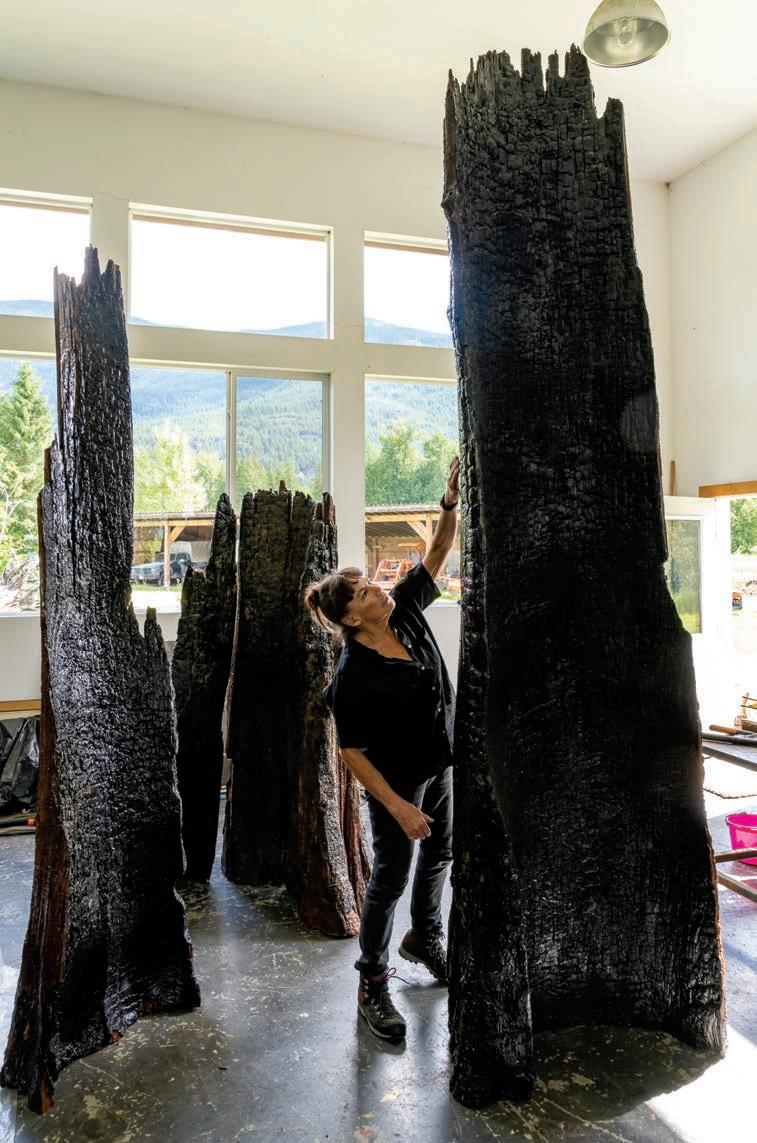
“I wanted to talk about forest fires from a different point of view than climate change,” she adds.
the forest. I’m copying nature.”
The wood sculptures that make up the exhibit are created from salvaged wood plucked from that forest. Sturdy, who is 80 years old and keeps deliberately fit, took part in moving all the pieces to the museum. They were burned over a fire to evoke the charred snags left behind after a blaze.
they’re not shiny. They really look just the way a forest fire looks. That was what I was trying to replicate.”
PHOTO BY BLAINE CAMPBELL
“At my barn I build a fire and then I take pieces of wood, sometimes up to 15-feetlong, and I pull them through the fire,” Sturdy describes. “I personally wear gloves
All Fall Down 1, for example, is made up of five of those large, burned pieces attached to slabs of steel, which is meant to evoke the cracked earth. Sturdy went to great lengths to create an atmosphere for the show: wind sounds are piped in, lights were removed to create dramatic lighting— and cast eerie shadows—and the ambient light from outside was blacked out.
“She’s been working in wood for a while,
Aesthetically, Sturdy liked the textures burned wood created, but she also wanted the show to offer a kernel of hope. She primarily tried to achieve that with the sculpture sitting outside the museum, called All Fall Down 4
“This show is so aggressively negative,” she says. “You walk in here and it’s just like being in a burned forest, and it is pretty serious … But then you go outside and there’s this little tree under this pile of wood. Nature will help us if we help nature. I’m just a reminder of that.” n
PLAYING WITH FIRE Martha Sturdy works on the pieces for her new exhibit, All Fall Down, in her Pemberton studio.
“[I]f you look in my woods, you see where I got the idea,” she says, laughing. “I’m copying the forest. I’m copying nature.”
- MARTHA STURDY
ARTS SCENE 38 OCTOBER 20 , 2022
iF3 film fest brings winter stoke— and industry awards—to Whistler
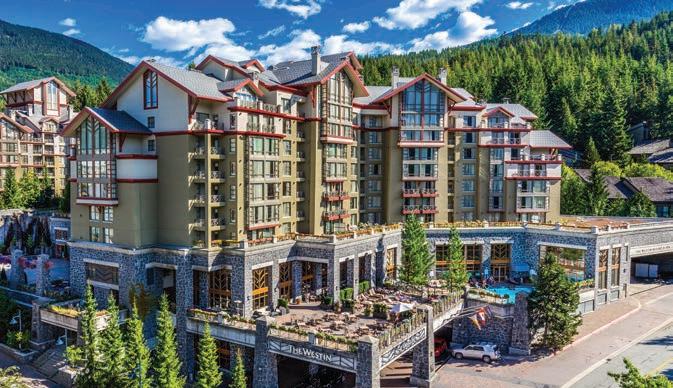
THE SKI AND SNOWBOARD FILM FESTIVAL RETURNS FROM WEDNESDAY, OCT. 19 TO SATURDAY, OCT. 22
BY ALYSSA NOEL
AT LEAST one good thing came out of the pandemic—if you’re a Whistler-based fan of ski and snowboard films, that is.
While the iF3 festival has been bringing its selection of movies to the resort for many years, last year, its awards ceremony moved from Montreal, too.
“There are a lot more people in the ski industry in Whistler than Montreal,” says Mark Warner, who has hosted the awards for the last several years. “[Last year] I said, ‘We want to make sure iF3 doesn’t fade away because of COVID.’ I took it upon myself to make it happen here. I could see we could make it work.”
It worked so well, the awards will be part of the four-day festival—running from Wednesday, Oct. 19 to Saturday, Oct. 22— again this year.
“We were so happy with how it worked out, we decided to repeat this year and go full-steam ahead with the full festival,” Warner says. “The iF3 awards are the premiere awards in the industry. We’re basically it. If you have a movie and you want it recognized in the industry, it’s iF3.”
While there will be a red carpet and “every person who’s made a film or is in a film who can get here will be here,” the ceremony is just one small part of the festival.
The festivities kicked off on Wednesday with a launch party at the Whistler Racket Club, called Pow Town Revival: A Showcase of Short Films for Snow People.

Following that, Thursday night will feature two screenings of the All Girls series, with films highlighting women-driven ski and snowboard films, at the Maury Young Arts Centre.
The all-ages screening at 5 p.m. will include live interviews with producers and athletes from the films. Those interviews will also be livestreamed.
“We’re keeping in line with those
virtual events we did,” Warner says. “We’re going to be filming onstage and streaming a live, one-hour panel interview with athletes and filmmakers.”
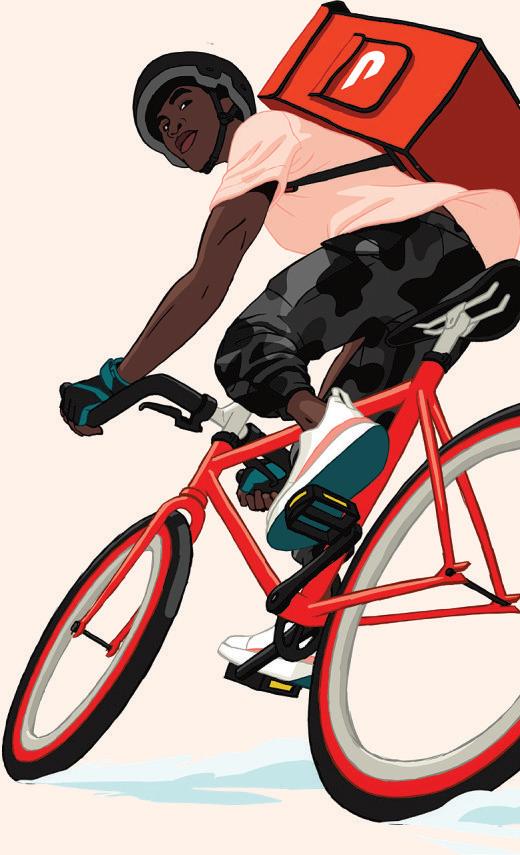
A second adults-only screening is set for 7:15 p.m.
Friday, meanwhile, will focus on snowboarding. Taking place at the Fairmont Chateau Whistler’s Macdonald Ballroom, the all-ages event will screen eight films starting at 7:30 p.m.
Finally, Saturday will bring all-day activities, starting with two matinees: one at 11 a.m. with iF3’s official selections of ski and snowboard films and another at 1:30 p.m. with completely different films.
Pricing is $10 for adults and $5 for kids.
“We want to get families and kids out to these events,” Warner says.
The big awards gala will follow at 4:15 p.m. with a red carpet and ceremony.
Capping off the one-hour ceremony will be Salomon Night with the Canadian premiere of Feel Real from Blank Collective.
(The Fifty Project’s Sphinx and Switchback Entertainment’s Tracing Influence will also screen.)

“It’s the hometown premiere of one of the biggest films of the year,” Warner says of the headlining film.
The whole festival will wrap up with an After Party at the Fairmont featuring DJ duo SkiiTour.
“This year will be fun, big, and exciting,” Warner says. “Last year, we had a lot of people from the Sea to Sky corridor come out to the festival—a lot of my friends within the ski industry. What I’m looking forward to this year is people coming from far away—people are coming from Europe, all over the states—and having the extended ski and snowboard community here.”
Passes and tickets for each day and event are on sale now. Passes and tickets for each day and event are on sale now at festivalif3.com/en/venues-and-events/ whistler_canada_2022/screenings. n
BLANK CHEQUE Blank Collective accept an award for film of the year at the 2021 iF3. The group is back this year to screen its film Feel Real
PHOTO SUBMITTED
ARTS SCENE OCTOBER 20 , 2022 39 TheWestinResort&Spa,Whistler islookingforhousingfor ourStaffAssociates Wetakeprideinthehomesweleaseand youcanresteasyknowingyourhomeislookedafter withTheWestin. Wehave: •Adesignatedcontactperson •Monthlyrentpaidbythehoteldirectly •MaintenanceissuesoverseenbyourEngineeringteam •ScheduledMonthlyInspections •NoVisitors,smokingorpetsallowedatanytime PLEASECONTACT KarenBauckham on 604.935.4354 or people@westinwhistler.com
AtTapley’sFarm
5:30-8pm
Pleaseberespectfuloftheneighbourhoodandtakeoutwhatyoubringin. Tapleysneighbourhoodwillbeclosedtotrafficfrom4pmwithtrick-or-treatingstartingafter 5:30pm.Parkingislimitedsopleasetakethefree‘ParkandSpook’shuttle,organizedby FastparkandprovidedbyBCTransitandRMOW,whichwillrunbetweenthe MarketplaceparkinglottoTapleysfrom5:15pmto8:25pm.Parkinginthe Marketplaceparkinglotwillbefreefrom5pm–9pmcomplimentofMarketplacemerchants. FireworksgenerouslysponsoredbyNestersMarketandpresentedbytheWhistler FireDepartmentwillbesetoffat7:30pmatMyrtlePhilipLowerPlayingField.



PLEASESUPPORTTHISEVENT!

Collectionboxesforcandydonationsaresetupatschools,daycares,


Before the Fitzsimmons Express
BY JILLIAN ROBERTS
WITH A new eight-person chair announced to replace the four-person Fitzsimmons (Fitz) Express chairlift (pending approvals), we take a look back at how mountain access from Whistler Village has changed over the years.

The first lift from Whistler Village opened for the 1980-81 season, around the same time the Town Centre opened and lifts on Blackcomb started turning. Prior to this, everyone accessed Whistler Mountain from the area known today as Creekside. When Garibaldi’s Whistler Mountain officially opened in January 1966, it had a four-person gondola, the original double Red Chair and two T-bars.
Trees were eventually cleared on Whistler Mountain for the aspirationallynamed Olympic Run, however, skiers who skied down the north side of Whistler Mountain were only met with a garbage dump where the Village now sits, and had to catch the bus back to Creekside. Olympic Run generally only opened on weekends when the bus was running, otherwise skiers had to hitchhike back to Creekside.
Janet Love Morrison described being a rebel and skiing the closed run on a school trip. “I remember we went under the rope to ski the Little Olympic Run and we were really cool until we got to the bottom and had absolutely no way to get back to Creekside. Suddenly we were super scared because we knew we had to get back to get to the bus, because we went to school in Port Coquitlam.” Finding no cars or people at the base of the mountain, the grade eight students followed a gravel road to Highway 99 where they were picked up by a tow truck driver. They proceeded to get a dressing down by the driver and then their teachers, a first-hand experience that helped when Janet was writing Radar the Rescue Dog.
When the lifts from Whistler Village
finally went in for the 1980-81 season, multiple chairlifts were required to make it to the top. To get to the Roundhouse from Skiers Plaza, skiers first took the Village Chair, which finished slightly higher in elevation than today’s Fitz, and then skied down to Olympic Chair. Olympic Chair is still the original chair from 1980, however, it was shortened in 1989 to service strictly the beginner terrain. Originally, Olympic Chair met Black Chair at the bottom of Ptarmigan. If you wanted to continue on to the Roundhouse or Peak, Black Chair dropped skiers where the top of Garbanzo is today, then skiers would ski down and take Red or Green Chairs to the top. Four lifts to get to the Roundhouse, and they were all slow, fixed-grip lifts, not the highspeed lifts that service the mountains today. (Olympic Chair, Magic Chair and Franz’s Chair are the only remaining fixedgrip chairs in Whistler.)
Uploading from Whistler Village was simplified in 1988 when the Whistler Express Gondola replaced the four chairlifts, taking skiers and sightseers straight from the Village to the Roundhouse, in a gondola (apparently) designed to hold 10 people.
The four-person Fitz that we know and love was built in 1999 and, together with Garbanzo, eliminated the need for the Black Chair. Prior to 1999, the biking on Whistler Mountain was predominantly run by private enterprise, notably Eric Wight of Backroads Whistler, who mostly used the Whistler Express Gondola to access terrain. When the Bike Park was taken over by Whistler Blackcomb in 1999 and further developed, Fitz began to be used to access the Bike Park throughout summer, as the sport rapidly grew. These days, the Bike Park sees way more than 100,000 riders a year, most of whom access the terrain from Fitz Express.
If Fitz is upgraded next summer, it will be the start of a new era, greatly increasing the number of riders and skiers arriving at midstation.
MUSEUM MUSINGS
n
HISTORICAL HEIGHTS Before Fitzsimmons Express and the Whistler Express Gondola, skiers could upload on the Village Chair. WHISTLER MOUNTAIN COLLECTION.
40 OCTOBER 20 , 2022 Afreefamilyfriendlytraditionsince1983 October31
Trick-or-treatersgetreadyforahowlinggoodtimeattheannual HalloweencelebrationinTapley’sFarmneighbourhood. IMPORTANTINFO:
NestersMarket,FreshStMarket,TheIndependentand CreeksideMarkettohelpresidentsmeetthedemand.
39th Annual SupporttheFoodBankDrive. Donationsrequestedatentrance. (non-perishablefoodorcash) Thankyoutoour supportersforhelping ustokeepthe traditiongoing! EVENTSUPPORTERS: FIREWORKS SPONSOR: ENTRANCE SUPPORTEDBY:

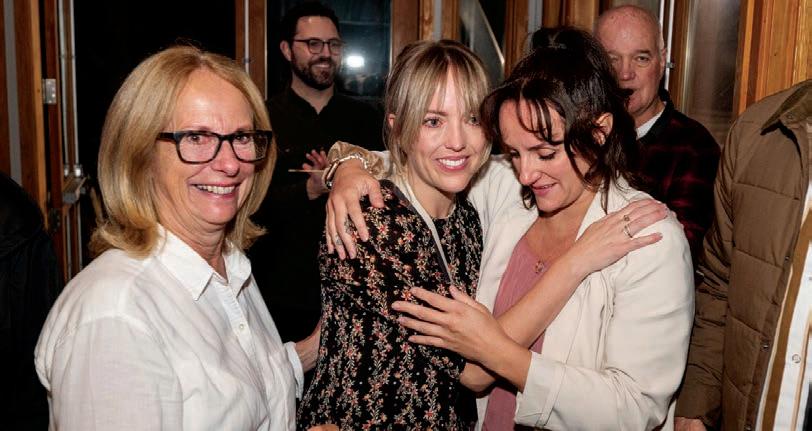
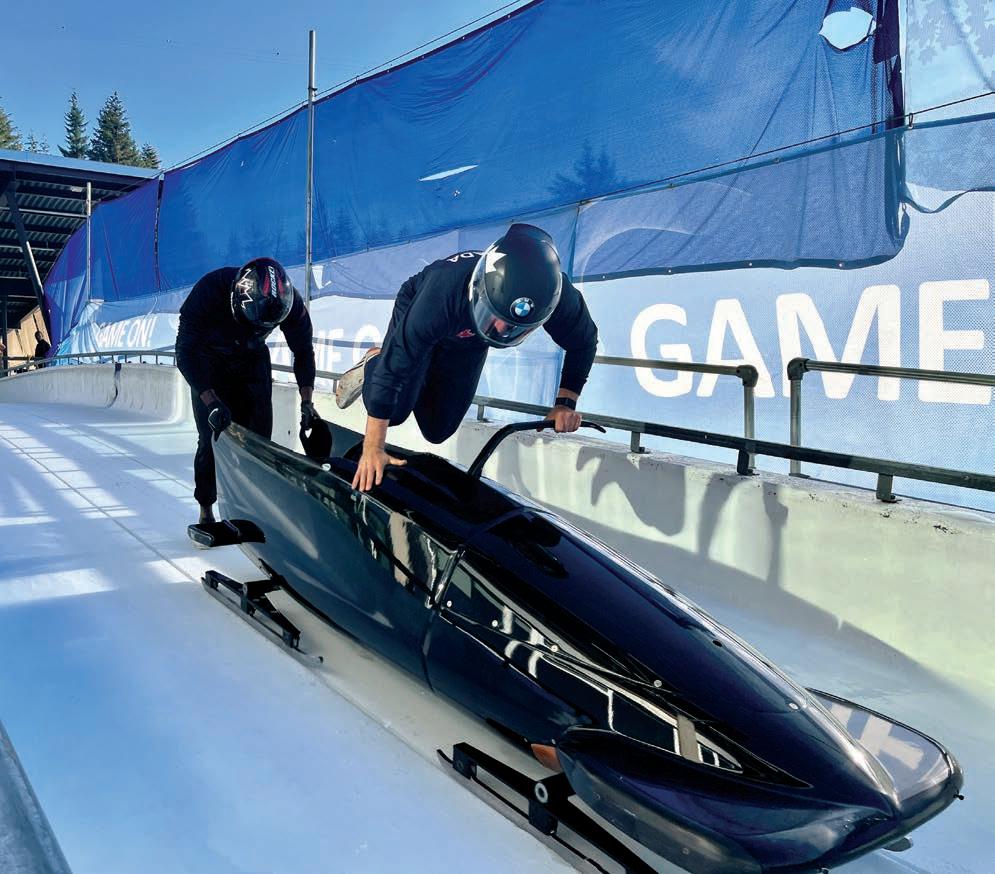
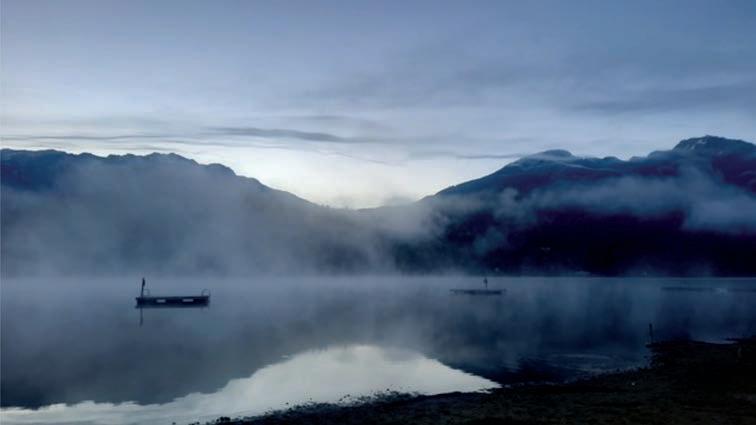
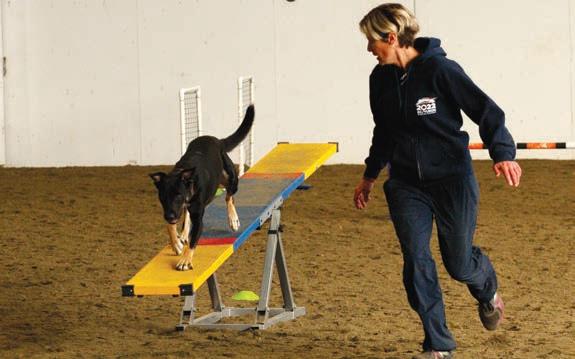






PARTIAL RECALL 1 FIRST DOWN Bobsleigh pilot Taylor Austin and brakemen Cyrus Grey had the honour of taking the first two-man bobsled of the season down the Whistler Sliding Centre’s track last week. PHOTO
BY
SILKE
JELTSCH,
COURTESY OF
WHISTLER SLIDING CENTRE.
2 SUNNY DAYS Annie Papillon with her dog, Sunny, take to the course at the Pemberton Dog Agility Club’s Fun Competition on Saturday, Oct. 15. PHOTO BY MIKE MILLS / COAST MOUNTAIN PHOTOGRAPHY. 3 QUARTER CENTURY CLUB Over 200 supporters packed the Fairmont Chateau Whistler’s Woodlands rooftop patio on Friday, Oct. 14 to celebrate Zero Ceiling’s 25th Birthday, including representative’s from Zero Ceiling community partners evo and Arc’teryx, pictured here. PHOTO BY OISIN MCHUGH PHOTOGRAPHY. 4 SMOKE ON THE WATER Fall finally arrived on Alta Lake, pictured looked foggy from Rainbow Park on Tuesday morning, Oct. 11. PHOTO BY KEVIN HALLS. 5 FAMILY AFFAIR Former Whistler mayor Nancy WilhelmMorden poses with her daughters Sarah, centre, and Jessie, right, after Jessie was elected to Whistler council for the first time on Saturday night, Oct. 15. PHOTO BY DAVID BUZZARD / DAVIDBUZZARD.COM. SEND US YOUR PHOTOS! Send your recent snaps to arts@piquenewsmagazine.com 1 2 54 3 OCTOBER 20 , 2022 41 OFTHEWEEK LOUNGER S StayStinky! 21-4314MainStreet GoSports! Recycle?Yesorno? GettheBCRECYCLEPEDIA App RECYCLINGCOUNCILOFB.C MEMBER www.rcbc.ca
NOTICEOFPUBLICHEARING (ELECTRONIC)
SLRDELECTORALAREAC
Thursday,October27,2022at7PM
VIAZOOMVIDEOCONFERENCING
PublicNoticeisherebygiveninaccordancewithSection466ofthe LocalGovernmentAct thataPublic Hearingwillbeheldelectronicallyregardingthefollowingbylaws:
1. “Squamish-LillooetRegionalDistrictElectoralAreaCZoningBylawNo.765,2002,Amendment BylawNo.1721-2022”(BylawNo.1721-2022)
2. “Squamish-LillooetRegionalDistrictElectoralAreaCOfficialCommunityPlanBylawNo.689, 1999AmendmentBylawNo.1722-2022”(BylawNo.1722-2022)
TheareacoveredbyBylaws1721-2022and1722-2022includesallofthelanddescribedas“ParcelA DistrictLot4901,LillooetLandDistrictPlan11938andDL4901LillooetLandDistrictexceptplans11938 andEPP10321”andshownonthefollowingmap:
Free Will Astrology
WEEK OF OCT 20 BY ROB BREZSNY
ARIES (March 21-April 19): “We must be willing to let go of the life we planned so as to have the life that is waiting for us.” Aries mythologist Joseph Campbell said that, and now I’m passing it on to you just in time for the Sacred Surrender Phase of your astrological cycle. Make sage use of Campbell’s wisdom, Aries! You will generate good fortune for yourself as you work to release expectations that may be interfering with the arrival of new stories and adventures. Be brave, my dear, as you relinquish outdated attachments and shed defunct hopes.
TAURUS (April 20-May 20): Plastic bags are used for an average of 12 minutes before being discarded. Then they languish in our soil or oceans, degrading slowly as they cause mayhem for animals and ecosystems. In alignment with current cosmic rhythms, I’m encouraging you to be extra discerning in your relationship with plastic bags—as well as with all other unproductive, impractical, wasteful things and people. In the coming weeks, you will thrive by focusing on what will serve you with high integrity for a long time.
the great poems of Earth. I’d love to invite all Libras, including non-writers, to apply that perspective in their own sphere. Just forget about heaven and hell for now. Turn your attention away from perfection and fantasylands and lofty heights. Disregard pathologies and muck and misery. Instead, explore and celebrate the precious mysteries of the world as it is. Be a connoisseur of the beauty and small miracles embedded in life’s little details. Find glory in the routine.
SCORPIO (Oct. 23-Nov. 21): Here are two top Scorpio pastimes: 1. exploring and deploying your intense, fertile creativity; 2. spiraling gleefully down into deep dark voids in pursuit of deep dark riches. Sometimes those two hobbies dovetail quite well; you can satisfy both pursuits simultaneously. One of my favorite variations on this scenario is when the deep dark void you leap into turns out to actually be a lush wonderland that stimulates your intense, fertile creativity. According to my analysis of the astrological omens, that’s likely to happen soon.
PURPOSEOFBYLAWNo.1721-2022
Thepurposeofthezoningamendmentbylawistoaddresstheprovincialrequirementsforlandusecontract terminationandthenon-conformingsituationofthecurrentunderlyingRR1zoning.ThecurrentRural1zone isproposedtobereplacedwithazonethatreflectsthedevelopmentinthetwocommunities.Forclarity,only minorchangestowhatiscurrentlyprovidedforunderLandUseContractAuthorizationBylawNo.88,1976 willbecontemplatedunderthisstaff-initiatedzoning amendment.Usessuchaslodge,andthebroadrangeof commercialandindustrialuseshavebeenremovedasthesearenotdeemedappropriategiventhecurrently knowngeohazardrisk.A100m2 retailusewillbeallowedaSite73only.
Theproposedzoningwillapplytothe152sitesthatcompriseLillooetLakeEstatesandthe18sitesthat compriseHeatherJeanProperties.
RRLLHJ–LillooetLake–HeatherJeanZone–SummaryofNewZoning
• Permittedusesprovideforonesinglefamilydwellingpersite,trailers(ifspecifiedrequirementsare met),anaccessorybuilding.
• TotalFloorAreaofallbuildingsonasitemustnotexceed500m2
• Nobuildingshallexceed10metresinheight.
• Minimumparcelareafornewsubdivisionsshallbe1200squaremetres.
• Provisionsarealsoincludedfor CommonAreas and WorksAreas
PURPOSEOFBYLAWNo.1722-2022
BylawNo.1722-2022isproposedtoestablishanewLillooetLake–HeatherJeanDebrisFlowHazard DevelopmentPermitArea.
Thefollowingaretheproposedguidelinesrespectinghowtheabovespecialconditionswillbeaddressedand applytoalllandsinLillooetLakeEstatesandHeatherJeanEstates:
a.Wherepossible,developmentshouldbesitedtoavoidhazards.Whereimpossibleor impracticaltoavoidhazards,mitigationmeasuresmayberequired.
b.Conditionsrelatingtothepermitteduses,densityorscaleofbuildingsshouldbeimposed asnecessarytoreducepotentialhazardtoacceptablelevels.
c.Applicationsforlandalteration/disturbance,subdivision,orbuildingpermitsshallincludeasitespecificreportfromaqualifiedProfessionalEngineerorProfessionalGeoscientist(withexpertise increekhazards)thatidentifiespotentialriskfromdebrisflowhazardsandproposedriskreduction measuresifrequiredforsafeuse.
d.Thereportshallincludeprofessionalcertificationthattheland/buildingmaybesafelyusedforthe purposeintended.
e.DevelopmentPermitsshallbeinaccordancewiththerecommendationsoftheapplicable geohazardreportorreports,includingrequiredmitigativemeasures.
f.WheredevelopmentalsofallswithinotherDPareas,geohazardreportshallbecoordinatedwith otherrequiredreportstocreateacomprehensivedevelopmentpermitapplication.
INFORMATION
AcopyoftheproposedbylawsandrelevantbackgrounddocumentsmaybeinspectedattheRegional Districtoffice,1350AsterStreet,Pemberton,BC,duringofficehours8:00amto4:30pmfromOctober 10,2022 toOctober27,2022notincludingweekendsandstatutoryholidaysorontheSLRDwebsiteat www.slrd.bc.ca/LillooetLakeEstates_HeatherJeanProperties_OCP.Thepublichearingistobechairedby ElectoralAreaCDirectorRussellMackasadelegateoftheSLRDRegionalBoard.
PUBLICPARTICIPATION
Allpersonswhobelievethattheirinterestinthepropertyisaffectedbytheproposedbylawshallbeafforded areasonableopportunitytobeheardortopresentwrittensubmissionsrespectingmatterscontainedin the bylawatthepublichearing.Allpersonscan1)submitwrittencomments;and/ormakeoralrepresentations
LIVEviaonlinevideoorphoneconferencing(yourimagewillnotbebroadcasttotheBoardorthepublic).
1.SubmitWrittenCommentstotheBoard:
Writtensubmissionsmustbeaddressedto“SLRDBoardofDirectors,”andincludeyournameandmailing address.Until4:00pmonOctober26,2022,writtensubmissionswillbereceivedatthefollowing:
Email: planning@slrd.bc.ca
HardCopy: Squamish-LillooetRegionalDistrict PlanningDepartment POBox219,Pemberton,BCV0N2L0


WrittensubmissionswillalsobeacceptedonOctober27,2022between8:00amandthetimewhenthe motiontoclosethePublicHearingismade.Duringthistimeframe,writtencommentsmustbesubmittedby emailto:kneedham@slrd.bc.ca
2.ParticipateviaVideoandPhoneConferencing
TheelectronicPublicHearingwilltakeplaceOctober27,2022at7PM.viaonlinevideoandphone conferencing.ThePublicHearingwillbeconductedusingZoomvideoconferencing.Noregistrationis required.Log-indetailswillbepostedtothenoticepage:www.slrd.bc.ca/inside-slrd/notices threedays prior tothePublicHearing.YoumayalsocallthePlanningDepartment threedays priortothePublicHearingat 604.894.6371togetthelog-ininformation.
GEMINI (May 21-June 20): Achilleas Frangakis is a professor of electron microscopy. He studies the biochemistry of cells. In one of his research projects, he investigated how cells interact with the outside world. He didn’t learn much about that question, but as he experimented, he inadvertently uncovered fascinating new information about another subject: how cells interact with each other when they heal a wound. His “successful failure” was an example of what scientists sometimes do: They miss what they looked for, but find unexpected data and make serendipitous discoveries. I suspect you will experience comparable luck sometime soon, Gemini. Be alert for goodies you weren’t in quest of.
CANCER (June 21-July 22): Renowned Brazilian novelist Osman Lins was born under the sign of Cancer the Crab. He wrote, “I will now live my life with the inventiveness of an engineer who drives his locomotive off the tracks. No more beaten paths: improvisation is the rule.” In the coming weeks, I am all in favour of you, my fellow Cancerian, being an inventive adventurer who improvises liberally and departs from well-worn routes. However, I don’t recommend you do the equivalent of running your train off the tracks. Let’s instead imagine you as piloting a four-wheel-drive, all-terrain vehicle. Go off-road to explore. Improvise enthusiastically as you reconnoiter the unknown. But do so with scrupulous attention to what’s healthy and inspiring.
LEO (July 23-Aug. 22): In recent years, art historians have recovered numerous masterpieces that had been missing for years. They include a sculpture by Bernini, a sketch by Picasso, a drawing by Albrecht Dürer, and a painting by Titian. I’m a big fan of efforts like these: searching for and finding lost treasures. And I think you should make that a fun project in the coming weeks. Are there any beautiful creations that have been lost or forgotten? Useful resources that have been neglected? Wild truths that have been buried or underestimated? In accordance with astrological potentials, I hope you will explore such possibilities.
VIRGO (Aug. 23-Sept. 22): The most important experience for you to seek in the coming months is to be seen and respected for who you really are. Who are the allies best able to give you that blessing? Make vigorous efforts to keep them close and treat them well. To inspire your mission, I offer you three quotes. 1. Franz Kafka said, “All the love in the world is useless if there is a total lack of understanding.” 2. Anais Nin wrote, “I don’t want worship. I want understanding.” 3. George Orwell: “Perhaps one did not want to be loved so much as to be understood.”
LIBRA (Sept. 23-Oct. 22): Libra poet Wallace Stevens said that the great poems of heaven and hell have already been written, and now it is time to generate
SAGITTARIUS (Nov. 22-Dec. 21): “I don’t want to be made pacified or made comfortable. I like stuff that gets your adrenaline going.” Sagittarian filmmaker Kathryn Bigelow said that. With the help of this attitude, she became the first woman ever to win an Academy Award for Best Director. Her film was The Hurt Locker, about American soldiers in Iraq who dispose of unexploded bombs while being harassed by enemies. Anyway, Bigelow’s approach is usually too hard-ass for me. I’m a sensitive Cancer the Crab, not a bold Sagittarius the Centaur like Bigelow and you. But I don’t want to assume you’re in the mood for her approach. If you are, though, the coming weeks will be a favourable time to deploy it. Some marvellous epiphanies and healing changes will be available if you forswear stuff that makes you pacified or comfortable.
CAPRICORN (Dec. 22-Jan. 19): Author Jan Richardson tells us we can’t return home by taking the same route we used when we departed. This will be wise advice for you to keep in mind during the next nine months. I expect you will be attempting at least two kinds of homecomings. For best results, plan to travel by different routes than those that might seem natural and obvious. The most direct path—the successful passage—may be circuitous.
AQUARIUS (Jan. 20-Feb. 18): In the coming days, maintain strict boundaries between yourself and anyone or anything that’s not healthy for you. Be ultra-discerning as you decide which influences you will allow to affect you and which you won’t. And rather than getting sour and tense as you do this, I recommend you proceed with wicked humour and sly irony. Here are three saucy self-protective statements you can use to ward off threats and remain inviolable. 1. “The current ambiance does not align sweetly with my vital soul energy; I must go track down some more harmonious karma.” 2. “This atmosphere is out of sync with my deep precious selfness; I am compelled to take my deep precious selfness elsewhere.” 3. “The undertones here are agitating my undercurrents; it behooves me to track down groovier overtones.”
PISCES (Feb. 19-March 20): While asleep, have you ever dreamt of discovering new rooms in a house or other building you know well? I bet you will have at least one such dream soon. What does it mean? It suggests you want and need to get in touch with parts of yourself that have been dormant or unavailable. You may uncover evocative secrets about your past and present that had been unknown to you. You will learn about new resources you can access and provocative possibilities you had never imagined.
Homework: What do you do pretty well that you could ultimately learn to do with brilliance and mastery?
Newsletter.FreeWillAstrology.com
In addition to this column, Rob Brezsny creates
EXPANDED AUDIO HOROSCOPES
In-depth weekly forecasts designed to inspire and uplift you. To buy access, phone 1-888-499-4425. Once you’ve chosen the Block of Time you like, call 1-888-682-8777 to hear Rob’s forecasts. www.freewillastrology.com
ASTROLOGY 42 OCTOBER 20 , 2022
COMMUNITY

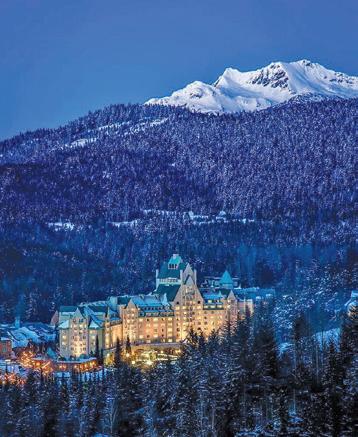

RE-USE-IT CENTRE Donations daily 10 am to 4 pm
Accepting pre-loved clothing, gear and household items. Shopping daily 10 am to 6 pm




Nesters Road
RE-BUILD-IT CENTRE Donations daily 10 am to 5 pm
pre-loved furniture, tools and building supplies Shopping daily 10 am to 5 pm 1003 Lynham Road 604-932-1125 Visit mywcss.org and our social channels for updates.


OCTOBER 20, 2022 43 classifieds. piquenewsmagazine.comBook your classified ad online by 4pm Tuesday Make your dream come true ! BLISSFUL RELAXATION MASSAGE & MORE by beautiful May Outcalls Only 24/7, Residence/Hotel BY APPOINTMENT ONLY 778-968-4947 ALWAYS HIRING STAGS! STAGS! STAGS! ESCORTS STRIPPERS TOPLESS BLACKJACK DEALERS BIKINI CLAD CADDIES MAKE ANY PARTY AMAZING! 604-992-4746 For the Time of Your Life! Reservations Highly Recommended roxysinwhistler.com Lot For Sale: Ivey Lake Subdivision 5.44 ACRE • $650,000 5.44 ACRE Lot 51, Ivey Lake Subdivision, $650,000, 2-minute walk to Lake. 2.3 Km northeast of Pemberton, a 30-minute drive to Whistler. Fantastic view of Mt Currie. 604-744-8816 owen.hairsine@gmail.com PRE-LOVED RE-LOVED =
LOVE
8000
604-932-1121
Accepting
ADULT SERVICES ADULTS ONLY Accommodation LONG-TERM RENTALS MULTIPLE LOCATIONS REAL ESTATE PEMBERTON MARKETPLACE FOR SALE - MISC Thank you to all our volunteers and foster homes, we love you! piquenewsmagazine.com/ local-events/ PRINT & ONLINE SELF-SERVE DISPLAY ADS DEADLINE FOR PRINT ADS Tuesday 4pm RENT SELL HIRE Classifi eds Where locals look è Secure & scamless è Fully searchable è Targeted online community è Categorised listings è No reposting è Trusted by locals è Make your listing stand out with featured locations CLASSIFIEDS.PIQUENEWSMAGAZINE.COM CALL OR PLACE YOUR CLASSIFIED WITH OUR ONLINE SERVICE FOR EITHER PRINT OR ONLINE...OR BOTH! Get the added punch to make your business ad standout with a classified display ad. Free ad design, colour options, incentives for ad frequency. Contact a sales rep today. List your accommodation rental in print & online from only $5* a week Sell your stuff Advertising Options è Packages start with 4 lines of text. Additional text $1/line è Add one image in print and up to three online as per package level. è Bolding .50¢/word è Border $2 * Rates are based on using Pique’s selfserve online application at classifieds. piquenewsmagazine.com piquenewsmagazine.com 604-938-0202 online only Free* for 30 days print & online $11* per week
Free Housing
Join
team
We are a well-established local plumbing and heating company operating in the Sea to Sky corridor. We have staff housing for those who need it.
Hiring 3rd and 4th year apprentice or journeyman



with experience in service/repair work.

•
fully
•
•
plan
can hire skilled foreign workers and support permanent residency applications.
• Short-term accommodation available - free of charge. Long term housing options available as well.
• Looking for friendly, outgoing, self-motivated, organized, reliable, articulate with great communication skills and has attention to detail with a desire to perform high quality work.
• Do you have great attention to detail with a desire to perform high quality workmanship. Ability to problem solve and diagnose issues quickly and accurately. If this sound like you, lets chat.
Send your resume to: Dough@spearheadsph.com
RUMMAGE
Saturday, Nov 5th 10am - 3pm
refugee family from Eritrea has arrived! We are continuing to raise funds for their first-year introduction to a new community and new country.
Guest
of gently used goods may be dropped off at the church on Friday, Nov 4th between noon and 6pm.


Fitzsimmons Road
Monday through Friday 8:30 - 4:30 Saturday 10:00 -4:00
Alpha Lake Road
B.C, V0N1B1
604-938-1126
Fitness Classes
EMPLOYMENT OPPORTUNITIES
AND RENOVATIONS
for hard-working, self-
and
a
Working on a range of projects keeping everyday fresh.
to be a part of a fun and
and are excited
Dont forget to scoop the poop!
It’s not fun to step in, or to see around town. Help keep Whistler clean and pick up after your dog.
www.whistlerwag.com

steve@localautomotive.com

44 OCTOBER 20, 2022 classifieds. piquenewsmagazine.com Book your classified ad online by 3pm Tuesday
Our
Donations
7226
NO BOOKS PLEASE
SALE FUNDRAISER • Kitchen and Bath • Renovations & Repairs • Drywall • Painting • Finishing • Minor Electrical & Plumbing Serving Whistler for over 25 years Wiebe Construction Services Ray Wiebe 604.935.2432 Pat Wiebe 604.902.9300 raymondo99.69@gmail.com Open
Sundays and Evenings by appointment only. 3-1365
Whistler,
Phone
email shawcarpet@shaw.ca Family owned & operated SHAW CARPET & FLOOR CENTRE Call 604-902-MOVE www.alltimemoving.ca big or small we do it all! NORTHLANDS STORAGE STORAGE SPACE AVAILABLE BEST PRICES IN WHISTLER FURNITURE, CARS, BOATS & MOTORCYCLES ETC STORAGE AVAILABLE 604.932.1968 ofce@northlandstorage.ca See our full page schedule ad in this issue of Pique for details Group
Thursdays – Yin and Yang Yoga 8-9 pm w Heather Fridays – Gentle Fit 1-2 pm w Melanie Saturdays – Zumba 10:30-11:30 am w Susie Mondays – TRX Mixer 5:15-6 pm w Courtney Tuesdays – Zumba 12:15-1:15 pm w Carmen Wednesdays – Spin 6:15-7:15 pm w Alex Carpenter & Skilled Labourer Looking
motivated,
positive people who want to make
big impact in the community.
Looking
expanding team
to see it grow! Email: admin@ tiedemancustomconstruction. com or give us a call on 604-962-0597 ***Local Automotive*** Automotive technician for year round position in Whistler. 604-905-9109
GARAGE SALES GARAGE SALES HOME SERVICES BUILDING
HOME SERVICES FLOORING MOVING AND STORAGE HOME SERVICES MOVING AND STORAGE Services HEALTH & WELLBEING SPORTS & ACTIVITIES EMPLOYMENT
our
of Plumbers and Gas Fitters
candidates
Offering competitive wages • Providing
stocked truck, tools, and phone
Extended health
available.
We
Thank you for your interest. Only those applicants being considered for an interview will be contacted. Please reply with a cover letter and resume to hr@listelhotel.com is now hiring for
Service Agent This dynamic role include the following Perks and Benefits: • Competitive Wages and Extended Benefits • Wages starting from $20 per hour, plus Commissions • Signing Bonus and Seasonal Bonuses • Discounted F&B and Hotel Stays STAFF HOUSING AVAILABLE We are looking to hire another member to our team at Straightline. Experience in Plumbing is required. Gas Fitting and HVAC would be preferred but not essential. Wages are based on experience, Starting between $38-$50/hr. Part-time or Full-time positions available. Please call 604-935-8771 or email straightlineplumbingandheating@gmail.com for more information. EMPLOYMENT OPPORTUNITIES PIQUENEWSMAGAZINE.COM/JOBS FOR LOCAL JOB OPENINGS



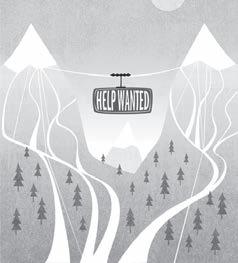







































OCTOBER 20, 2022 45 classifieds.piquenewsmagazine.com BUY RENT WORK FIX DRIVE SELL NOW HIRING APPLY • GUEST SERVICE AGENT (FT/PT) • OVERNIGHT NIGHT AUDITOR (PT) Please drop off your resume at the hotel or email : athalakada@pinnaclehotels.ca The Pinnacle Hotel Whistler is currently hiring • ROOM ATTENDANTS • HOUSEMAN Please reply by email: parmstrong@pinnaclehotels.ca The Pinnacle Hotel Whistler has the following positions available: EMPLOYMENT OPPORTUNITIES PIQUENEWSMAGAZINE.COM/JOBS THE FIRST PLACE TO LOOK FOR LOCAL JOB OPENINGS Pique’s LABOUR LOOK-IN THE MANY WHISTLER’S—AND B.C.’S— FREE AT The Insider sGuide to Crankworx Whistler the theworld mountainfestival AUGUST 4, 2022 ISSUE 29.31 WWW.PIQUENEWSMAGAZINE.COM FREE RED MITTENS AUGUST 11, 2022 ISSUE 29.32 WWW.PIQUENEWSMAGAZINE.COM FREE HANDS AUGUST 18, 2022 ISSUE 29.33 WWW.PIQUENEWSMAGAZINE.COM ‘There is life f above the thighs’ Arts Wh er mar 0 ar of n n h art n an n por town FREE BOON OR BARRIER? cannabis retail policy offers risk and14 HARD Two more Sea to Sky killed due to16 CLASSIC Vancouver pianist perform benefit48 AUGUST 25, 2022 29.34 WWW.PIQUENEWSMAGAZINE.COM FREE FLOWING ISSUE 29.37 WWW.PIQUENEWSMAGAZINE.COM FREE LIFESAVERS CHEAK? What’s Cheakamus Crossing14 WELCOME, DELEGATES UBCM Whistler, with focus health-care15 SING Chorus uniquely Whistler show40 A moral obligation ambulance continues face severe challenge SEPTEMBER 8, 2022 29.36 WWW.PIQUENEWSMAGAZINE.COM
Center
Projects Manager
Finance Manager
• On-Reserve Lands Manager

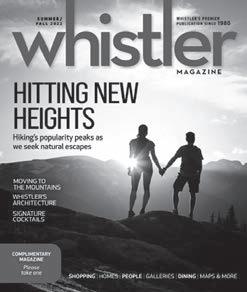




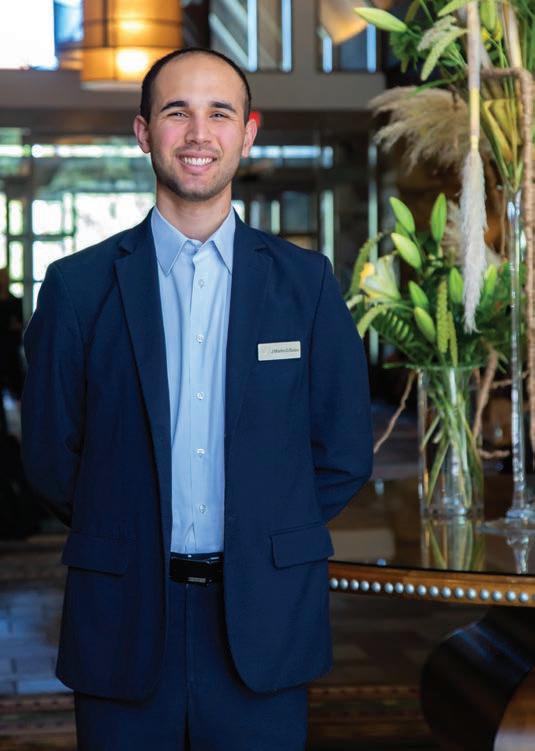
Receptionist (on-call)
&


• Early Childhood Educator/Assistant

Infant
Program Coordinator



Business Group
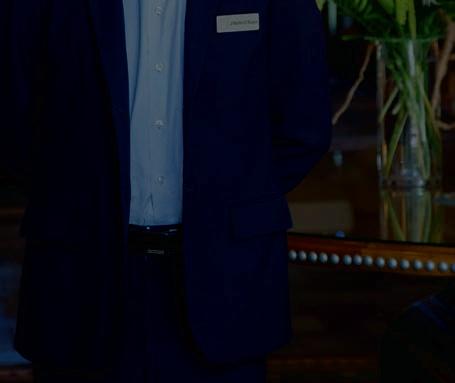
• Mines & Services Manager
• Transfer Station Superintendent
• Transfer Station Operator

Xet’olacw Community School
• Grade 2 Teacher
• High School Teacher (on-call)
• IT Assistant
• Grade 5 Teacher (Maternity Leave)
• High School Math Teacher
• Kitchen Support (on-call)
• Elementary Teacher (on-call)
• One-One Educational Assistant
• Custodian (on-call)
OPPORTUNITIES
46 OCTOBER 20, 2022 classifieds. piquenewsmagazine.com Book your classified ad online by 3pm Tuesday Ullus Community
• Capital
•
•
Health
Healing
•
Development
Lil’wat
Lil’wat Nation Employment Opportunities Please visit our career page for more information: lilwat.ca/careers/career-opportunities-2/ Benefits Pension Plan • Employee Assistance Program • Gym facility Extended Health Benefits • Professional Development Apply your organization and people skills as a Talent Acquisition Coordinator, where you will support the Fairmont Chateau Whistler team in recruitment of future Heartists. https://bit.ly/3EVpud0 We are hiring... APPLY HERE Talent Acquisition Coordinator There’s a place for you here. Your Moment to Rise
ENGINEERING: POWER & LEAD ENGINEER FOOD & BEVERAGE: CASUAL BANQUET SERVER GRILL AND VINE SUPERVISOR FINANCE: GENERAL ACCOUNTANT SALES: MEETING AND EVENT MANAGER MARKETING MANAGER CULINARY: EXECUTIVE SOUS CHEF SOUS CHEF CHEF DE PARTIE COOK HOUSEKEEPING: ROOM ATTENDANTS HOUSE ATTENDANTS SERVICE EXPRESS: GUEST SERVICES MANAGER APPLY HERE ©2022 Marriott International, Inc. All Rights Reserved. Photo Credit: Tourism Whistler/John Entwistle. Mountain Biking on Whistler Mountain Bike Park. WINTER SURVEYORS Part Time, Winter Contract Surveyors play a key role in gathering information about guest experiences in Whistler. They collect information by conducting non-biased, face-toface intercept surveys with guests throughout Whistler. Ideal candidates are mature, outgoing, knowledgeable locals who enjoy speaking with others. The details: • Part time role – at least two shifts per week (usually the same days each week) from November 24, 2022 – April 16, 2023 • Shifts are five hours, taking place between 10am and 5pm • Excellent interpersonal skills are required, with particular emphasis on superior customer service What we offer: • Competitive base wage, plus end of season bonus pay • Flexible schedule • Whistler Blackcomb Spirit Pass TO APPLY, VISIT US ONLINE AT WHISTLER.COM/CAREERS. EMPLOYMENT OPPORTUNITIES PIQUENEWSMAGAZINE.COM/JOBS THE FIRST PLACE TO LOOK FOR LOCAL JOB OPENINGS Whistler’s premier visitor magazine is on stands now! Look for our Summer 2022 Issue! Find it on select stands and in Whistler hotel rooms.
EMPLOYMENT OPPORTUNITIES
BLAC K COMB
HELI C O P TERS
BLACKCOMB HELICOPTERS CUSTOMER SERVICE AGENT
About Us:
Blackcomb Helicopters is a full-service helicopter company with bases in Vancouver, Squamish, Whistler, Pemberton, Sechelt, Lillooet, Vancouver, Terrace, and Springbank Alberta.
Position:
Based in our Whistler Heliport location, this is a dynamic role responsible for a variety of duties including: front desk and phone reception, check-in of passengers, reservation bookings for tours, flight following responsibilities, and assisting managers in the day to day operation of the business.
We are looking for an individual with:
• Minimum 2 years of office/administration experience;
• Exemplary customer service skills and a drive to exceed customer expectations;
• Excellent interpersonal skills and communication skills, both written and verbal;
• Ability to multi-task and shift focus quickly;
• Strong organization and time management skills;
• Energetic and warm personality;
• Firm knowledge of Microsoft Office and Word programs;
• Legally entitled to work in Canada.
Previous aviation experience is an asset though not required. Please note that work demands may result in fluctuation of hours. It may be very hectic at times therefore, the ability to stay calm under stressful conditions is essential. You must also be a team player who is willing to jump in and help others perform additional duties outside your own.
This is a permanent full-time position of 40 hours per week with a salary range of $45,000 to $50,000 commensurate with experience. BHLP also offers an excellent benefits package, RRSP matching, credits toward BHLP experience offerings, and an excellent work place environment.
Interested candidates are asked to send their resume to Nicola Horsfall & Maureen Horvath at info@blackcombhelicopters.com noting Dispatch/CSA Application in the subject header.
LEADERSHIP POSITIONS
Conference Services Manager



RESERVATIONS
Join the Team
HILTON WHISTLER RESORT & SPA

CULINARY 2nd Cook
1st Cook
Chef de Partie
Group & Reservations Coordinator
FRONT OFFICE Night Auditor
HOUSEKEEPING Room Attendant Night House Attendant
Email your cover letter and resume to
WE OFFER AMAZING EMPLOYEE PERKS & BENEFITS!
Life & Leisure Program
Extended Health Benefits
Free On-Site Staff Parking
Free Staff Meals
Tuition Reimbursement Program
Retirement Savings Program
50% Discount in our Food & Beverage outlets
Team Member Travel Discount (including Friends & Family Benefits)
Whistler Staging Company Staging Specialist



A fun and creative team responsible for bringing local homes to life. Through the use of local artisans and decor, we curate and stage homes throughout the Sea to Sky.
We’re looking for a reliable, creative and hard working team member who has a passion for interior design or staging. Don’t be shy, no experience necessary. We offer a very competitive wage and flexible hours.
Please write to kerri@whistlerstaging.com with any questions or to set up an interview.
OCTOBER 20, 2022 47 classifieds.piquenewsmagazine.com BUY RENT WORK FIX DRIVE SELL
!!
hr@hiltonwhistler.com
We’re looking for a motivated individual to join our team as a manager’s assistant at the front counter of our busy trade shop. Any experience within the construction industry will be an asset. To apply email
brian@whistlerglass.com
PIQUENEWSMAGAZINE.COM/JOBS
THE FIRST PLACE TO LOOK FOR LOCAL JOB OPENINGS





48 OCTOBER 20, 2022 classifieds. piquenewsmagazine.com Book your classified ad online by 3pm Tuesday health benefits $1,150 wellness credit info@mywcss.org Looking for a community oriented job with purpose?We are hiring! Food Programming Support Worker Full and part time positions available. Full time employees (at least 32 hours/ week) receive: Come Grow Sport with us at our Whistler Olympic Legacy Venues We offer competitive wages, a unique environment, seasonal bonuses, staff discounts and benefits. Ask about accommodation. Whistler Sliding Centre (Bobsleigh, Luge & Skeleton) Facility Operations – Snowclearing First Aid Attendant Refrigeration Operator Assistant Chief Engineer Whistler Olympic Park (Nordic Skiing, Snowshoeing, & Outdoor Activities) Nordic Sport Instructor Snow Clearing Operator Custodian Visit our website to view current postings and to apply: www.whistlersportlegacies.com/careers PERKS INCLUDE: TOP INDUSTRY PAY – FOOD & GEAR DISCOUNTS –FLEXIBLE SCHEDULE – FREE ACTIVITIES –FRIENDS & FAMILY DISCOUNTS NOW HIRING THE FOLLOWING POSITIONS: Visit canadianwilderness.com/employment for full job description and how to apply. SNOWMOBILE GUIDES SNOWSHOE GUIDES DOGSLED MUSHERS SHUTTLE DRIVERS GUEST EXPERIENCE REPS EMPLOYMENT OPPORTUNITIES PIQUENEWSMAGAZINE.COM/JOBS THE FIRST PLACE TO LOOK FOR LOCAL JOB OPENINGS Answers #13 46325 9871 192 51496 321 79835 172 2468 79254 #14 V.EASY#14 635 7248 52831 12964 78 79253 54378 6195 349 638917425 917254386 542836197 129365874 453728961 786491253 295643718 864179532 371582649 #15 #15 825 7961 38745 4139 5281 1346 21957 6479 248 461825793 527493681 389617245 846152379 752369814 193784562 218936457 634571928 975248136 #16 V.EASY#16 54192 2936 3764 795 1784 623 4267 9381 82574 567419832 294386157 138572649 723694518 951738426 486125793 342861975 675943281 819257364 Page4of254/11/2005 We've Got You Covered VISITORS’ GUIDE 2017-2018 FRE
EMPLOYMENT OPPORTUNITIES
Join a Dynamic Team of Art Lovers!
Tourism Pemberton Executive Director

STATUS: Part Time, Permanent Position
ABOUT US: Tourism Pemberton is an independent, notfor-profit destination marketing organization dedicated to promoting tourism and travel for Pemberton, BC and the surrounding region. For the past several years, Tourism Pemberton has managed a variety of projects, campaigns, and events in an effort to build a responsible and sustainable tourism economy for the bene fit of local residents and visitors including: Backcountry Sanitation Infrastructure, Agri-tourism Wayfinding Signs, Range Beyond Range Circle Route, Pemberton Farm Tour, The Raven Guide and more!
POSITION: The Executive Director reports to the Board of Directors and is responsible for daily administrative duties, Membership management, marketing initiatives and campaigns, grant sourcing and applications, and the management/production of the annual Slow Food Cycle Sunday event.
WE OFFER: An exciting work experience including a competitive contract wage, flexible hours, complimentary Membership, and the opportunity to work from home!
more information,
visit:
hiring the following positions for projects in WHISTLER.

in WHISTLER.
Journeymen Carpenters (5+ years)
Journeymen Carpenters (5+ years)
Skilled Labourers
Skilled Labourers
offer competitive pay, a benefits package, company cell phone plan, interesting projects, a collaborative team environment, and a chance to improve your existing skills.
competitive pay, a benefits package, company cell phone plan,


projects, a collaborative team
a chance to improve
a
to
a
growing company
are looking for dedicated team players who want to join a rapidly growing company and establish a long-term career in construction.

Please forward your resume to Lea@gccltd.ca
The Museum is currently seeking: Responsible for the development, oversight, and implementation of all marketing and communications efforts of the Audain Art Museum including advertising, social media, media relations and audience development.

Marketing Manager
Competitive salary and benefit program.
Application deadline October 31, 2022.
For complete job description and to apply visit audainartmuseum.com/employment
DELTA WHISTLER
VILLAGE SUITES
WE'RE HIRING
HOUSEKEEPING, SHUTTLE DRIVER, MAINTENANCE TECHNICIAN
COMPETITIVE RATES. GLOBAL DISCOUNTS. GLOBAL CAREER.
Join the #1 Global Leader in Hospitality. Apply at Jobs.Marriott.com. Contact Adela.Celustkova@deltahotels.com for more information, or drop by and talk to us - we love to meet new people.

OCTOBER 20, 2022 49 classifieds.piquenewsmagazine.com BUY RENT WORK FIX DRIVE SELL
For
please
tourismpembertonbc.com/executivedirector Please send your resume to: info@tourismpembertonbc.com We are currently hiring the following positions for projects
We offer
interesting
environment, and
your existing skills. We are looking for dedicated team players who want
join
rapidly
and establish
long term career in construction. Please forward your resume to Lea@gccltd.ca
We are currently
We
We
PIQUENEWSMAGAZINE.COM/JOBS THE FIRST PLACE TO LOOK FOR LOCAL JOB OPENINGS
DISTRICT OF SQUAMISH
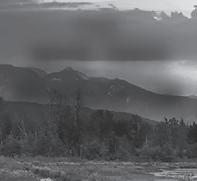

WE ARE
Labourer 2 -Roads and Parks – Regular Full-Time. Recreation Program Leader – Regular Part-Time (4-19 hours)
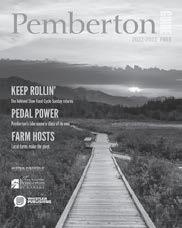
Assistant Chief Operator – Wastewater Treatment – Regular Full-Time Recreation Facility Clerk – Temporary Part-Time (Parental leave)
IT Senior Systems Specialist – Regular Full-Time


Planner 1 - Regular Full-Time Planner 1 - Temporary Full-Time (anticipated end date of October 30, 2023) Planner 1 - Temporary Full-Time (anticipated end date of March 31, 2023)
IT Business Analyst - Regular Full-Time
Utility Operator 1 – Water Distribution – Temporary Full-Time Manager of Procurement – Regular Full-Time Recreation Facility Attendant 2 – Regular Part-Time
IT Systems Specialist – Regular Full-Time
Senior IT Business Analyst – Regular Full-Time (Multiple Positions) Watch Clerk – Regular Full-Time (Multiple Positions) Financial Services Specialist – Temporary Full-Time Truck Driver Class 1 – Regular Full-Time Utilities Technician – Regular Full-Time Custodians – Casual/ On Call
squamish.ca/careers


50 OCTOBER 20, 2022 classifieds. piquenewsmagazine.com Book your classified ad online by 3pm Tuesday
HIRING
For more information, please search our Encore Job Opportunities page at the below link. https://jobs.encoreglobal.com/search-jobs/Whistler JOIN OUR TEAM! Encore is currently hiring the following positions for Whistler! Event Audio Visual Technician Part and Full Time Sales Coordinator Production Manager We also offer amazing health benefits! Come Grow Sport with us at our Whistler Olympic Legacy Venues We offer competitive wages, a unique environment, seasonal bonuses, staff discounts and benefits. Ask about accommodation. Whistler Sliding Centre (Bobsleigh, Luge & Skeleton) First Aid Attendant Refrigeration Operator Assistant Chief Engineer Whistler Olympic Park (Nordic Skiing, Snowshoeing, & Outdoor Activities) Nordic Sport Instructor Snow Clearing Operator Custodian Visit our website to view current postings and to apply: www.whistlersportlegacies.com/careers EMPLOYMENT OPPORTUNITIES PIQUENEWSMAGAZINE.COM/JOBS THE FIRST PLACE TO LOOK FOR LOCAL JOB OPENINGS AN OFFICIAL PUBLICATION OF THE 2022-2023 PEMBERTON GUIDE on stands now!
OPPORTUNITIES
requires:
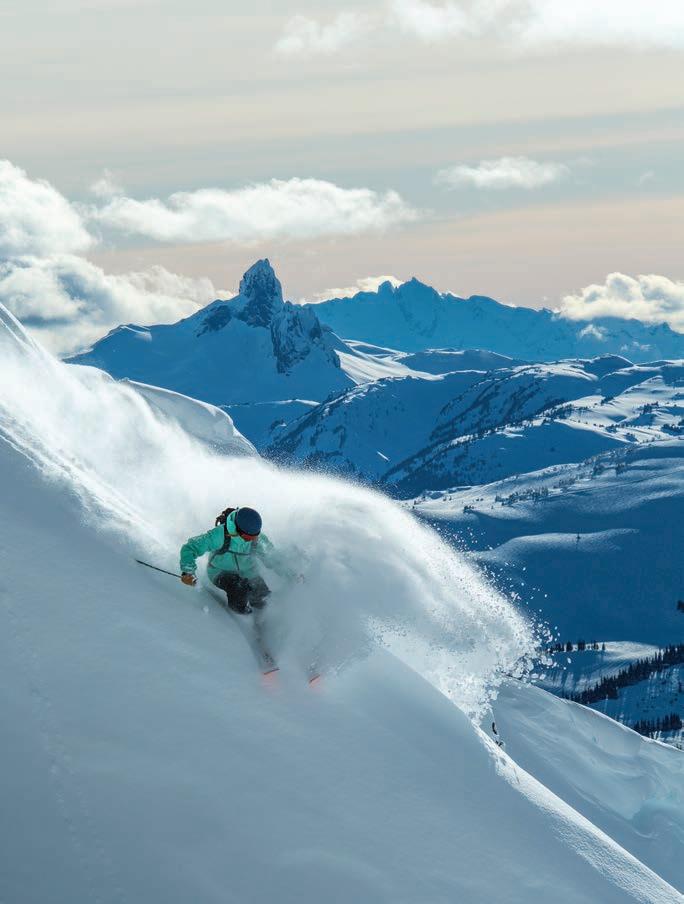
who has
able to work

is a
WIFI


can
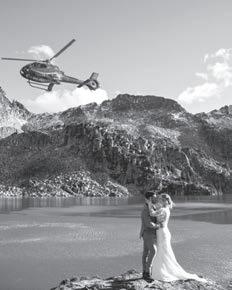
and can
is


OCTOBER 20, 2022 51 classifieds.piquenewsmagazine.com BUY RENT WORK FIX DRIVE SELL S C A N QR CODE TO GET INFO & TO APPLY CERTIFIED SKI INSTRUCTORS $21-$27+ PER HOUR • WAGE BASED ON EXPERIENCE *NEW* 40% RETAIL DISCOUNTS • SKI PASS TUNING AND F&B DISCOUNTS ONGOING PROFESSIONAL DEVELOPMENT DISCOUNT ON DAILY LESSONS • FUN WORK EVENTS WE OFFER JOB DETAILS WORK FT, PT OR PT-HOLIDAY TEACHING ALL AGES INCLUDING KIDS PT: MINIMUM 1 X SAT/SUN A WEEK PT-HOLIDAY: MINIMUM 17 TEACHING DAYS OVER HOLIDAYS AND WEEKENDS
Front Desk Staff $22/hour F/T & P/T hours available Must be available Friday, Saturday & Sundays Duties include pre arrival & post departure check of vacation rental units Some duties include: providing resort information & directions, providing information about the lodge, changing light bulbs, troubleshooting
and Cable, unloading the occasional dishwasher. We are looking for someone
attention to detail, is
independently,
communicate clearly,
problem-solver,
willing to use a computer
self lead completing daily tasks. Please send resumes to: info@acervacations.com Roland’s Pub & Red Door Bistro are looking for dishwashers. Full time or part time night shifts available. Starting at $20/hour plus tips and a staff meal every shift. Staff discounts in the Pub & Bistro. Extended Medical & Dental for full time staff. Ski pass financing available. Apply in person with resume or email to info@rolandswhistler.com EMPLOYMENT
PIQUENEWSMAGAZINE.COM/JOBS THE FIRST PLACE TO LOOK FOR LOCAL JOB OPENINGS Whistler’s only dedicated wedding magazine. AVAILABLE ON STANDS IN THE SEA TO SKY The ultimate guide to Sea to Sky weddings 2022
Open


many more opportunities
affordable shared staff housing both on-site
Health and Dental Benefits for permanent roles






Winter Ski Pass (with 6 month contract commitment)



Comp & Discounted nights at Four Seasons worldwide for permanent roles

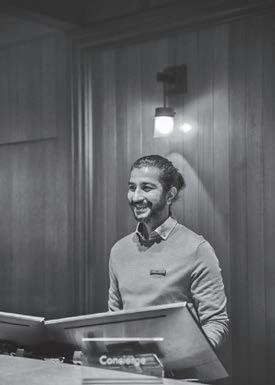
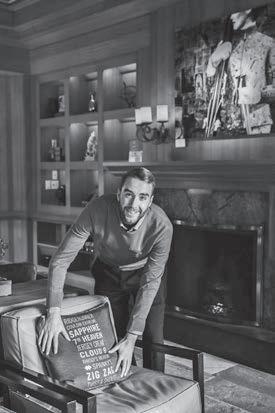



Complimentary meals per shift in our employee dining room
Excellent training and development opportunities
theme recognition days and events - EOM,



Service Celebrations, Birthday Events, etc;
help set us

approach and industry-leading




52 OCTOBER 20, 2022 classifieds. piquenewsmagazine.com Book your classified ad online by 3pm Tuesday NESTERS MARKET & WELLNESS CENTRE NOW HIRING Deli, Bakery, Produce, Grocery and Meat Clerks Cashiers Full or Part Time E-mail or drop in your resume to: bruce_stewart@nestersmarket.com please cc ian_fairweather@nestersmarket.com or call us at 604-932-3545 PERKS • Competitive wage – Depending on experience • Access to medical and dental benefits for full time applicants • Percentage discount from store bought goods • Flexible and set schedule • Staff Housing available VALLEA LUMINA A/V SPECIALIST SALES MANAGER SNOWMOBILE GUIDE SUPERFLY ZIPLINE GUIDE SNOWSHOE GUIDE VALLEA LUMINA GUIDE GUEST SERVICE AGENT CLASS 2 AND CLASS 4 DRIVERS TECHNICAL & SAFETY SPECIALIST TECHNICAL MAINTENANCE ASSISTANT Competitive wage, full time year-round position, welness and health benefits, flexible schedule, free activities, friends and family discounts. Join our team! http://jobs.fourseasons.com APPLY NOW! P&C.whistler@fourseasons.com Benefits: Open Positions: Security Officer Laundry Attendant Bell Attendant Shift Engineer Steward Night Cleaner Core Agent Guest Room Attendant Culinary Roles & many more opportunities Competitive Wages Access to affordable shared staff housing both on-site and off-site Extended Health and Dental Benefits for permanent roles Winter Ski Pass (with 6 month contract commitment) Comp & Discounted nights at Four Seasons worldwide for permanent roles Complimentary meals per shift in our employee dining room Excellent training and development opportunities Employee theme recognition days and events - EOM, Years of Service Celebrations, Birthday Events, etc;
Positions: • Security Officer • Laundry Attendant • Bell Attendant • Shift Engineer • Steward • Night Cleaner • Core Agent • Guest Room Attendant • Culinary Roles &
Benefits: • Competitive Wages • Access to
and off-site • Extended
•
•
•
•
• Employee
Years of
Vacasa’s forward-thinking
technology
apart as the largest full-service vacation rental company in North America. We are seeking individuals with a passion for providing exceptional vacation experiences for our Owners and Guests. We offer competitive wages and benefits: Travel allowance for Squamish/Pemberton-based employees OR Ski Pass/Activity allowance, Extended Medical, RRSP match, Recognition Program, Fun & Safe Work Environment-Great Team, opportunities to grow and more. Apply online today! https://www.vacasa.com/careers/positions or email: paul.globisch@vacasa.com or call to find out more details at 604-698-0520 We thank all applicants for their interest but only those selected for an interview will be contacted. **SIGNING BONUS** $1000 (FT) Housekeeper - Full or Part time Housekeeper Runner - Full or Part time Guest Service Agent - Full or Part time (year-round) Night Audit - Full or Part Time (year around) EMPLOYMENT OPPORTUNITIES PIQUENEWSMAGAZINE.COM/JOBS THE FIRST PLACE TO LOOK FOR LOCAL JOB OPENINGS Glacier Media Digital experts help businesses succeed online. Contact your Sales representative at Pique Newsmagazine today for a free digital audit 604-938-0202 sales@piquenewsmagazine.com Get noticed! • Social • Google • Websites • Programmatic • SEO/SEM • Sponsored content
Sales
At the Liquor Distribution Branch (LDB) our vision of ‘Service. Relationships. Results.’ is all about providing a valued service, building strong relationships with our stakeholders, and achieving greater results for the province.
The LDB is one of two branches of government responsible for the cannabis and liquor industry of B.C. We operate the wholesale distribution of beverage alcohol within the province, as well as the household retail brand of BC Liquor Stores.
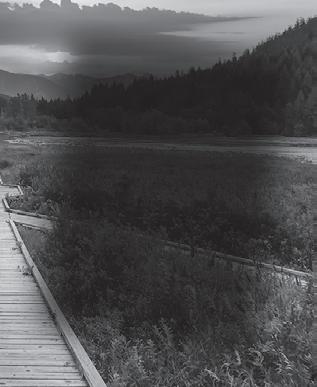
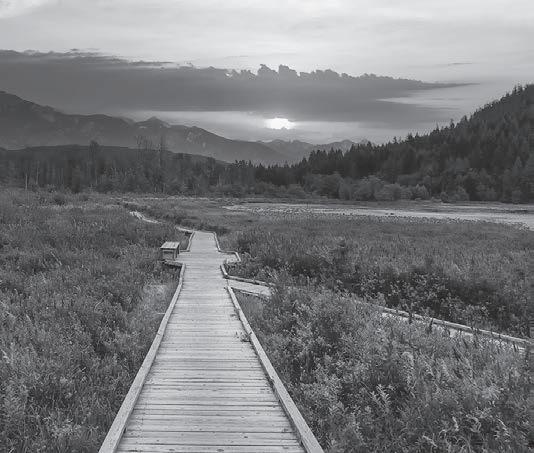
We employ nearly 5,000 people in over 200 communities and have been named one of BC’s Top Employers 14 times over for offering exceptional places to work rooted in values of fairness and respect, work-life balance, and inclusion and diversity. We believe that our people are our greatest asset. Being a reputable employer with programs of skills training and professional development are what attract candidates to BC Liquor Stores, while our progressive, forward-thinking culture is why employees with a growth mindset thrive.
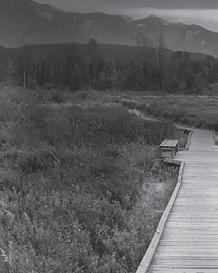
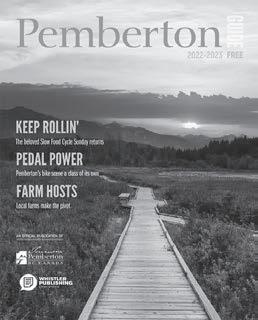

Auxiliary positions are on-call, meaning hours of work are not guaranteed and subject to availability. Some auxiliary employees may not initially work a full 35-hour week, but with more hours worked and more seniority gained, more opportunities for more hours of work will follow.
Auxiliary positions are not permanent full-time but can lead to permanent full-time opportunities with a very competitive total compensation package, including a comprehensive pension plan, medical and dental coverage (including massage and physiotherapy), tuition reimbursement and scholarship programs, and access to public service employee benefits including career support services, financial and legal services, and employee and family counselling.
We are dedicated to the highest quality of customer service, delivered with friendliness, individual pride, initiative, and retail passion! If you fit this description and you are prepared to work in a fast-paced environment, we encourage you to apply to become a part of the Whistler area BC Liquor Stores.
To be eligible, applicants must meet the following qualification requirements:
• Be at least 19 years of age
• Be able to legally work in Canada
• Be able to provide excellent customer service
• Be able to communicate effectively and professionally with the public
• Be able to demonstrate aptitude for cashier and related duties, including calculations

• Be able to perform physically demanding work, including lifting 20-25 kg boxes
• Have a valid Serving It Right Certificate™
• A Criminal Record Check is required.
BC Liquor Store Sales Associates may be required to operate a variety of mechanical and hand-operated equipment, in addition to handling large volumes of bottles as part of the LDB’s recycling program.

Rates of Pay as of April 11, 2021: Auxiliary Sales Associate - $19.45 per hour
Seasonal Sales Associate - $18.08 per hour
For exciting and challenging retail opportunities, please apply online at: http://bcliquorstores.prevueaps.ca/pages/openings/ Or apply in person at: Whistler Marketplace 101-4360 Lorimer Rd, Whistler
On November 1, 2021 the BC Public Service announced the COVID-19 Vaccination Policy that defines the conditions and expectations for BC Public Service employees regarding vaccination against COVID-19. Among other possible measures, proof of vaccination will be required. It is a term of acceptance of employment that you agree to comply with all vaccination requirements that apply to the public service. More information can be found here: https://www2.gov.bc.ca/gov/content/careers-myhr/all-employees/safety-healthwell-being/health/covid-19/covid-19-vaccination-policy-for-bc-public-service-employees

OCTOBER 20, 2022 53 classifieds.piquenewsmagazine.com BUY RENT WORK FIX DRIVE SELL
Associates Positions Available!HERE Grow. Contribute. Explore. Apply online on: https://ziptrekeco.bamboohr.com/jobs/ Full-Time Zipline Tour Guides Get paid to Zipline! Training starts Monday November 28th. Ski pass provided. Starting wage of $20/hour Extended benefits Ziptrek Ecotours is now hiring: EMPLOYMENT OPPORTUNITIES PIQUENEWSMAGAZINE.COM/JOBS THE FIRST PLACE TO LOOK FOR LOCAL JOB OPENINGS AN OFFICIAL PUBLICATION OF THE 2022-2023 PEMBERTON GUIDE on stands now!
EMPLOYMENT OPPORTUNITIES
The Sea to Sky corridor’s top civil construction company.
are currently recruiting professionally minded
to
Required:
(after
send resume
The Sea to Sky corridor’s top civil construction company.
Equipment Operators
Drivers
Layers
Labourers
(after
of Whistler Employment Opportunities



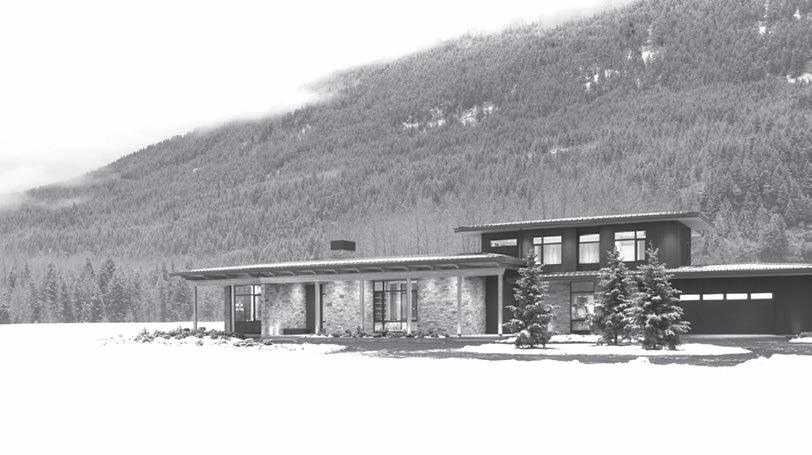
Resort
Opportunities
Opportunities
54 OCTOBER 20, 2022 classifieds. piquenewsmagazine.com Book your classified ad online by 3pm Tuesday Apply to: jobs@pembertonvalleylodge.com Employment Opportunities: Night Audit – Part Time or Full Time Flexible Hours, Health Benefits, Casual Environment $1000 SIGNING BONUS BENEFITS, FULL TIME WORK ARE YOU LOOKING FOR A NEW CAREER IN CONSTRUCTION? WANT TO COME AND WORK FOR A GREAT TEAM WITH LOTS OF ROOM FOR CAREER GROWTH? APPLY TO CONNECT@TMBUILDERS.CA We’re Hiring! Labourers, Carpenters, Foreman, Project Managers NOW HIRING! Our Team enjoys: ü Awesome colleagues ü Flexible schedules ü Training and experience ü Substantial Employee Discount Card & Benefits ü Prime location in Pemberton ü Short commute = less time, more $$$ • FT Front End Supervisor • FT/ PT Grocery • FT Assistant Meat Manager • FT Deli Supervisor Download or fill out our online application at https://www.pembertonsupermarket.com/ about/employment/ or stop by the store and we will give you an application to fill out. You can also email us at jobs@pembertonsupermarket.com or call us at 604-894-3663. Resort Municipality of Whistler whistler.ca/careers Resort Municipality of Whistler Employment
· Lifeguard/Swim Instructor · Skate Host · Wastewater Treatment Plant Process Supervisor · Labourer I – Village Maintenance · Youth and Public Services Specialist · Utilities Group Manager · Accounting Clerk · Labourer I - Lost Lake Nordic Trail Crew/Patrol · Planning Analyst · Lifeguard/Swim Instructor Resort Municipality of Whistler whistler.ca/careers Resort Municipality of Whistler Employment
· Lifeguard/Swim Instructor · Skate Host · Wastewater Treatment Plant Process Supervisor · Labourer I – Village Maintenance · Youth and Public Services Specialist · Utilities Group Manager · Accounting Clerk · Labourer I - Lost Lake Nordic Trail Crew/Patrol · Planning Analyst · Lifeguard/Swim Instructor Resort Municipality of Whistler whistler.ca/careers
Municipality
· Lifeguard/Swim Instructor · Skate Host · Wastewater Treatment Plant Process Supervisor · Labourer I – Village Maintenance · Youth and Public Services Specialist · Utilities Group Manager · Accounting Clerk · Labourer I - Lost Lake Nordic Trail Crew/Patrol · Planning Analyst · Lifeguard/Swim Instructor · Equipment Operator II - Snow Clearing · Garage Assistant · IT Support Supervisor · Lifeguard/Swim Instructor · Program Leader - Myrtle Philip Community Centre · Recreation Cashier - Whistler Olympic Plaza Ice Rink · Skate Host - Whistler Olympic Plaza Ice Rink · Wastewater Operator 3 · Youth Leader www.whistlerexcavations.com
We are currently recruiting professionally minded people to join our team:
Class 1 Truck
Pipe
Construction
*Competitive wages, extended health benefits
3 months) Email resume to: info@whistlerexcavations.com www.whistlerexcavations.com
We
people
join our team.
Heavy Duty Red Seal Technician or Apprentice Heavy Duty Technician *Competitive wages, extended health benefits
3 months) Please
to: Email: info@whistlerexcavations.com
PIQUENEWSMAGAZINE.COM/JOBS THE FIRST PLACE TO LOOK FOR LOCAL JOB OPENINGS
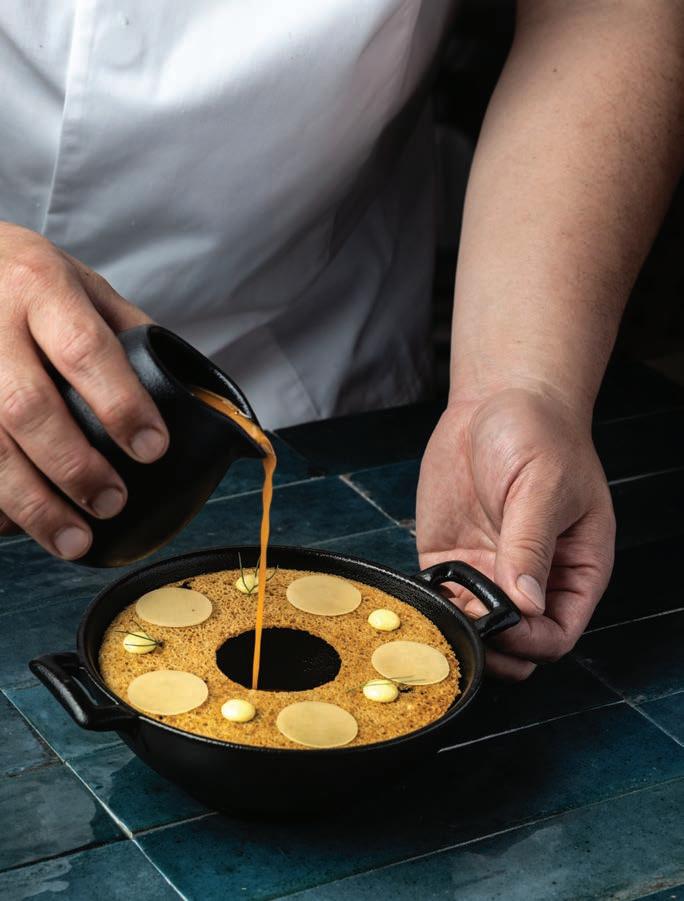





OCTOBER 20, 2022 55 classifieds.piquenewsmagazine.com BUY RENT WORK FIX DRIVE SELL WORK WITH US "Whistler's Hottest New Restaurant"Vancouver Magazine OPEN FOH POSITIONS FINE DINING SERVERS COCKTAIL BARTENDERS BAR BACK I SERVER ASSISTANT ASST. BAR MANAGER ASST. RESERVATIONS MANAGER OPEN BOH POSITIONS EXECUTIVE PASTRY CHEF LINE COOKS PASTRY COOKS PREP CHEFS KITCHEN STEWARDS STAFF ACCOMMODATION COMPETITIVE WAGES + GRATUITIES EXTENDED MEDICAL + DENTAL BENEFITS UNPARALLELED STAFF AMENITIES WE OFFER: WORK WITH ONE OF CANADA'S TOP CHEFS AND MENTORS, ALEX CHEN, IN A KITCHEN ENVIRONMENT STRIVING FOR GROWTH, EDUCATION AND RESPECT. w: wildbluerestaurant.com/careers e: careers@wildbluerestaurant.com WE ARE HIRING: Foremen, Carpenters, Labourers, Apprentices Please contact Marc@balmoralconstruction.com (20cm rule applies) Pemberton - WedgeWoods - Whistler 2 X ALL YEAR ROUND MAINTENANCE ASSOCIATE AND WINTER LEAD 2 X WINTER SNOW REMOVAL LEAD - Manual 9 X SNOW REMOVAL TEAM MEMBERS $22 to $28 Wage, Dependent on Experience Performance-based Salary Increase • Vacation Pay $600 Lifestyle Bonus Interested? Email Resume to: snowburstwhistler@gmail.com Property Maintenance and Services Ltd. is looking for: (604) 932-3677 whistlerdental.com/careers liz@whistlerdental.com APPLY TODAY: Registered Dental Hygienist Certified Dental Assistant Amazing opportunities available: LOVE WHERE YOU WORK! JOIN OUR TEAM OF DEDICATED PROFESSIONALS Competitive Wages | Hiring Bonus | Relocation Bonus Salary Available | Contractors Welcome EMPLOYMENT OPPORTUNITIES PIQUENEWSMAGAZINE.COM/JOBS THE FIRST PLACE TO LOOK FOR LOCAL JOB OPENINGS
CLEANING

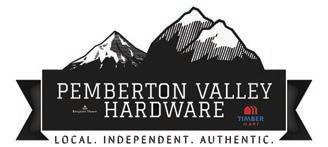














CALL THE EXPERTS Want to advertise your service on this page? Call Pique at (604) 938-0202, or email sales@piquenewsmagazine.com 56 OCTOBER 20 , 2022 Tel:604-935-2101 Email:windowcov@shaw.ca www.whistlerwindowcoverings.ca CustomBlinds • Shades • Draperies Connie Griffiths SUNCRESTWINDOWCOVERINGS •BLINDS •SHADES •SHUTTERS •DRAPERY CustomWindow Treatments Contact ustodayfora freequote or consultation info@suncrestwindowcoverings.com604.698.8406 •Carpets •Upholstery • Tiles •CarInteriors •Furnace •Airducts •Dryervents BL AC K BE AR CARPET CL EA NIN G LTD. 100% ECO FR IEND LY CE RTI FI ED www.blackbearcarpetcleaning.ca• 604 6986610 www.summersnow.ca Summer Snow Finishings Limited WIND OW COVERINGS Whistler’s Source forBlinds since1989 David Weldon david@summersnow.ca 604-938-3521 •Wood blinds •Sunscreens •Shades •Motorization DOUGBUSHSURVEYSERVICES LTD DOUGLASJBUSH AScT,RSIS p: 604-932-3314 c: 604-935-9515 Engineering & construction layout Topographic & site improvementsurveys Municipal, volumetric & hydrographic surveys GPS global positioning systems www.dbss.ca // dougb@dbss.ca No job too big or too small. From multi-million dollar homes, to basement suites and kitchen backsplash. Contact Peter Groves P - 604 729 2543 E petergroves711@hotmail.com riverstonetiles.com Riverstone Tile BLACKCOMBCHIMNEY PATROL LTD. ServingWhistlersince1986 Specializedincleaning Chimneys, Furnace&Airducts, Dryer vents. 604.932.1388/1.877.932.5775 blackcombchimney@yahoo.ca CHIMNEY FORALL YOURHOUSEHOLD &COMMERCIALNEEDS GENERALMAINTENANCE ROBPIDGEON •604-932-7707 •Bonded &Insured www.birdhouseservices.com finduson •Carpentr y• Tiling •DrywallRepairs •TextureFinishing • Renovations •Installation•Painting •Plumbing •SnowRemoval• ApplianceRepairs AskUsAbout •MineSweeping YourHome BirdhouseServices@gmail.com HOME SERVICES AUTOGLASSSPECIALISTS mountainglass.ca|info@mountainglass.ca 604-932-7288 FramelessShower Enclosures Complete Window/Door Packages Custom RailingGlass Systems Fogged/Failed Window Replacements THE CO MPLETEGLASS CEN T RE GLASS Coast Mountain Cleaning •Fullservicecleaning• Residential &Commercial •Carpet &UpholsteryCleaning •PropertyMaintenance •Established 2011 We follow allVCH,Min of Health andWHOCovid19protocols Insured &Bondable •Criminalbackgroundchecksonallstaff 604-966-1437 coastmountaincleaning@gmail.com We use teatreeoilbased cleaningproducts. CLEANING CARPET
SURVEYING TILING Residential/Commercial HeatPumps Boilers-Furnaces-Chillers DesignBuild Callus today!778-994-3159 www.westerntechnical.net WesternTechnical System Inc HVAC/R HEATING AND COOLING Offering unparalleled products and services to our community since 1964 Let one of our qualified paint consultants help brighten your life with new selections of Benjamin Moore coatings. 604 894 6240 | 7426 Prospect Street PAINT BLINDS ETC. BLINDS ETC.ACCOUNTING BLINDS ETC. WANT TO ADVERTISE your service here? Call Pique at (604) 938-0202 , or email sales@piquenewsmagazine.com AFFORDABLE BOOKKEEPING & PAYROLL SERVICES • Payroll Processing • Bookkeeping Clean Up • Catch Up Work • Government Requirements whistlervalleybusiness.com • contact@valley-business.ca 604-938-8095
lazuli
of eclipse
Take care of (2 wds.)
Robin’s beak
Harper --
Steakhouse orders
ower

furniture


or marathon
cautiously

for one
working
DOWN
Warren Buffett’s
part

Montreal team
Taught the dog
brand

Above, to Tennyson
Smell -- --
Roomy vehicles
Bird dogs
Muzzles

Curved lines
Undercover org.
Appall

Walking (2 wds.)
Get steamed up
Acapulco article
Give spiritual
Vittles
Cairo’s river
Untold centuries
Mallard cousins
writer -- Nash
Take a sip
up
Pointed
OCTOBER 20, 2022 57 ACROSS 1 Plain to see 6 Fertile soils 11 Tortilla snack 16 Oil and kerosene 21 Kitchen appliance 22 Chilling 23 Constellation 24 Exaggerated 25 Humane org. 26 Research funds 27 Muf er 28 Bangor locale 29 Catching a sh 31 Championships 33 Bounder 35 Suet 36 Fiery felon 38 Peace signs 39 “The --, the Witch and the Wardrobe” 40 Pita treat 41 Bird’s beak 42 Proclaim noisily 44 More clever 46 Carried 49 Invents a word 50 Slick 51 Snafu (hyph.) 55 Mild rejoinder 56 Hollow stems 57 Unbecoming 58 Mechanical game 59 Blurbs 60 Toady’s answers 61 Oak or sycamore 62 Bunion sites 63 Eland cousin 64 Allow 65 Pamplona shouts 66 Oil job 67 Nudge forward 68 Protein source 69 Crept 71 VHS predecessor 72 Donkey pin-on 73 Weightlifter’s pride 74 Spider’s trap 75 Winning with ease 77 Dolphin habitat 78 Matterhorn echo 81 Cloudburst 82 Na+ and Cl83 Most gung-ho 87 Farm animals 88 Newborn 89 Depot info 90 German city 91 Scare word 92 Each and every 93 Tavern inventory 94 Figure-skating jump 95 Thigh muscles, in the gym 96 Sprout 97 An eye for an eye 99 Kimono closers 100 Goes sour 101 “Stormy Weather” singer 102 Two-speaker system 103 Settled 104 Wails 105 Rice eld 106 French carmaker 108 Imported cheese 109 Spend money 110 Order around 113 Bygone Peruvian 114 Movie 115 Mini-guitars 120 Decay 121 Diatribe 122 Kind of envelope 124 Set up for use 125 Lapis
color 127 Relieved 129 Central 131 Posh hotel lobbies 132 Trial jurisdiction 133 Hermit 134 Javelin
135 Toy bear 136 Moved
137 Boa,
138 Stops
139 Curvy letters
1
headquarters 2 Cap
3 Old
4 Guessed 5
6 Pantyhose
7
8
9
10
11
12
13
14
15
16
17
18
instruction 19 Type
20
30
32 Writer
34 Whole 37
(hyph.) 39 Bell-shaped
40
43 Fibs 44
45
46
47 Limerick
48
49 Sized
50
arch 52 Light beer 53 Radius companions 54 Distant planet 56 Media star 57 City dwellers 58 Where to do laps 60 Rube 61 Ballerina’s attire 62 Math subj. 66 Ponce de -67 Reviews harshly 68 Ghostly noise 70 Blows away 71 Crusty cheese 72 Sardine holders 73 High-school kids 75 Can openers 76 Ember 77 Mails, maybe 78 Trips around the sun 79 Young screecher 80 Dig into the les 81 Go postal 83 Zen riddles 84 Receded 85 Logical 86 In these times 88 Waxy ower 89 Off-ramp 90 Bedroom
93 Patella site 94 Somewhat (2 wds.) 95 -- pro quo 98 Makes a mistake 99 Earthen jar 100 Soul mate (2 wds.) 101 Baby shower gifts 103 Put on the block 104 Evergreen 105 Throb 107 Historical records 108 -- and tonic 109 Sweet roll 110 Courageous 111 Percolated 112 Smarted 114 Core group 116 Plaid items 117 Shortenings 118 Leave out 119 Wows with wit 121 Sax mouthpiece 122 Overly submissive 123 Winning serves 126 Wish undone 128 Evidence, maybe 130 Aardvark prey PUZZLES LAST WEEKS’ ANSWERS Solution, tips and computer program at www.sudoku.com ANSWERS ON PAGE 48 Enter a digit from 1 through 9 in each cell, in such a way that: • Each horizontal row contains each digit exactly once • Each vertical column contains each digit exactly once • Each 3x3 box contains each digit exactly once Solving a sudoku puzzle does not require any mathematics; simple logic suf ces. LEVEL OF DIFFICULTY: VERY EASY V.EASY#14 635 7248 52831 12964 78 79253 54378 6195 349 V.EASY#16 54192 2936 3764 795 1784 623 4267 9381 82574
The suspense is killing me
I’M AT the bottom of the Grand Canyon, floating along the Colorado River. I have no idea how the election turned out. It’s driving me crazy. Congratulations to whomever won.

Since I can’t say anything about the outcome, I’ll write about something I know about. Unusual, you say?
One of life’s great pleasures is food. Eating some alone or with friends or simply flinging it around a crowded cafeteria, food has a special place in all our lives; if it didn’t, we’d do something else three times a day and restaurants would probably all be T-shirt stores.
Personally, I’m down with food. Not being an organized religion kind of guy, my relationship to it may well be spiritual…
BY G.D. MAXWELL
How would I know? Without food, I’d probably need another job or a few new hobbies. Not that I have what you’d call a live-to-eat relationship; more an eat-to-live one, but monogamous and all-consuming, if you know what I mean.
It was not always thus.
My first insight into this relationship came, as so many did, in university. Having moved off campus, ostensibly to embrace a greater degree of both freedom and responsibility—but really just to party our heads off—one of the first responsibilities I embraced was feeding myself. It turned out to be a responsibility I was sorely unprepared for, something that came as a shock to me considering I’d been eating for something like 19 years. This utter lack of preparation was driven home when I and my longtime friend and housemate turned to each other and simultaneously said, “So, whaddya know how to cook?”
The answer was a joint and pathetic, “Not much.” Dinner that night was canned chili over spaghetti. Filling, but somehow lacking in culinary nuance, its shortcomings were no impediment to it becoming our signature dish. We both considered it a culinary watershed when one of us thought to shake Kraft parmesan-like sawdust over it. “Wow! Now if we only knew how to make salad,” I exclaimed between enthusiastic mouthfuls.
That’s when I decided I’d better learn how to cook. My friend had shown no inclination to do so and from all outward appearances seemed to be capable of actually living off cheap beer and Screaming Yellow Zonkers. “How hard can it be?” I said, drawing strength from the sum total of my cooking experience, which pretty much amounted to having spent years not paying attention while my mother made countless meals.
The third time the fire department showed up—at the frantic urging of a concerned neighbour who thought I’d set the kitchen aflame—they invited me
down to the firehall for a cooking lesson. Or so they said. I’d just like to take this opportunity to say that for all their seeming benevolence, firemen can be really sadistic, sloppy cooks when they have someone not from their ranks they plan to stick with doing the dishes. Ironically, in an addinginsult-to-injury way, they taught me how to cook, you guessed it, chili. They also offered to have me back when they were cooking stew, but I wasn’t that gullible.
While fireman chili didn’t exactly round out my repertoire, it did provide two watershed life lessons. It proved I could start with ingredients, as opposed to warming something out of a can or incinerating a TV dinner, and prepare something edible. It also provided a powerful lesson in

the years. They’ve kept me fed, converted me from a picky eater—sorry for what I put you through, mom—to a not-so-picky eater, and saved me enough money to fund a skibum lifestyle. More importantly, they’ve insulated me from the high-fructose corn syrup that’s apparently in all prepared food available in North America.
I’m both appalled and intrigued at what I find in the inner aisles of supermarkets. Since I don’t do much shopping there, cruising the guts of a modern food store takes on the feeling of an anthropological expedition. The most amazing thing I ever unearthed was at a store in the U.S. in a section called “bread and bread products.”
In what looked like a squat, round ice cream carton, there was half a dozen pre-made
year to treat our tastebuds, assuming they haven’t succumbed to corporate fast food. The only times of the year that even begin to touch autumn for this hedonistic pleasure are winter, spring and summer. With longer darkness to keep us off the bike trails and drive us inside, there’s more time to spend time with friends over burnt offerings and a couple of bottles of fine B.C. wines
While I hope I’ve been enjoying great meals cooked by the guides on this trip, I’m planning a big splurge when I get back. It is probably no coincidence I’ll return to Whistler just as Cornucopia starts getting people ready for the excesses of the holiday season.
It kicks off on Nov. 4 with a murder mystery dinner. I attended the inaugural murder mystery dinner last year. It was a disco-themed (ugh) riot of crazed people trying to solve the mystery and indulge in outstanding courses along the way. The only drawback was I kept getting interrupted while I was trying to savour the courses and drink my wine because I was one of the suspects.
Worse, I hadn’t entirely finished dessert when I discovered I’d actually committed the murder. Talk about suppressed memories!
economics. Using raw onions, ground beef, tomatoes, dry beans and way, way too much chili powder, I could make a week’s worth of chili for about the same price as one large can of the stuff that smelled vaguely like dog food when you opened it. Eating for a week at approximately the cost of eating for a night left more scarce funds for… books… and other par…, er, school supplies.
Both lessons have served me well over
blueberry pancakes. Just pop ‘em in the toaster and dribble artificially-flavoured corn syrup on ‘em and… enjoy? They still pop up occasionally in nightmares.
I can’t imagine being reduced to buying pre-made pancakes. What do those people consider a splurge? Freeze-dried camping food? To what level of atrophy have their tastebuds descended?
Autumn is one of the best times of the
If you eat and drink, or even do just one of those things, there is something that’ll tickle both your fancy and tastebuds during the run of Cornucopia from the 4th to 20th of next month. The conference centre will smell better than it usually does and you’ll likely discover something new and wonderful if you attend any of the events.
Or you can stay home, watch hockey and eat nachos from the microwave. ■
58 OCTOBER 20, 2022
We both considered it a culinary watershed when one of us thought to shake Kraft parmesan-like sawdust over it.
MAXED OUT
GETTY IMAGES
GLOBAL REACH, LOCAL KNOWLEDGE FOLLOW YOUR DREAM, HOME
BENCHLANDS
TWIN LAKES – CREEKSIDE
#16-1200 Alta Lake Road Unit #16 Twin Lakes is the perfect 4 season get away or full time residence that Whistler has to offer. Enjoy the residents only private beach on Alpha Lake in the sizzling summer months where you can swim, float with friends, canoe, paddle board or bask in the sun. $1,249,000
Maggi Thornhill prec* 604-905-8199
24-4644 Blackcomb Way Blackcomb Greens 3 Bedroom Townhouse boasts spectacular golf course & mountain views. Features large picture windows, 2 decks, wood fireplace, underground parking & outdoor hot tub. Fully furnished & zoned for nightly rentals. $2,699,000
Rachel Allen
NEW PRICE
WHISTLER VILLAGE
702 & 704 4050 Whistler Way Hilton Owners enjoy unlimited stays and a central village location offering all the amenities of a resort hotel. This lock-off 2 bed, 2 bathroom, with storage may also be rented nightly though the Hilton full-service, rental management program. $949,000.00


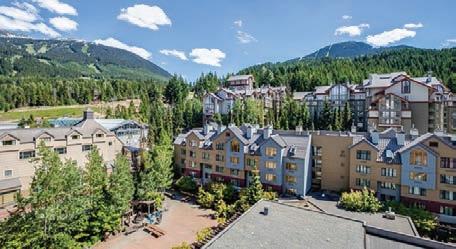
Nick Swinburne prec* 1-604-932-8899
NEW PRICE
BENCHLANDS 401(G2)-4653 Blackcomb Way Beautiful top floor/corner unit with spacious 2 bed, 2 bath layout. Features; heated outdoor pool, hot tub, games room, gym, ski-in access, free area shuttle & much more. Enjoy one week each month!
Kerry Batt’
NEW TO MARKET
BRIO
3283 Arbutus Street Enjoy your private, large, fenced and bright back yard in this spacious 4 bed/3 bath duplex with mountain views. Located at the end of a cul-de-sac and a short walk to the Village, this property offers everything a family could want for their Whistler home. $2,250,000
Allyson Sutton prec* 604-932-7609
PARADISE VALLEY SQUAMISH Paradise Valley Road Escape to your 9-acre waterfront estate in Paradise Valley. Down valley living offers lot size & absolute privacy unavailable in Whistler. Live in the carriage home while building your 5400 sq ft dream home. www. paradisevalleyestate.com $3,185,000
Ken Achenbach 604-966-7640
WHISTLER CAY HEIGHTS
6127-4 Eagle Ridge Crescent If you are looking for the perfect getaway that allows you to walk to every Whistler amenity, then you have found it. This immaculate townhome is steps from Whistler Village. The main floor features a large entry room and a spacious living area that leads out to a sunny deck. $1,685,000
Sam Surowy
CONTRIBUTION AT CLOSING
WHISTLER VILLAGE
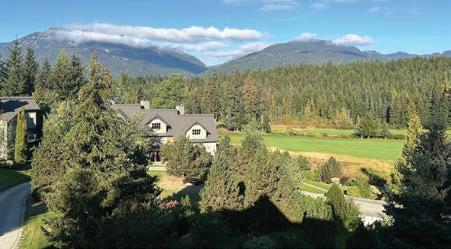
6693 Tapley Place „Serenity“ – A custom-built gem situated on a 2/3 acre of flat lot with a manicured yard. This 5900 sqft house was well designed and built with the best craftmanship and finest quality materials. A true Whistler dream house.$12,880,000.00

Ruby Jiang prec*
Engel & Völkers is a proud champion of Special Olympics. Many of our advisors donate a portion of their commissions to Special Olympics on behalf of their clients. This simple program means that every time we help our clients realize their real estate goals, we are helping a Special Olympian get just a bit closer to theirs.

Whistler Village Shop 36-4314 Main Street · Whistler BC V8E 1A8 · Phone +1 604-932-1875 whistler.evrealestate.com
PEMBERTON MEADOWS
9505 UPPER LILLOOET FOREST SERVICE ROAD
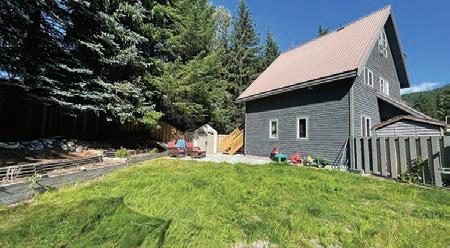
Capturing stunning 360-degree mountain views, this 336acre waterfront property is just 20 minutes from downtown Pemberton. The acreage offers multiple use options and a choice of two prime homesite locations. $4,995,000 Steve Legge prec* 604-902-3335

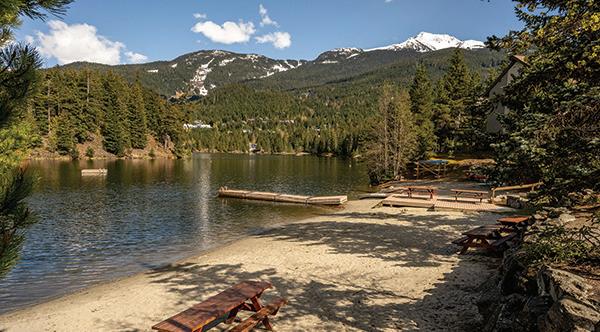
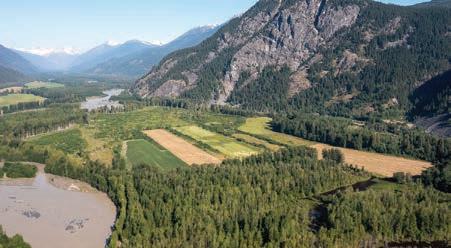
Squamish Station Shop 150-1200 Hunter Place · Squamish BC V8B 0G8 · Phone +1 778-733-0611 squamish.evrealestate.com
Each
*PERSONAL REAL ESTATE CORPORATION
brokerage
independently owned and operated.
Engel & Völkers Whistler
604-966-4200
604-902-9754
$409,000
prec* 604-902-5422
1-778-834-2002 SOLD NEW PRICE




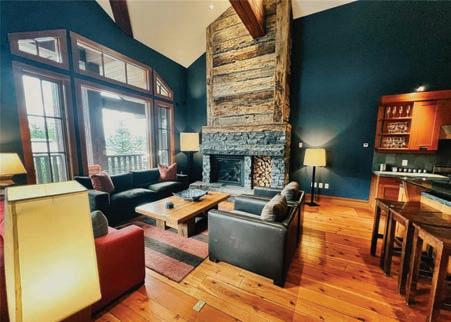

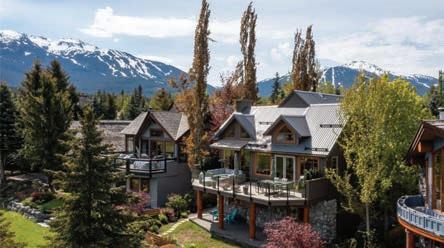




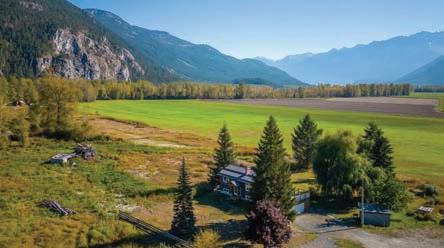
PEMBERTON OFFICE 1411 Portage Road, Pemberton, BC V0N 2L1 604.894.6616 or Toll Free 1.888.689.0070 WHISTLER OFFICE 106 - 7015 Nesters Road, Whistler, BC V8E 0X1 604.932.2300 or Toll Free 1.888.689.0070 *PERSONAL REAL ESTATE CORPORATION remax-whistler.com Property Management remaxseatoskypm.com Dave Sharpe 604.902.2779 Kristi McMillin 778.899.8992 Madison Perry 778.919.7653 #115D - 2020 London Lane $205,000 Welcome to Evolution #115D, a beautifully appointed, fully furnished and equipped 1-bedroom resort home that effortlessly blends contemporary style with a cozy mountain feel. Enjoy gorgeous views of the forest from your deck on the quiet side of the building. Quarter Ownership. 99 - Highway 99 $4,500,000 A very rare, once in a lifetime opportunity to own a legacy estate property within the Resort Municipality of Whistler. This 26.2 acre parcel along the Cheakamus River is for sale for the first time ever. Bring your vision for the future, because this large property is the perfect place for your secluded Whistler dream home. Denise Brown 604.902.2033 Doug Treleaven 604.905.8626 #6 - 4325 Northlands Blvd. $1,159,000 A rare 1 bed, 1 bath 621 sf Sunpath townhome just listed for sale. A 1 bedroom townhome has not been available for more than 4 years. Zoned phase 1 nightly rental, these townhomes have proven to be an excellent property investment. Rent it yourself through AirBNB, hire a Property Manager or keep it for your own personal use. #221 - 4338 Main Street $1,495,000 COURT ORDERED SALE This 2 bedroom 2 bath is in the heart of the village. Just steps from Olympic Plaza, shops, stores and of course Pure bread !! This south facing unit is bathed in Sun year round and has great views of Whistler Mtn . Tyndall stone has its own newly renovated pool and hot tub area for you to enjoy after a hard day of playing in Whistler. #29 - 4857 Painted Cliff Rd. $2,499,000 INVESTOR ALERT! A well managed Super Host Airbnb with a 90% 5 star check in rating for a 3 bedroom 2 bath! This unit is a very well run family business with recent upgrades and renovations. Stove, dishwasher, washer/dryer, TV’s, furnishings and linen. Incredible revenue opportunities are already booked for you for the 2022/23 season. Meg McLean* 604.907.2223 Mike Nauss 604.932.9586 8313 Chalet Drive $3,799,000 Wake up to gorgeous views of Whistler, Blackcomb & Wedge Mountains from your bright, open concept kitchen, living room & large front deck. The 2 sets of french doors & windows welcome natural light accenting the high ceilings, wood burning fireplace & large feature beams. Plenty of space to entertain & cook in this chef’s kitchen. #4J - 2300 Nordic Drive $349,000 At Natures Door is a 2nd to none lifestyle!! This home includes 3 spacious Bedrooms, 3.5 bathrooms, media room, and fully furnished right down to the place mats and towels. Offering its own private hot tub, bbq, as well as being Ski in, Ski out, directly onto the Dave Murray Olympic Run. 1/10th Share. Richard Grenfell 604.902.4260 40889 The Crescent, Squamish $2,999,000 Modern executive home, including a one bedroom suite, backing onto greenspace in Squamish’s University Highlands - you will not find this quality and condition at this price on the North Shore or in Whistler. Live at the heart of Squamish’s world famous mountain bike trail network. Sally Warner* 604.905.6326 8019 Nicklaus North Blvd. $5,950,000 With an absolutely stunning location on the 15th hole of the Nicklaus North golf course, this 5 bedroom and den home features truly spectacular views. Relax in the open plan living dining area with floor to ceiling windows to enjoy the breathtaking views or soak up the sun and the views from one of the 2 beautiful sundecks or from the garden patio. #106 - 3300 Ptarmigan Place $1,799,000 The beautiful floor plan will grab your attention with high vaulted ceilings, in the living room & bedrooms that streams in the natural light. Located by Alpha Lake / Park with tennis courts, beach and children’s play area for your summer fun. Walking distance to Creekside Gondola and all the wonderful amenities Creekside has to offer. Matt Kusiak 604.935.0762 31 1 1 5.5 Sherry Baker* 604.932.1315 #44 - 4388 Northlands Blvd. $1,249,000 With a desirable Whistler Village location, this renovated 1 bedroom townhome places you within walking distance of all the amenities, including the free village shuttle. Whether you are curling up in front of the fireplace for a cozy evening in or hosting dinner for family and friends, the beautifully renovated open concept main floor is a perfect Whistler retreat. 1 536 2 Theresa McCaffrey 604.902.1700 900 Erickson Road $2,650,000 Mid-century modern home with architectural updates. 5 acres in the Pemberton Meadows with unobstructed views from majestic Mt Currie to the Pemberton Icefields. A comfortable living environment with three bed, two bath, storage, and a two-car garage, natural light, views from all rooms, radiant hot water heat, and a wood-burning stove. 3 3D Tour - rem.ax/8313chalet 3D Tour - rem.ax/8019nicklaus 3D Tour - rem.ax/44glaciers Video - rem.ax/900ericksonrd 3D Tour - rem.ax/221tyndall 3D Tour - rem.ax/6sunpath 3D Tour - rem.ax/29fox 3D Tour - rem.ax/115evolution



























































































































































































































































 BY BRANDON BARRETT
BY BRANDON BARRETT










 - JACK CROMPTON
- JACK CROMPTON




 BY MEGAN LALONDE
BY MEGAN LALONDE









































































































 1 20 YEARS OF FUN(GUS) There’s nothing quite like a Fungus Among Us group shot! Members of the Whistler Naturalists and festival attendees show off their finds at the 20th annual Fungus Among Us festival on Saturday, Oct. 15. PHOTO
BY JOERN ROHDE / COURTESY OF THE WHISTLER NATURALISTS 2 WEIRD AND WONDERFUL Winner of the Fantastic Fungi Foto Contest, Weird and Wonderful category. PHOTO BY NICOLE MCHUGH 3 FOREST FINDS Attendees take in the display tables at Legends Hotel in Creekside on Saturday, Oct. 15.
PHOTO BY JOERN ROHDE / COURTESY OF THE WHISTLER NATURALISTS 4 FUNGAL FUN Winner of the Fantastic Fungi Foto Contest, Fungal Fun category.
PHOTO BY JOHANNA ALDRED 5 WALK AND TALK Mushroom guru Thom O’Dell shares some of his knowledge during the Walk with Gurus event on Saturday, Oct. 15. PHOTO BY BRADEN DUPUIS
1 20 YEARS OF FUN(GUS) There’s nothing quite like a Fungus Among Us group shot! Members of the Whistler Naturalists and festival attendees show off their finds at the 20th annual Fungus Among Us festival on Saturday, Oct. 15. PHOTO
BY JOERN ROHDE / COURTESY OF THE WHISTLER NATURALISTS 2 WEIRD AND WONDERFUL Winner of the Fantastic Fungi Foto Contest, Weird and Wonderful category. PHOTO BY NICOLE MCHUGH 3 FOREST FINDS Attendees take in the display tables at Legends Hotel in Creekside on Saturday, Oct. 15.
PHOTO BY JOERN ROHDE / COURTESY OF THE WHISTLER NATURALISTS 4 FUNGAL FUN Winner of the Fantastic Fungi Foto Contest, Fungal Fun category.
PHOTO BY JOHANNA ALDRED 5 WALK AND TALK Mushroom guru Thom O’Dell shares some of his knowledge during the Walk with Gurus event on Saturday, Oct. 15. PHOTO BY BRADEN DUPUIS
























































































































































































































































































































































































































































































































































































